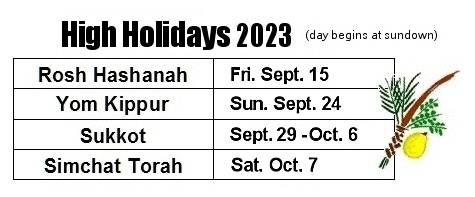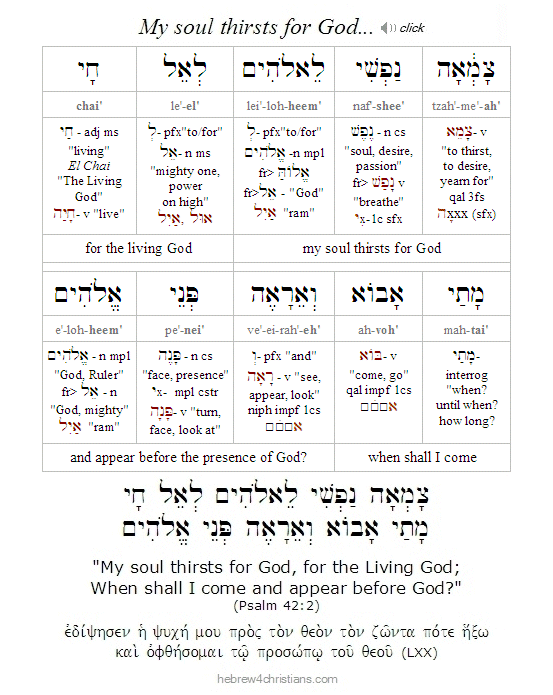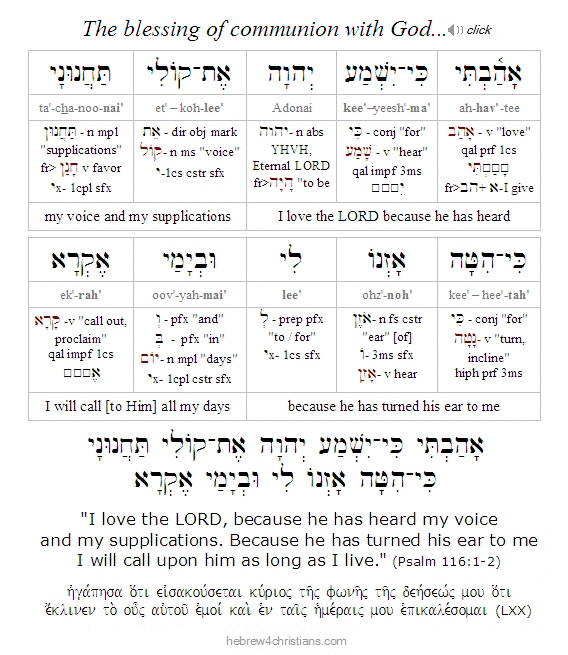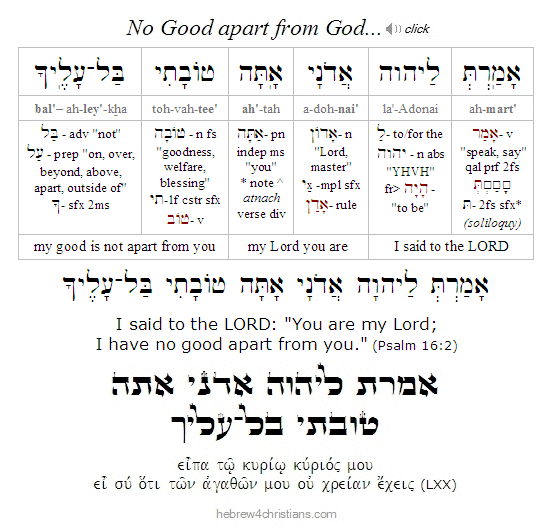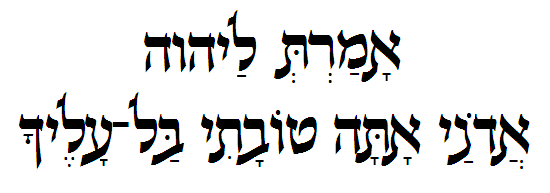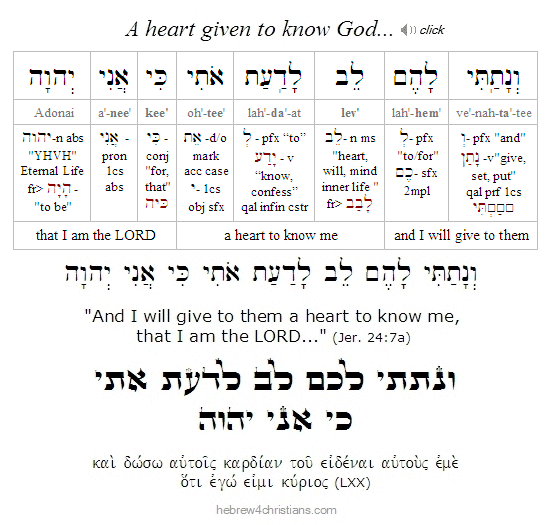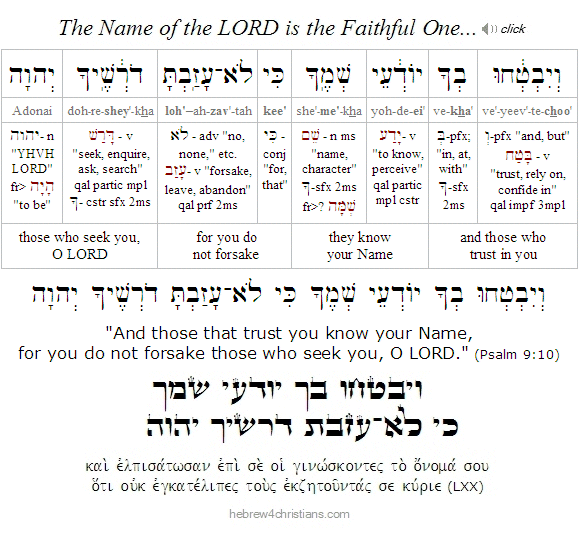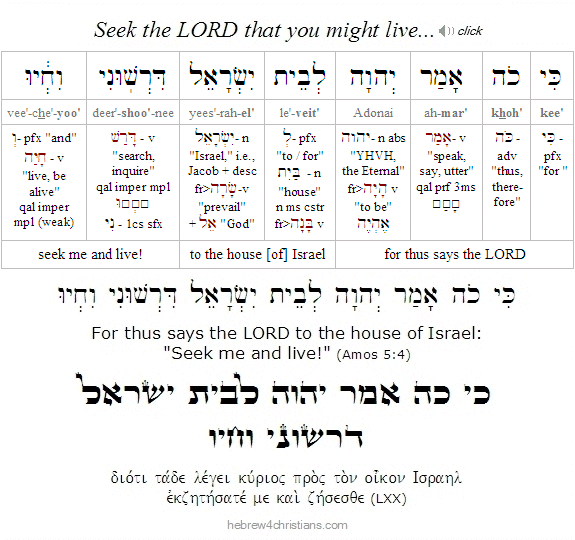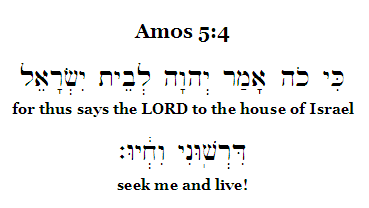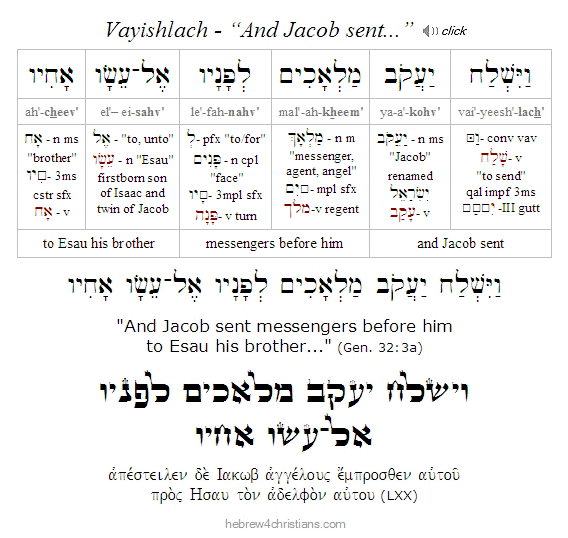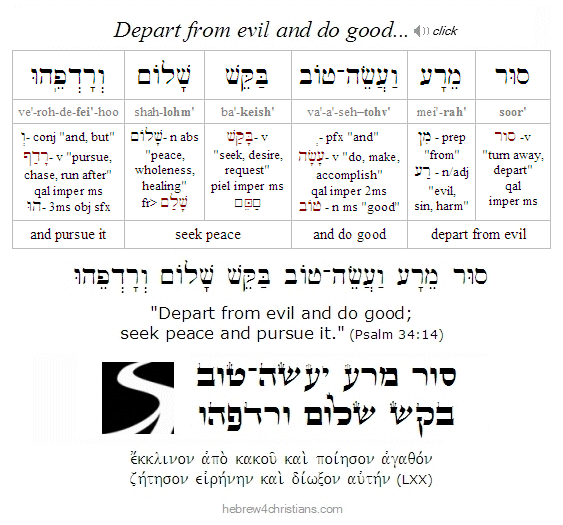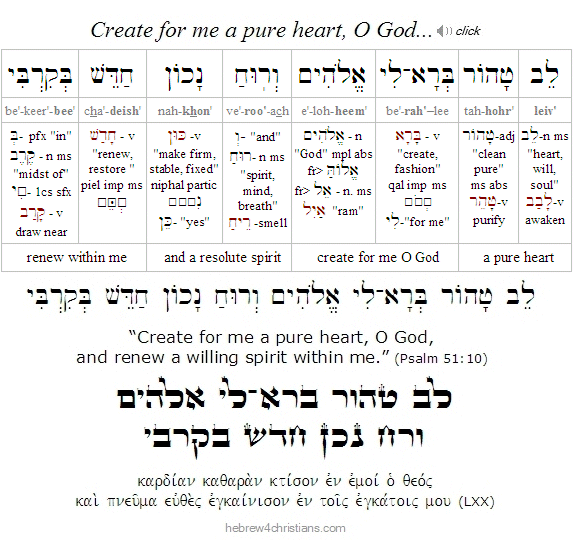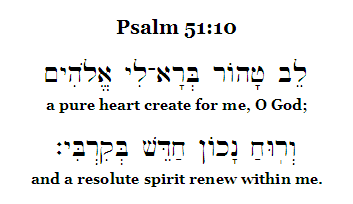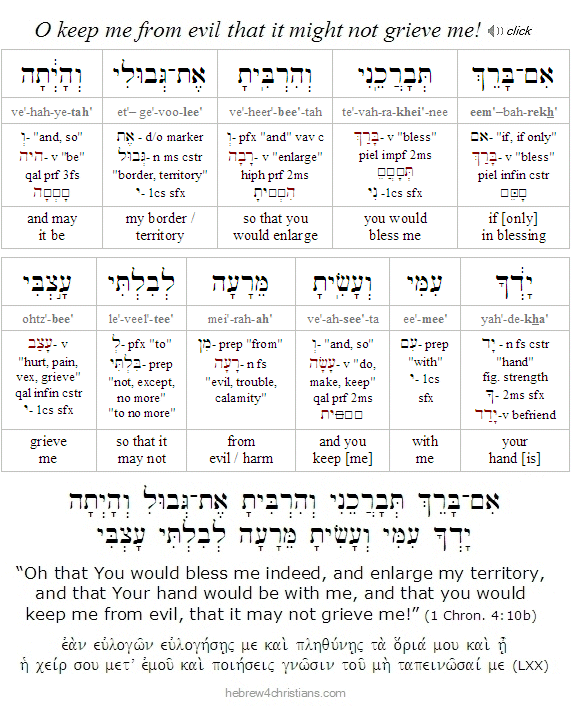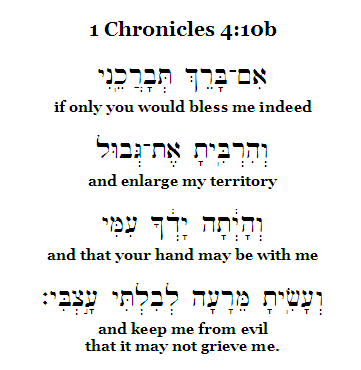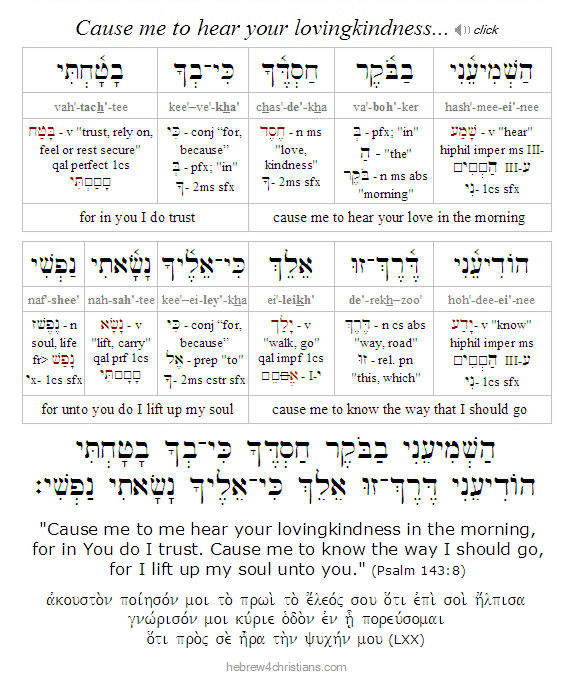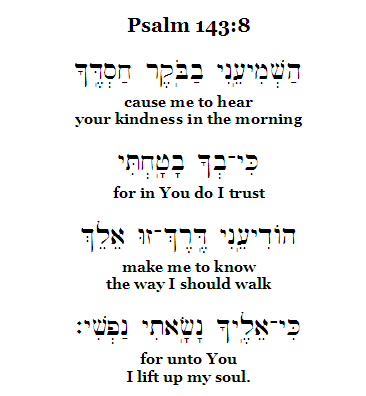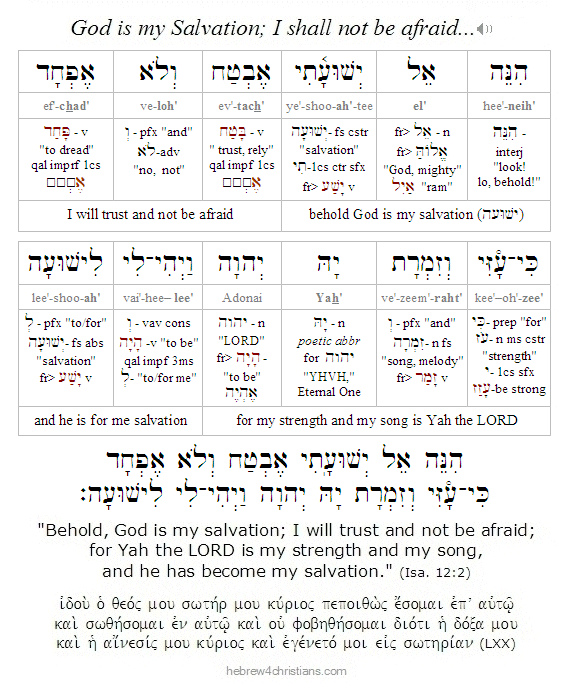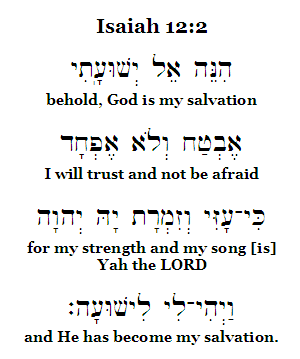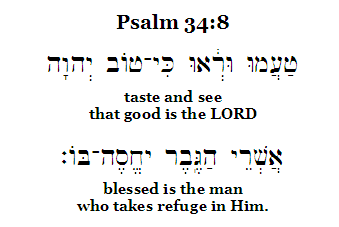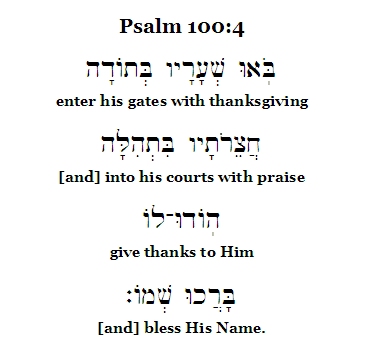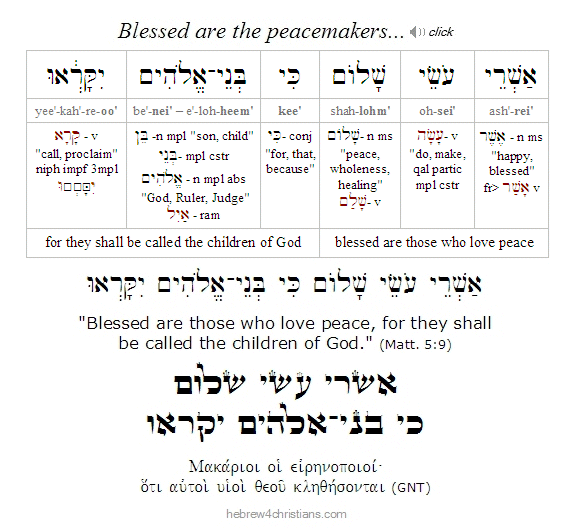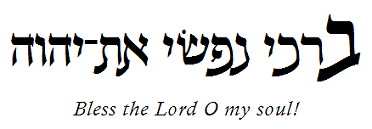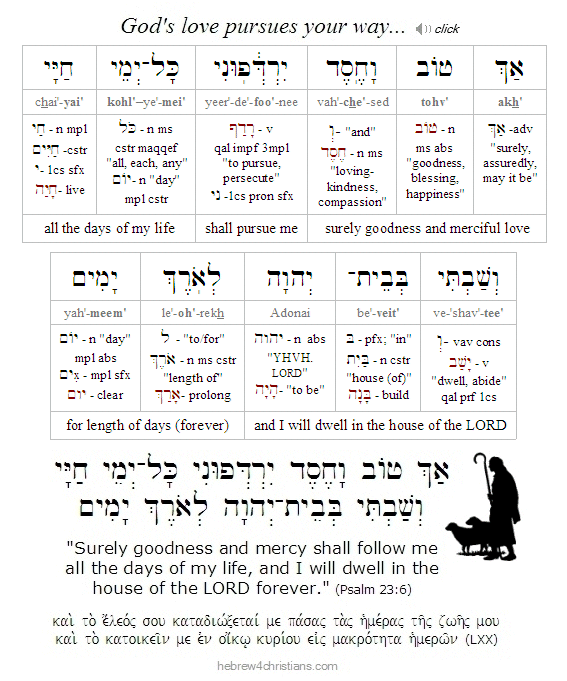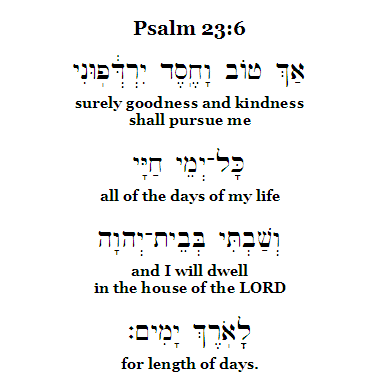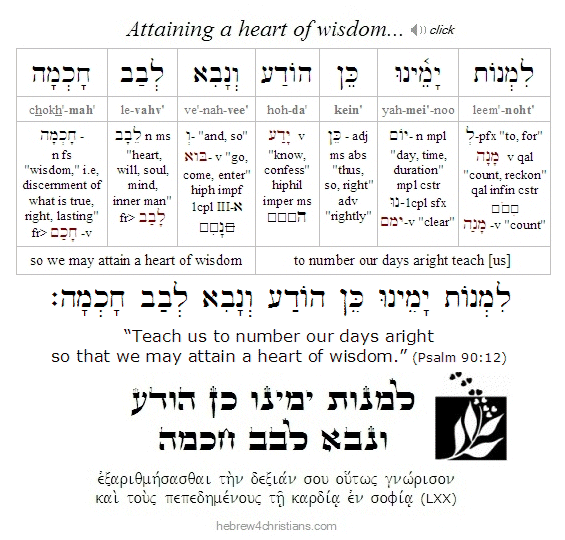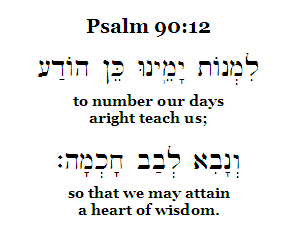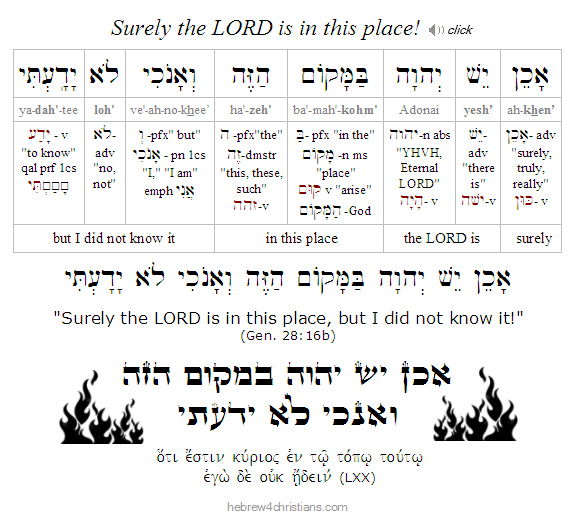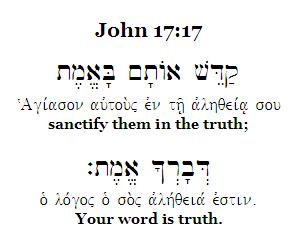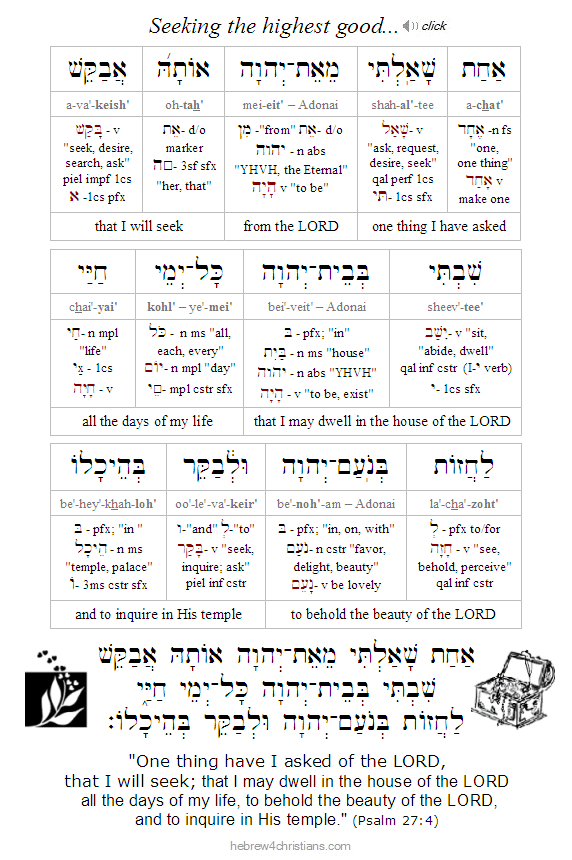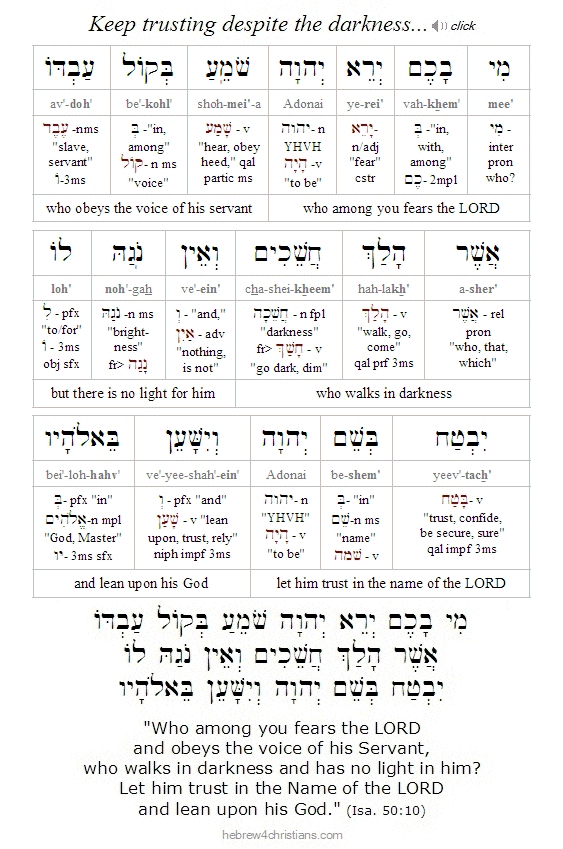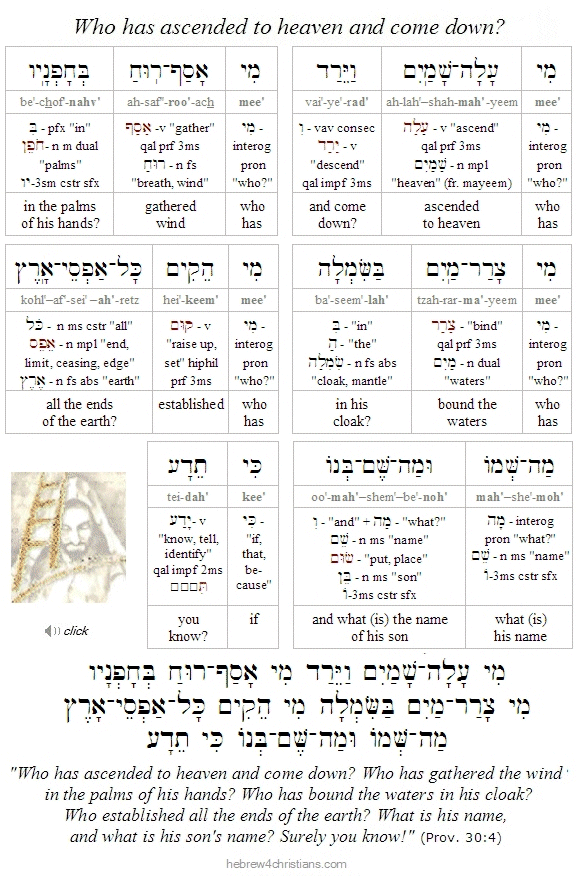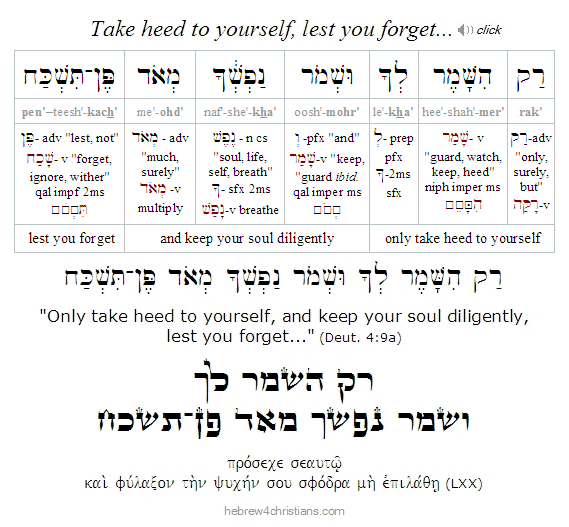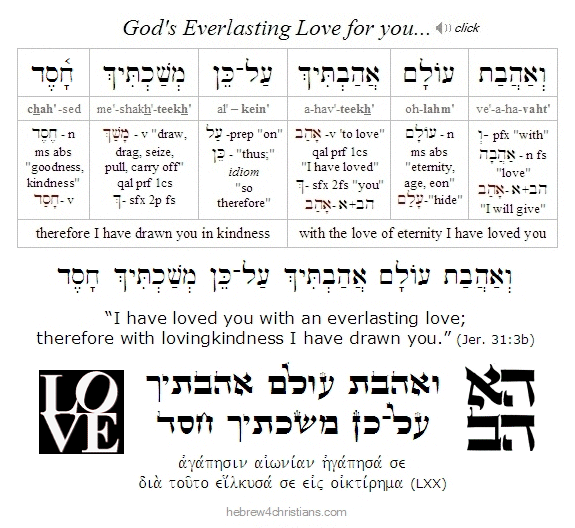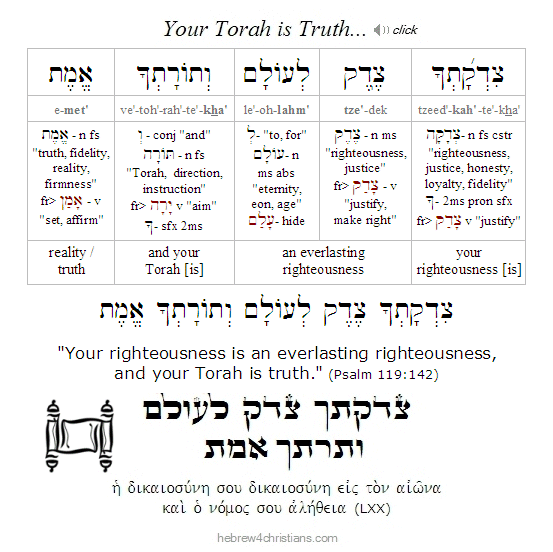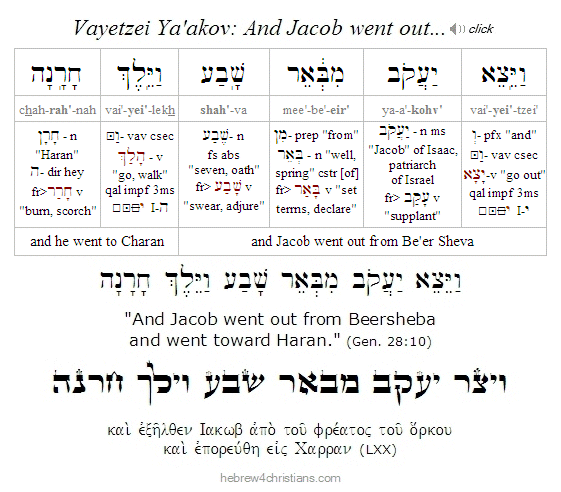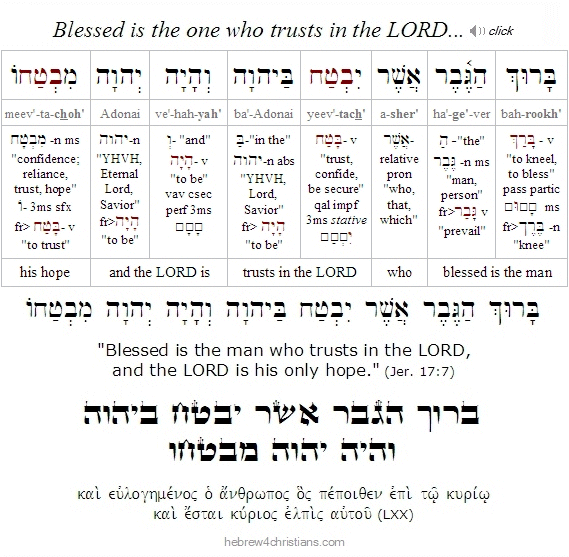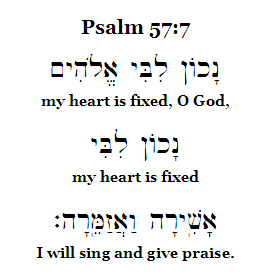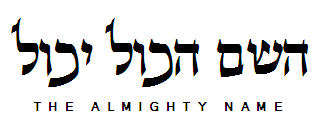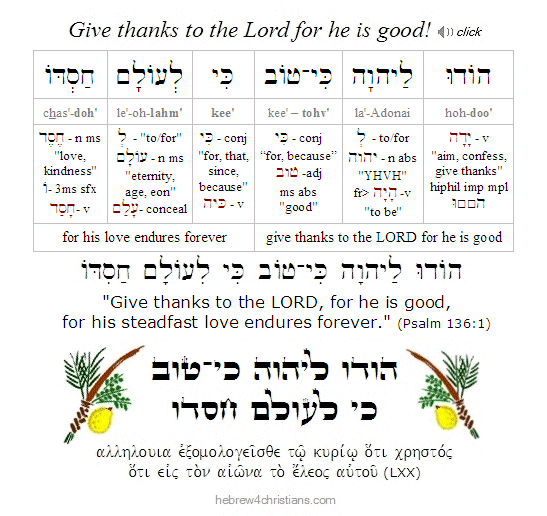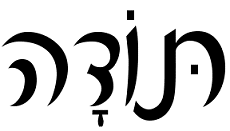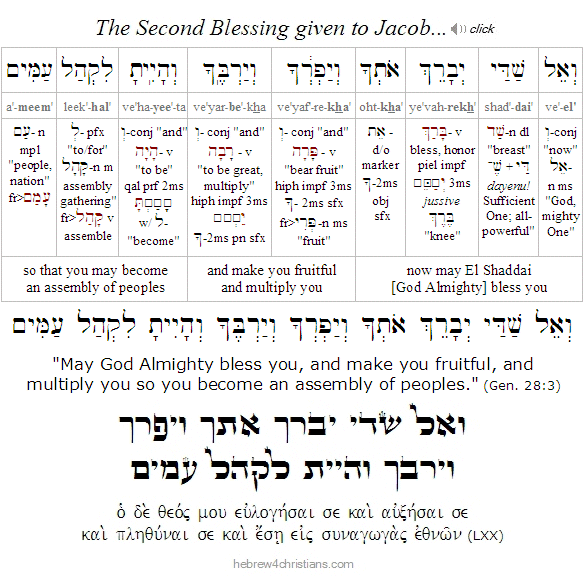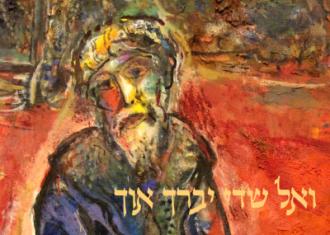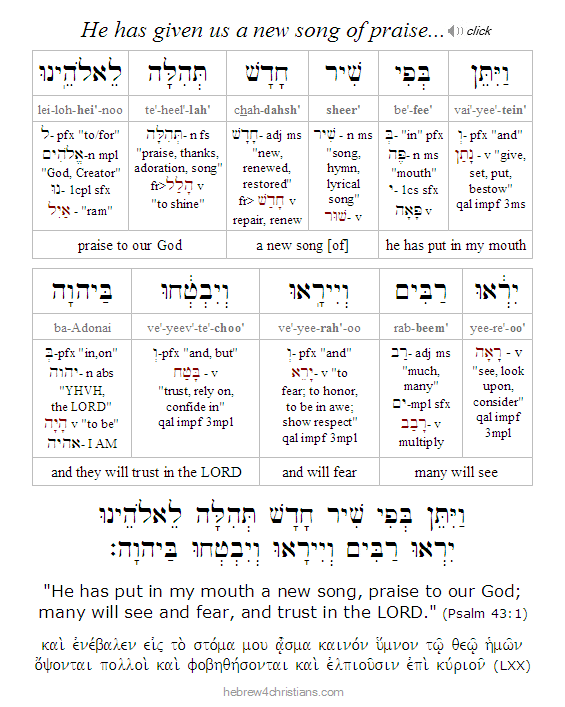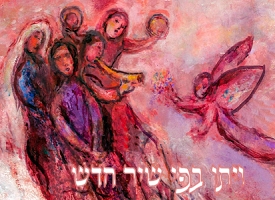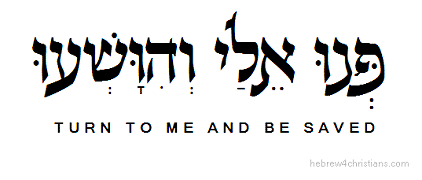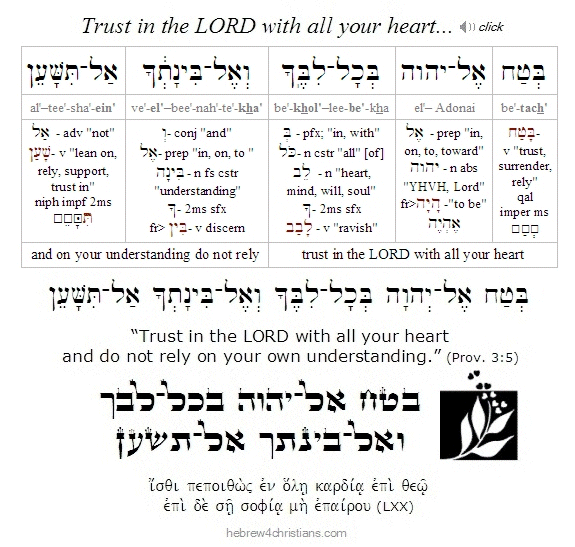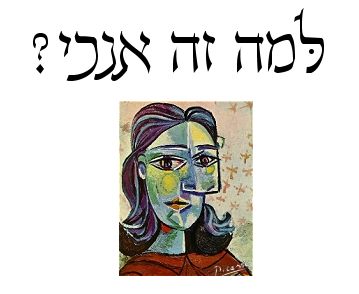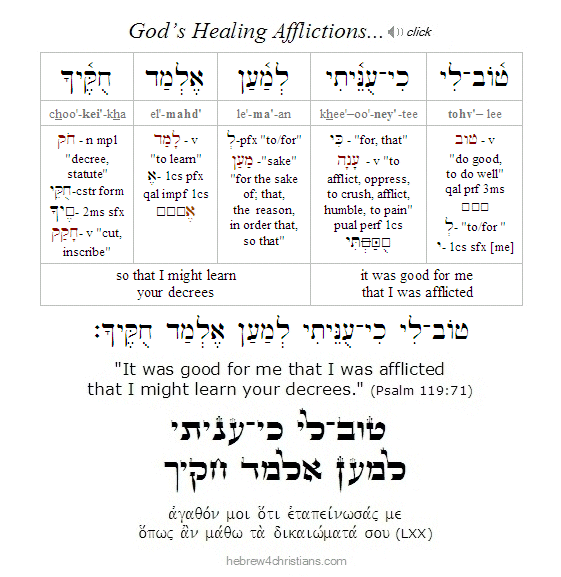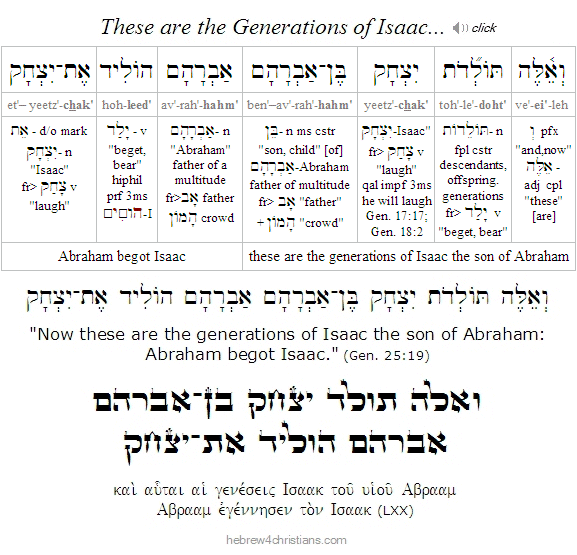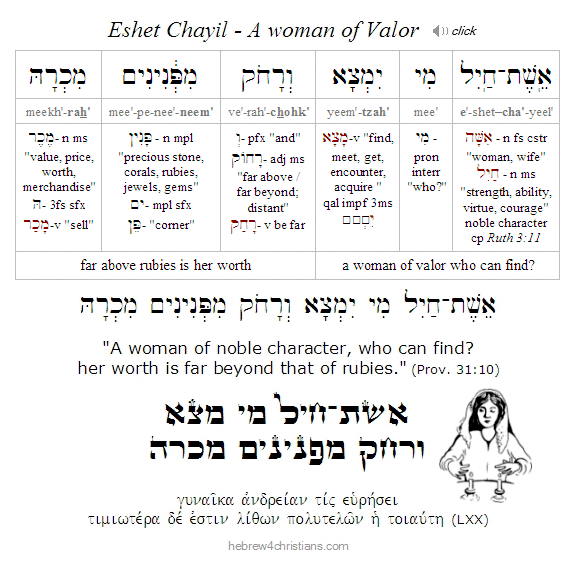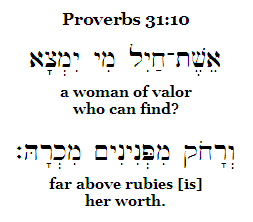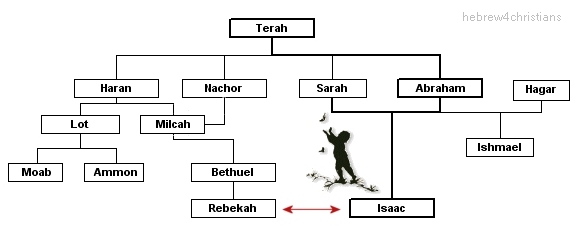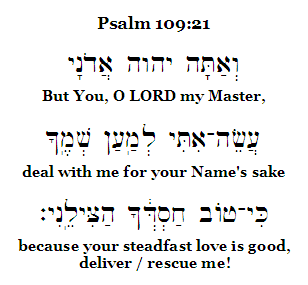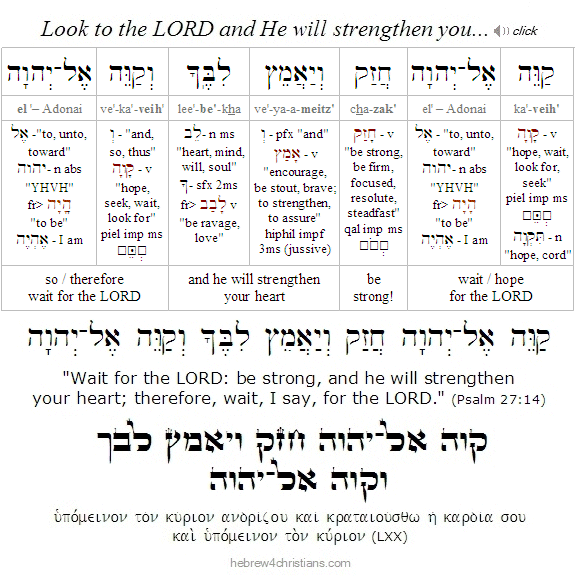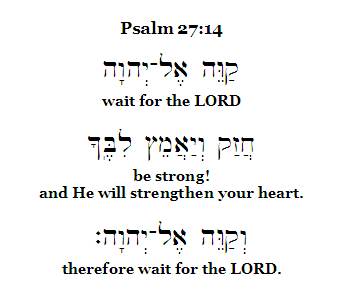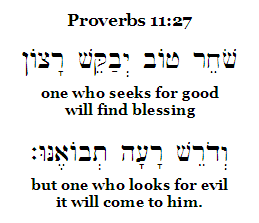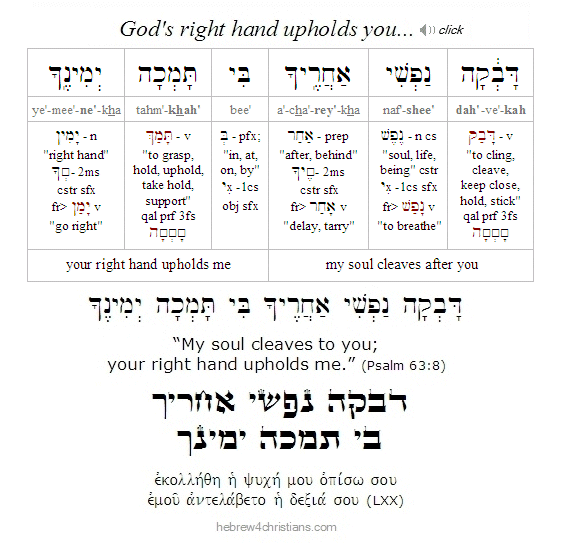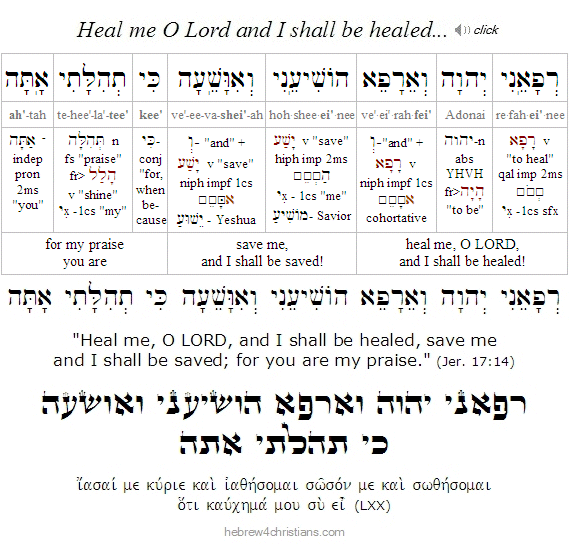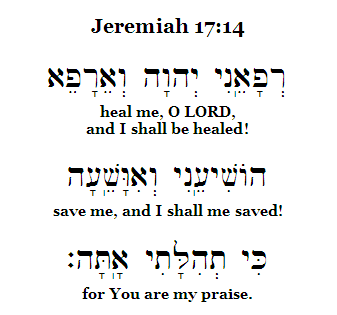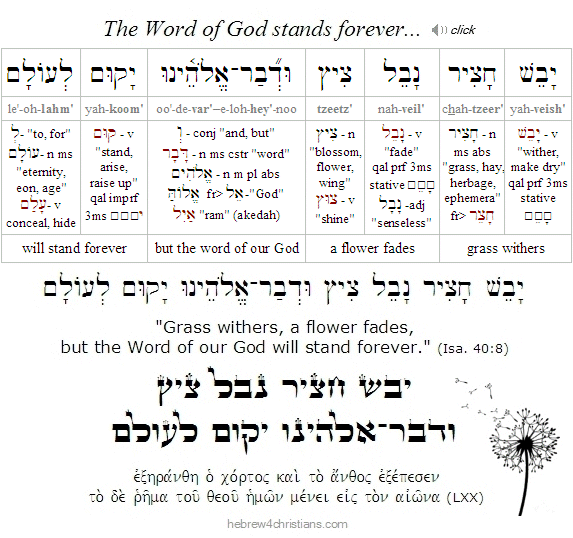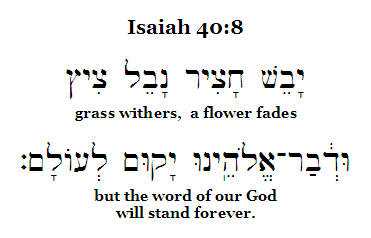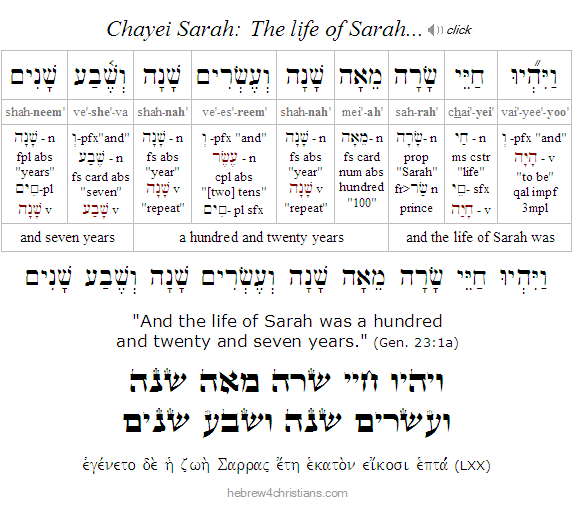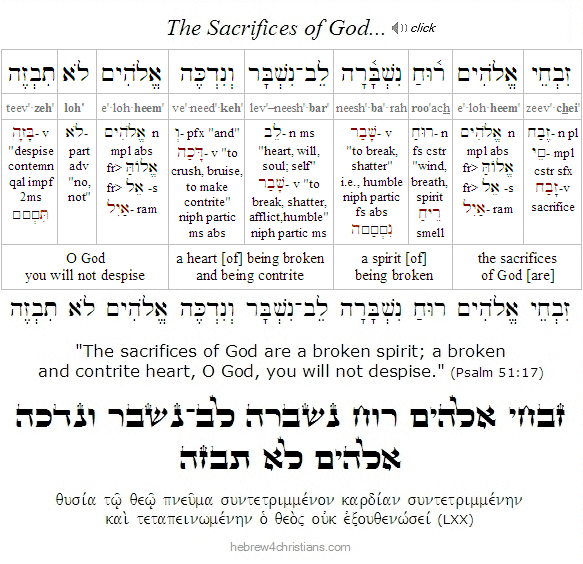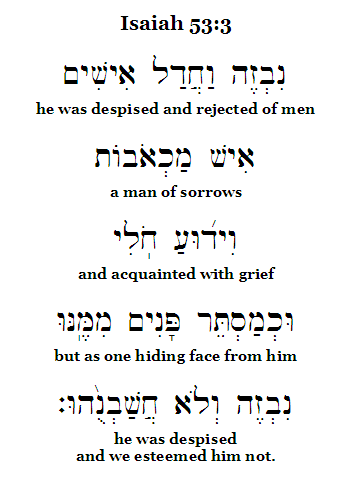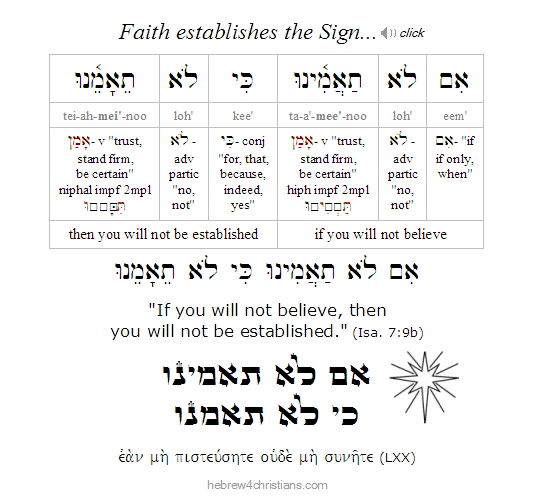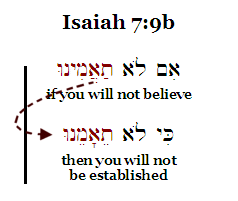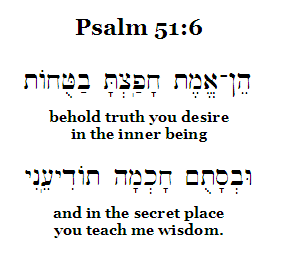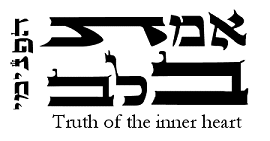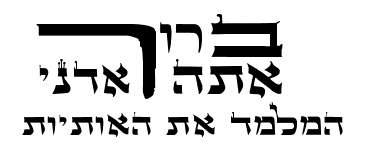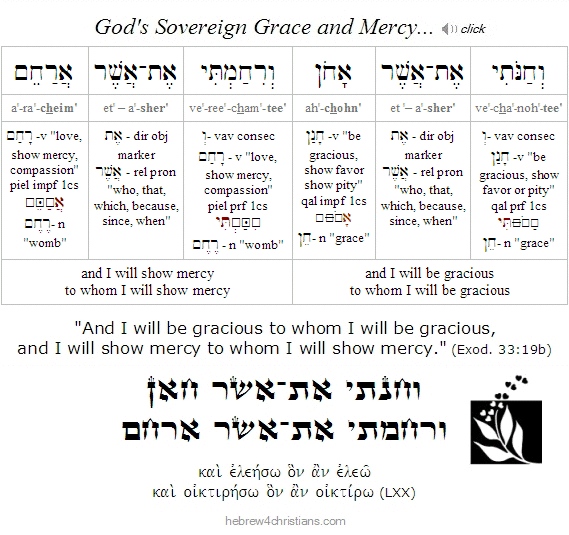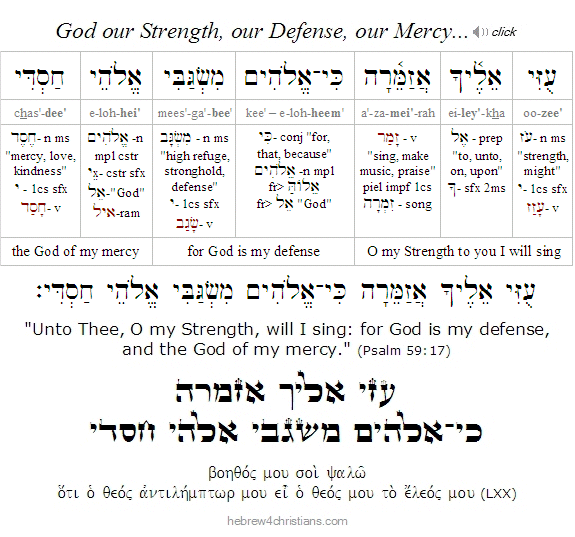|
Jewish Holiday Calendar
For November 2023 site updates, please scroll past this entry....
The Torah divides the calendar into two symmetrical halves: the Spring and the Fall, indicating the two advents of Messiah. The Biblical year officially begins during the month of the Passover from Egypt (called Rosh Chodashim, see Exod. 12:2), and the spring holidays of Passover, Unleavened Bread, and Firstfruits both recall our deliverance from Egypt and also our greater deliverance given by means of the death, burial, and resurrection of the Messiah, the great Passover Lamb of God. Yeshua was crucified on erev Pesach, buried during Unleavened Bread, and was resurrected on Yom Habikkurim (Firstfruits). The holiday of Shavuot (i.e., "Pentecost") both commemorates the revelation of the Torah at Sinai as well as the revelation of the Ruach HaKodesh (Holy Spirit) at Zion, in fulfillment of the promise given by our Lord....
The intermediate months of summer end with the advent of the sixth month of the calendar, called the month of Elul, which recalls the time Moses interceded on behalf of Israel after the sin of the Golden Calf. To commemorate this time of our history, we likewise focus on teshuvah (repentance) in anticipation of Rosh Hashanah and especially in anticipation of Yom Kippur, the great "Day of Atonement." In Jewish tradition the 30 days of Elul are combined with the first ten days of the seventh month (called the "Days of Awe") to set apart "Forty Days of Teshuvah" leading up to the Day of Forgiveness for Israel. Immediately following Yom Kippur, the mood changes as we begin preparing for a joyous week-long celebration called Sukkot (i.e., "Tabernacles") that concludes with the holiday of Simchat Torah.
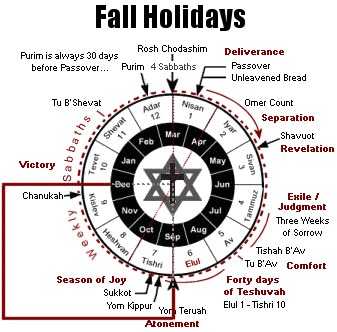 |
The Fall Holidays:

The fall festivals prophetically indicate the Day of the LORD, the second coming of Yeshua, the great national turning of the Jewish people, and the establishment of the reign of the Messiah upon the earth during the Millennial Kingdom in the world to come.
Note that in accordance with tradition, holiday dates begin at sundown. Moreover, some holidays may be postponed one day if they happen to fall on the weekly Sabbath:
1. Month of Tishri (Fri.. Sept. 15th [eve] - Sat. Oct. 14th [day])
3. Month of Cheshvan (Sat. Oct. 14th [eve] - Mon. Nov. 13th [day])
- Four Sabbaths: Noach, Lekh-Lekha, Vayera, Chayei Sarah
- Yom Ha'Aliyah - Honoring Israel's immigrants (Oct. 22nd; Cheshvan 7)
- Sigd - 50th day after Yom Kippur; Ethiopian Jewish holiday (Sun. Nov. 12th)
4. Month of Kislev (Mon. Nov. 13th [eve] - Tues. Dec. 12th [day])
- Four Sabbaths: Toldot, Vayetzei, Vayishlach, Vayeshev
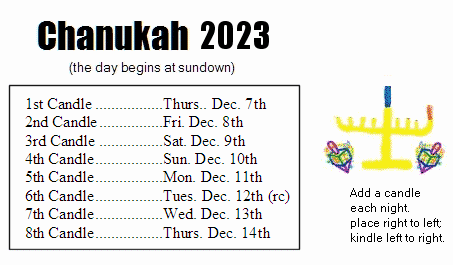
- Dates for Chanukah 2023 (5784):
- 1st Chanukah candle - Thurs. Dec. 7th [i.e., Kislev 25]
- 2nd Chanukah candle - Fri. Dec. 8th [i.e., Kislev 26]
- 3rd Chanukah candle: Sat. Dec. 9th [i.e., Kislev 27]
- 4th Chanukah candle: Sun. Dec. 10th [i.e., Kislev 28]
- 5th Chanukah candle: Mon. Dec. 11th [i.e., Kislev 29]
5. Month of Tevet (Tues. Dec. 12th [eve] - Wed. Jan. 10th [day])
- Four Sabbaths: Miketz, Vayigash, Vayechi, Shemot
- Dates for Chanukah (continued):
- 6th Chanukah candle: Teus. Dec. 12th [i.e., Kislev 30]
- 7th Chanukah candle: Wed. Dec. 13th [i.e., Tevet 1]
- 8th Chanukah candle: Thurs. Dec. 14th [Tevet 2] Zot Chanukah
- Winter Solstice: Wed. Dec. 21st (Tevet 9)
- Christmas - Mon. Dec. 25th (Tevet 13, 5784)
- Asarah B'Tevet - Thurs. Dec. 22nd (dawn), 2023; fast for Jerusalem
- Secular New Year: Mon. Jan. 1st, 2024 (Tevet 20, 5784)
 |
Note: For more about the dates of these holidays see the Calendar pages....
November 2023 Updates
Note: Please refresh the page (or press F5) to see the latest updates...
Honesty and Deliverance...

[ "If we do not die to ourselves, we cannot live to God, and he that does not live to God, is dead."- George MacDonald ]
11.30.23 (Kislev 17, 5784) "Those who are well have no need of a physician, but those who are sick. I have not come to call the righteous but sinners to repentance" (Luke 5:31-32). Every one of us has a "dark side" or a "shadow self" that has destructive and selfish urges. We try to conceal this truth from others (and even ourselves) but such denial doesn't change the reality within our hearts (Matt. 5:19; Jer. 17:9; Eccl. 9:3). Indeed, when we pretend to be something we are not we are more likely to be overwhelmed by dark forces hidden within us. Paradoxically we most vulnerable when we think we are well, that is, when we deny our sickness our heart and minimize our need for deliverance.
The way of healing is to "own" or confess the truth of our inner condition and to acknowledge the dark passions that sometimes overmaster our best intentions. We must give ourselves permission to allow the hurt, angry, and fearful voices to be heard and sanctioned within us - and then to bring these dark and hidden aspects of our selves before God for healing. The failure to do so will split the soul and cause the hidden aspects of the self to seek "revenge" upon the "parent self" that censors their message. The struggle within our hearts is real and we should attend to it seriously. Denying evil by pretending that we are okay, or by blaming others, blinds us to the truth of our ongoing need for deliverance. May God help each of us to be honest with ourselves and to confess our great need before our Heavenly Father.
Why do we have such difficulty being genuinely honest with ourselves? Despite the fact that we may profess that we are "sinners saved by grace," we often make excuses for our failures, rationalizing that we are not "that bad," and therefore we postpone genuine teshuvah (repentance) and trifle with our spiritual lives. We do this because we feel an almost irresistible desire or "need" to justify ourselves, to "save face" by pretending that we are not "incurably sick," or by attempting to find something about us that makes feel valuable and worthy. As H.L. Mencken once wittingly noted, "the 'truth' that survives is simply the lie that is pleasantest to believe."
The LORD wants us to be truthful in the "inward being" (Psalm 51:6), though that truth will cost us something, namely whatever worldly gains we might find through self-deception... Opening our hearts to divine examination eventually means colliding with the world of men and their conspiracies, since the godly man no longer abides their presence (Psalm 1:1-2). The Apostle Paul said there was an exclusive disjunction between seeking the approval of men and of the approval of God: "Do I seek to please men? for if I yet pleased men, I should not be the servant of the Messiah (Gal. 1:10). Likewise we are told not to deceive ourselves (lit., "reason around" the truth, from παραλογίζομαι, from παρά, "around, beside" and λογίζομαι, "to reason") by merely hearing the truth of Scripture and not living it (James 1:22). God is not interested in "lip service" any more than he desires heartless sacrifice (Isa. 29:13; Hos. 6:6; Matt. 15:9). "Let your love be genuine (ἀνυπόκριτος, without a "mask" put on), abhor what is evil; cling to what is good (Rom. 12:9). God abhors those who pretend to know Him but who are really spiritual impostors (Matt. 7:21-23; 25:11-12; Luke 6:46).
Tragically (and paradoxically) many people can talk themselves into believing something without really believing it, and that is perhaps the most dangerous thing of all (Matt. 7:22-23). On the other hand, some people can talk themselves into believing (or accepting) something that they know is untrue (or morally wrong), and that self-deception leads to inner fragmentation, chaos, and dissolution of character. A "double-minded man is unstable in all his ways" (James 1:8). As I have said before, the word translated "double-minded" is dipsuchos (δίψυχος), a word formed from δίς, "twice" and ψυχή, "soul." The word describes the spiritual condition of having "two souls" that both want different things at once -- a state of inner contradiction and ambivalence.
Hebrew Lesson
Psalm 51:6 reading (click):
Thank the LORD our God that there is real healing for our inner dividedness, ambivalence, and double-mindedness, but that healing demands rigorous honesty. As Kierkegaard rightly observed: "No person is saved except by grace; but there is one sin that makes grace impossible, and that is dishonesty; and there is one thing God must forever and unconditionally require, and that is honesty." Therefore we are instructed to confess our faults one to another, and pray for one another, that we may be healed (James 5:16). May the LORD our God help each of us to be wholehearted in our devotion to Him.
Finally, friend, a closing thought. Do not despair by thinking that you will never change. Simply enter into the presence of God in Yeshua. That is what "self-denial" means. Turn to God and know his heart. When you do, you receive a heart to know him in return... Believe to see the goodness of the LORD in your midst. Amen.
The Thirst of Hope...

11.30.23 (Kislev 17, 5784) It's been difficult time over the last two years, and my family appreciates your prayers, friends. Our oldest son has been battling anxiety, depression and drug abuse for some time now. He recently moved out of the house and is currently living with someone in a dangerous part of the city. Of course we are worried about him and pray for him daily, though I solicit your prayers for him as well... Our middle son also is struggling and misses his brother, while our youngest has "dysphraxia," an ongoing developmental disorder that challenges him. Olga works part time now though that adds to some of the pressures on me. She is of course deeply concerned for her kids and for our future. Besides all this, my mother is near death and that has been heavy on my heart, too. Last night she went to ER because she was coughing blood and her oxygen levels were very low.
As for me, I wait for the LORD through sleepless nights, the banality of gray days, punctuated by pain, sighs of heartsick hope, fearful whisperings, and loneliness. It sometimes feels like the "samsara" of the desert, a place of exile. There is no place I want to go anymore... I walk with a limp, friends. The sages say that our father Isaac went blind because the angel's tears fell into his eyes as he lay bound upon the altar... I wonder if he might have later asked himself what use is there to see any more of this world? But (surprisingly) God used his blindness to allow the blessing to be given to Jacob, after all.
Some wounds are incurable in this present life... I have felt swallowed up in grief and inexplicable sorrow from the days before I knew my right hand from my left. Shame has been a constant companion; melancholy my muse. I cannot outrun myself. "Cursed be the day wherein I was born!" exclaimed both Job and Jeremiah (Job 3:3; Jer. 20:14). "If this is how you are going to treat me, please go ahead and kill me -- if I have found favor in your eyes -- and do not let me face my own ruin" said Moses (Num. 11:15). The prophet Elijah likewise prayed that he might die: "I have had enough, Lord," he said. "Take my life; I am no better than my ancestors" (1 Kings 19:4).
Of course personal suffering in this life is common enough, and no one is immune to it, though it is especially poignant, I think, to souls that seek God's presence and love above all things, for these people are bound to be misfits in this world of vanity and conceit. Soren Kierkegaard is such an example, and he once wrote: "What is a poet? An unhappy man who hides deep anguish in his heart, but whose lips are so formed that when the sigh and cry pass through them, it sounds like lovely music.... And people flock around the poet and say: 'Sing again soon' - that is, 'May new sufferings torment your soul but your lips be fashioned as before, for the cry would only frighten us, but the music, that is blissful."
The Jewish philosopher Martin Buber spoke of the loneliness that results from Modern society, which he called an "It-world" that is marked by the prevalence of "I–It" rather than "I–Thou" relationships. The realm of the "institution" objectifies or "thingifies" people, and this bureaucratic "system" creates a sense of existential angst. Trapped in the "It-world," people begin to feel that life is meaningless, as they are numbered among the "faceless crowd" and are enthralled in a Kafkaesque prison of loneliness... The way out for Buber - and this is surely right - is to be in a life-transforming relationship with God, the ultimate "I-Thou" connection that will sustain our way despite the hardness of the "It-world."
Our Lord said: "Blessed are those who hunger and thirst for righteousness..." (Matt. 5:6). Yes, blessed are those who suffer such desperate need, who know inner emptiness, who are not made numb to the ache, and who cry from the heart for deliverance. Blessed are those who are in dread over themselves, who fall as one dead before the Divine Presence, who know they are undone, ruined, and dying for life... The great danger, spiritually speaking, is to become complacent, untouched by poverty of heart, to be lulled asleep, lost within a dream, made comatose, living-yet-dead. The gift of faith first reveals our own lostness and then imparts courage to live with ourselves despite ourselves as we seek God's healing and life...
"Blessed art Thou, LORD our God, who never leaves nor forsakes us, and who draws us close through hunger and thirst." We are truly blessed when we ache with heartfelt longing for the Divine Presence... This is not some form of masochistic spirituality. Feeling content, unconcerned, satisfied, numb, etc., may be a sign of a dreadful condition of heart. "You, God, are my God, earnestly I seek you; I thirst for you, my whole being longs for you, in a dry and parched land where there is no water" (Psalm 63:1).
Well I didn't intend to make this a long post, so I will close for now. I hope I didn't come across as being full of self-pity, friends. I know we all struggle and hurt at times. But please remember us in your prayers, for we truly need them. And I pray that Hebrew for Christians will not be an "I-it" relationship for you, but one that helps you draw closer to the LORD and the "I-Thou" blessing of knowing him better. Amen.
Hebrew Lesson
Psalm 42:2 reading (click):
Telling God your name...
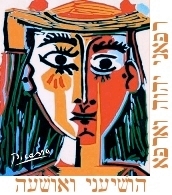
The following entry is related to this week's Torah reading, parashat Vayishlach...
11.30.23 (Kislev 17, 5784) Some people make it the business of theology to know God's Name, but God begins by first asking for our name instead. Recall that Jacob had disguised who he really was in the hope of obtaining the blessing (Gen. 27), though his duplicity forced him into an exile that lasted until he was finally willing to be honest with himself. And like Jacob, each of us must answer God's question: "What is your name?" (Gen. 32:27). When we "wrestle through" this question to face who we really are, we encounter God and find our blessing, that is, our true identity. Each of us has to go through the process of being renamed from "manipulator" (i.e., Yaakov) to "one in whom God rules" (i.e., Israel). But note the order: it is only when we "tell God our name," that is, own who we really are, that He meets with us "face to face" (Gen. 32:30). You will not be able to say, "I will not let you go unless you bless me," until you are willing tell God your name (Gen. 32:26-27).
Let me add that while "telling God your name" can be painful and even frightening, it is not the last word about who you really are. We are faced with an inner dualism as we struggle to take account of our lives. On the one hand, we need to confess the truth of our sinfulness, brokenness, and so on, while on the other we must endure ourselves and find faith that God's blessing nevertheless belongs to us, despite the mess we've made of our lives.... We have to be willing to accept God's new name for us and to believe that God will miraculously transform our inner nature for good. We are renamed from Yaakov to Israel, though we still know ourselves as both. Jacob was renamed "Israel" but afterward he walked with a limp, seeing both the new and the old natures within him. Jacob still struggled, though his struggle was now focused on walking as God's beloved child in this world: the limp was given to help him lean on the Lord for support.
Part of spiritual growth involves learning to "endure yourself." Many are able, it seems, to receive the hope that they are forgiven for their past sins, but they are subsequently scandalized by encountering their own inner struggles, and they eventually despair over their ongoing weakness... Tragically, some are even tempted to regard the warfare within the heart as a sign of being devoid of all saving grace! We must remember, however, that there is a real struggle between the desires of the flesh and the desires of the Spirit (Gal. 5:17). We must never move away from simple trust in the message of God's unconditional love demonstrated at the cross; we must never seek to legitimize our place in God's heart. When we walk by the Spirit, we are no longer under the law (Gal. 5:18), which is to say, we no longer need to justify ourselves but instead trust in God's power to transform us. Just as we are saved by the love of God, so are we changed, so do we grow.
Hebrew Lesson
Psalm 116:1-2 reading (click):

Blessed Need of Heart...
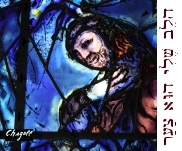
11.29.23 (Kislev 16, 5784) "I need Thee every hour..." More than anything else, God's love is what we desperately need, isn't it? In moments of testing when we feel wounded, alone, unworthy, afraid, and needy; and especially when we succumb to the depths of despair and sickness of heart... God's love descends to the depths of our soul - to the very dust of death itself - to hear our cries and to profoundly touch us... Praise the Name of Love - despite everything, God saves us from ourselves, from our worst fears, and from the hell of shame and abandonment. My soul yearns for you in the night; my spirit within me earnestly seeks you (Isa. 26:9). I say to the LORD, Adonai atah: "You are my Lord; I have no good apart from you" (Psalm 16:2).
אָמַרְתְּ לַיהוָה אֲדנָי אָתָּה
טוֹבָתִי בַּל־עָלֶיךָ
ah·mart · la·doh·nai: · A·doh·nai · ah'·tah
toh·vah·tee · bal - ah·ley'·kha
"I said to the LORD, "You are my Lord;
I have no good apart from you." (Psalm 16:2)

The ongoing need for the LORD is perhaps the highest estate of the human soul, even if it is nevertheless attended with heartsickness and unrelenting longing. It is a great, great gift from heaven to know God as your heart's true desire - to fully understand that your relationship with Him is the ultimate concern and treasure of your existence.
Finding Real Treasure...

11.29.23 (Kislev 16, 5784) "The kingdom of heaven is like treasure hidden in a field, which a man found and covered up. Then in his joy he goes and sells all that he has and buys that field. Again, the kingdom of heaven is like a merchant in search of fine pearls, who, on finding one pearl of great value, went and sold all that he had and bought it" (Matt. 13:44-46). Here Yeshua teaches us that a relationship with God is the true source of joy and value in life, and that all other passions and desires are like "fools gold" when compared with its overwhelming worth... In this connection Soren Kierkegaard wrote: "If anyone thinks he is a Christian and yet is indifferent toward being that, then he really is not one at all. Indeed, what would we think of a person who gave assurances that he was in love and also that it was a matter of indifference to him?" (Works of Love).
The Shema, the "first and greatest commandment," is to love God "bekhol levavkha" (בְּכָל־לְבָבְךָ) with all our hearts, and yet how is that love possible apart from the revelation of the passion of love itself? "We love because God first loves us" (1 John 4:19), and therefore teshuvah ("repentance") is a matter of being in love, celebrating God's heart for us, awakening to its wonder, and being thrilled and overjoyed at its reality. Is this not the essence of the matter? "Shimon ben Yonah, atah ohev oti?" – "Simon son of Jonah, do you love me?" (John 21:17). But how can we love the Lord apart from trusting his heart for us? "Come unto Me," Yeshua says, "live in Me and I will live in you." O Lord God our Savior, deliver us from apathy and indifference! Soften our hearts and awaken us to our great desire and need for you! Hashivenu, Adonai: turn us, O LORD, and we shall be turned; heal us, and we shall be healed... Help us to know the breadth and length and height and depth of your great love.
So for what do you hope, friend? What are your dreams? Your deepest desires? Where is your treasure? Yeshua cautioned those who sought their happiness in this world: "Do not store up for yourselves treasures upon earth... be rich toward God" (Matt. 6:19-20; Luke 12:21). When we treasure God, our focus is directed toward the eternal reality, and our interest in this world fades. We trust God to meet our daily needs and surrender our future to His care. The only worry we face concerns our own deficiencies in our obligations to the Savior. Our duty is to love God in the truth - bekhol levavkha - with all our heart, having no thought of ourselves. Indeed, self-denial means to quit thinking about yourself (from α-, "not," + ῥέω, "to speak") by accepting what God has done for you. "It is not my business to think about myself. My business is to think about God. It is for God to think about me" (Simone Weil). Amen, where your treasure is, there will be your heart also.
Hebrew Lesson
Jer. 24:7a reading (click):
Our Times in His Hand...
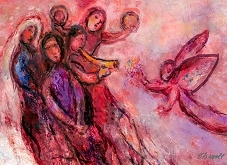
11.28.23 (Kislev 16, 5784) Do you understand that in God's sovereign design and plan for creation, He breathed out a part of his very heart, soul, and strength to create you in his own "image and likeness," a reflection of his own self-existence and reality? This is the essential blessing each of us has been given. Rene Descartes' awareness of the inner witness of the soul: "I think therefore I am," echoes the אֶהְיֶה אֲשֶׁר אֶהְיֶה, "I am that I am," within our hearts. The LORD is the "God of the spirits of all flesh" (Num. 16:22) for "in Him we live and move and have our being" (Acts 17:28).
The moments of our lives, the ups and downs of our goings, the length of our days - and especially the purpose and end of our existence - are all in the hands of God, as it says: "In you I put my trust, O LORD; I said, 'You are my God; my times are in your hands" (Psalm 31:14-15). A person may "devise his own way," but it is the LORD that directs his steps.
If we consider our lives apart from God, however, all we see is wretchedness, limitations, shortness of days, and the absurd specter of death at the end of it all. Life always seems too short; the days fly past us like a dream, soon we are "cut off" and gone. When the moment of death occurs, many are lost to its eternal significance...
On the other hand, when we trust that our lives are under God's providential direction, and we realize that our Heavenly Father "numbers the hairs on our head," then we can quiet our hearts and abandon ourselves to his care (Isa. 46:8-10; Psalm 103:19). As it is written: "Those who trust in you know your Name; for you do not forsake those who seek you, O LORD" (Psalm 9:10). And as the Apostle Paul preached to the Athenians, "God, who alone is Creator, the Lord of heaven and earth, has given life and breath to all people, and from one man has made every nation of people to live on the earth, having determined prescribed times and the boundaries of their habitations" (Acts 17:24-26).
For the believer there is no greater comfort than to trust that the LORD will work "all things together" for our ultimate good (Rom. 8:28). "Whoever lives and believes in me shall never die" (John 11:26). Yet there is a veil. "God has made every thing beautiful in his time, and he has set eternity in people's hearts, so that no one can find out what he has ordained from the beginning to the end" (Eccl. 3:11). So while we know only "in part," as through "a glass darkly," we believe that the LORD goes before us and will always be with us (Deut. 31:8). And one day we shall see him "panim el-panim," face to face (1 Cor. 13:12). "Beloved, now are we the children of God, and it does not yet appear what we shall be: but we know that, when he shall appear, we shall be like him, for we shall see him as He is; and everyone that has this hope in Him is purified, even as he is pure" (1 John 3:2-3).
Χάριτι δὲ θεοῦ εἰμι ὅ εἰμι - "by the grace of God I am what I am" (1 Cor. 15:10). This is a radical axiom that should be foundational to our faith, namely that nothing occurs in our lives apart from God's will for our ultimate blessing. From small matters to big, from the seemingly insignificant to the momentous, from what seems hopelessly undone to the sheer miracle and glory of existence itself -- categorically everything, in every conceivable world, is under the sovereign hand of the One who works all things together for his glory and for our good. Amen. Yeshua "upholds all things" (φέρων τε τὰ πάντα) by the word of his power. "All things were created by him, and for him, and in him all things hold together" (ἐν αὐτῷ συνέστηκεν). Our Lord is the "Magnetic Center" of all reality, its beginning and its end.
How could it be otherwise? For who can overrule the will of God our Creator and the LORD over all? "From eternity to eternity I am God. No one can snatch anyone out of my hand. No one can undo what I have done" (Isa. 41:13). "For the Lord of hosts has planned, and who can frustrate it? And as for His stretched-out hand, who can turn it back?" (Isa. 14:27).
Therefore do not be afraid. "For I know the thoughts that I think toward you, says the LORD, thoughts of peace and not of evil, to give you a future and a hope" (Jer. 29:11). As Yeshua said: "Fear not, little flock; for it is your Father's good pleasure to give you the kingdom" (Luke 12:32). Hallelujah! For the Lord our God, the Almighty, reigns!
Hebrew Lesson
Psalm 9:10 reading with commentary (click):
Wresting the Blessing...

[ "And now brothers, I will ask you a terrible question, and God knows I ask it also of myself. Is the truth beyond all truths, beyond the stars, just this: that to live without him is the real death, that to die with him the only life?" - Frederick Buechner ]
11.28.23 (Kislev 16, 5784) In our Torah portion for this week (i.e., Vayishlach), we read how Jacob wrestled with a mysterious "Man" until the break of dawn, but refused to let go until he had secured God's blessing (Gen. 32:24-26). This climactic moment marked a "rebirth" experience for Jacob as signified by his new name "Israel" (יִשְׂרָאֵל), meaning "one who has striven (שָׂרָה) with God (אֱלהִים) and prevailed" (Gen. 32:28). It is fascinating to notice that Jacob was not renamed "God-fearer," or "God-lover," or even "Man of faith," but rather "God-wrestler" – one who struggles with God until the blessing comes... As Yeshua said, "Blessed are those who hunger and thirst for righteousness" – that is, for those who struggle and search for truth – "for they shall be filled" (Matt. 5:6). The blessing comes with a wound, however: The limp that Jacob acquired constantly reminded him of his ongoing need for God's help as he walked through this life. "The one who falls on this Stone will be broken to pieces; but when it falls on anyone, it will crush him" (Matt. 21:44).
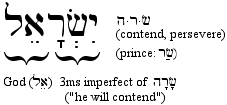 |
So how are you struggling? How does that feed your hunger for God? The characteristically Jewish approach to life is to struggle, to fight, and to ask hard questions until we find out who we really are and what we call ourselves... We can change what has happened in our past by changing what is happening in our present: "For thus says the LORD to the house of Israel: dirshuni vichyu (דִּרְשׁוּנִי וִחְיוּ) - "Seek me and live" (Amos 5:4).
Hebrew Lesson
Amos 5:4 reading (click):
Escape the Digital Prison...

11.27.23 (Kislev 15, 5784) How do you stay focused on what is most important in a world that is over saturated with "information" and programmed interruptions? It's been said the average smartphone user checks their device over 100 times a day, with an average of 4 1/2 half hours connected to their phone — and that does not include time spent watching online video streaming, gaming, or engaging in work-related use of a computer! That doesn't leave most people much time away from their smartphones or other screens, and indeed, being apart from (or losing) their phone creates a sense of anxiety and dread in many. Sadly we have become a "jacked in" culture, dependent on mass media to give us a (false) sense of reality, purpose, and meaning.
Countless people today suffer from "information overload" and "data obesity." Of course genuine communication has its place in life and at times can be a blessing, but how many hours of pings and distracting "infotainment" constitute nothing but "junk food" for the soul? And screens put you at a distance from real life, leading the mind to an "elsewhere" version of reality. It is a form of double mindedness. Distraction. Loneliness. Madness. Smoke and mirrors. It's the "greatest show on earth." There's a whole "world wide web" of diversion and inanity awaiting everyone -- and precious little of it is necessary to live.
We know that what matters most of all is truly living life before God, but how are you using (and misusing) your attention throughout the day? It's been said that how we spend our days is how we spend our lives. Look where you are going, because you will inevitable go where you are looking... So where are you looking today? What is the focus of your highest hope? How do you spend your days so at the end of your journey you will not lament your life?
"Seek first the kingdom of God," Yeshua said, and all that you really need will be discovered. Doing so requires diligence of focus, looking away from useless things and concentrating on what is most important. It is the nature of sanctification to set yourself apart from the profanity of the everyday world. "You will seek me and find me when you search for me with all your heart" (Jer. 29:13), and searching with "all your heart" means esteeming God as that which is most important to the purpose of your existence.
The temptation of the world is to take the easy way, the smooth path that offers little resistance to your unreflective consciousness. But taking the "easy way" isn't the easy way, after all. It is a deal made with the devil. Being "comfortably numb" is to die inside, to numb your soul from what is most essential, to "gain the world only to lose your soul." The world system craves security and anesthesia, and it doesn't matter how it serves it up. Mindless entertainment, sexual lusts, envy and gossip, political intrigue, fear mongering, rumors of pointless wars -- heck, even religion can serve that end. Come to greatest show on earth! Vanity Fair is always here to console and distract from your dreary life...
In this connection I remember a Passover several years ago wherein one guest brought their teenage son to the Seder we hosted. As we began the service, the young man was busy scanning his phone, with his ear bud firmly in place. As the seder continued, he was disengaged, going through the motions as he sent texts and engaged others not in the room. He was "elsewhere," not present, and therefore a mere specter among us.... The digital world is a world of "artificial intelligence" that creates a form of "artificial reality." Unless we use critical thinking and logic, we will be deceived and put under its spell.
Seeking God means being willing not to know evil things that distance you from that end (1 John 2:16). We must distance ourselves from the tsunami of worldly "information" and chatter designed to program and seduce us into believing lies and vanities. The "smart phone" is a oxymoronic device intended to make people unthinking, easily led, and dumb. There is now a "normalcy bias" that casts a spell of "disinformation" all about us. It's difficult to pray while keeping an ear open for your smart phone. Are we so gullible that we think that we are not being manipulated by "content providers" and technocratic psychopaths who have their own agenda at heart? Do you consider the people behind Google, Meta, Twitter, CNN, etc., to be "good shepherds" of the human soul?
The digital world has become a noose around the collective neck of humanity, or a "matrix" of ongoing deception and control. Soon enough money will be "digitized" and any so-called personal "freedoms" will be conditionally granted based on a digital social credit scorecard monitored by those who control the illusion of artificial reality. No one will be able to buy or sell without the "mark of the beast" and who do not worship the "image of the beast."
Like Soren Kierkegaard, philosopher Frederick Nietzsche abhorred the "group-think" of the modern world and prophesied of a coming age of "the last man," an archetype of a passive soul that takes no risks and seeks only personal comfort and security. The last man is a person of no real conviction, no working conscience, a member of the herd that lows and bleats out its days. The "last man" is the creation of technology that indoctrinates people into believing the nihilistic lie that life is hopeless, resistance is futile, and therefore all that is left is fantasy and pleasure-seeking. But even the vices of the "last man" are mundane and his life is an ongoing expression of mediocrity:
"The earth has become small, and on it hops the last man, who makes everything small. His race is as ineradicable as the flea-beetle; the last man lives the longest. 'We have invented happiness,' say the last men, and they blink... One no longer becomes poor or rich, for both require too much exertion. One is clever and knows everything that has ever happened, so there is no end of derision. One still quarrels, but is soon reconciled lest it spoil the digestion. One has one's little pleasures for the day and one's little pleasures for the night: but one has a regard for health." (Nietzsche: Thus Spoke Zarathustra, 1885).
Nietzsche is perhaps notorious for saying "God is dead," though it is not because God does not exist, but rather because the apathy of Christianity had killed him. Such apathy eventually led to the idea that "morality" (in the sense of the self-censorship and cowardice of the postmodern age) is actually immoral, and that being passive and refusing to live is the characteristic virtue of this age. The political world is a lie that panders to the crowd, promising them a life of ease - at the price of their freedom.
The call to follow the Lord is a call away from the soft prison house of the "last man." It is to escape from the deluge of "informational garbage" and vanity that chokes the soul to death. The call represents a decision to live by a different set of axioms that overthrows the nonsense and insanity of the world. It is a radical turn that sets you free (John 8:32). That is the point of life: to learn how to live by following Christ. Seeking first God's kingdom means everything; it is the way, the truth, and the life in Yeshua.
But we are warned: "Be doers of the word and not hearers only, deceiving your own selves" (James 1:22). We "come to ourselves" through teshuvah, turning to God and refusing the world's web of lies. But we must be on guard not to "live inside our heads" by playing with theology or religion. Human reason can become a temptation if it leads us to look away from God, even if the reasoning is about God. We know the Lord by doing truth in relationship with Him. Faith is not a static set of doctrines but a passionate mode of choosing to live in trust of God's reality and promises. Theology has its place, of course, but what matters is serving the LORD with all our heart. Amen.
Hebrew Lesson
Jeremiah 29:13 reading (click):
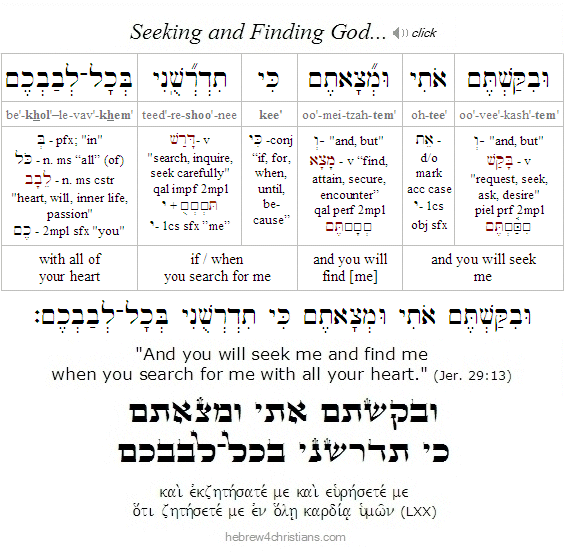 |
This week's Torah:
Parashat Vayishlach...
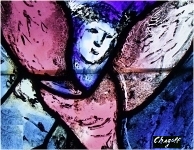
[ We always read Vayishlach a week or two before Chanukah when we connect the vision and ministry of Joseph with that of Yeshua, the Suffering Servant Savior of the world... ]
11.26.23 (Kislev 13, 5784) Our Torah portion this week (i.e., Vayishlach) contains the famous account of how Jacob "wrestled" with the Angel of the LORD (מַלְאַךְ יְהוָה) just before he encountered his estranged brother Esau. During the "grappling" session (recall the meaning of Jacob's name), the Angel injured Jacob's thigh, but Jacob refused to release his hold until he received the blessing (הַבְּרָכָה). The LORD then asked him, "What is your name (מַה־שְּׁמֶךָ)?" And he said, "Jacob" (i.e., Ya'akov: יַעֲקב). The Angel then replied, "Your name shall no longer be Ya'akov (i.e., "heel holder" [of Esau]) but Yisrael (i.e., "contender with God"), for as a prince (i.e., sar: שַׂר) you have contended (i.e., sarita: שָׂרִיתָ) with God and with men and have prevailed" (Gen. 32:28). This encounter teaches that Jacob finally received the blessing when he refused to let his past determine his spiritual identity and destiny. With God's help he overcame the pain and shame of his past through faith.
Likewise each of us must "go to Peniel" to wrestle with the Angel, just as each of us must be renamed from Ya'akov ("a supplanter") to Israel ("a prince with God"). When the Spirit of Truth asks, "What is your name," may the LORD God grant you the courage to refuse to "let go" until you receive the divine blessing of love and acceptance...
The word vayishlach (וַיִּשְׁלַח) means "and he sent" (from shalach, שׁלח, "to send"). The sages comment that like Jacob, each person of faith is a shaliach (שָׁלִיחַ), or an "emissary" sent out to bear witness to others of the reality and true blessing of God. And may the LORD God of Israel help you, friend, serve as an extension (שְׁלוּחָה) of His loving and gracious Presence to all you may encounter this day.... L'shavuah tov b'Yeshua Adoneinu, chaverim...
Hebrew Lesson
Genesis 32:3a reading (click):
Dates for Chanukah 2023

11.26.23 (Kislev 13, 5784) On the Biblical calendar the month of Kislev (כִּסְלֵו) is the ninth of the year (counting from Nisan), and also one of the "darkest," with the days progressively getting shorter and the nights getting longer. Indeed, the Winter Solstice often occurs during the last week of Kislev, and therefore the week of Chanukah (which straddles the months of Kislev and Tevet) often contains the longest night of the year. It is no wonder then that the holiday of Chanukah presents an appropriate time to kindle the lights of faith - and to remember the Light of the World in the Messiah's advent to earth...
The Hebrew word Chanukah (חֲנוּכָּה) means "dedication" and marks an eight day winter celebration that commemorates the victory of faith over the ways of speculative reason, and demonstrates the power of the miracle in the face of mere humanism. Although it is customarily observed as a "Festival of Lights," Chanukah is a "fighting holiday" -- a call to resist the oppression of this world and to exercise faith in the LORD (Rom. 13:12).
This year the eight days of Chanukah will begin on Thursday, December 7th after sundown (1st candle) and will run until Thursday, December 14th until sundown. On the first night of Chanukah one flame is lit, on the second night two, and so on until the eighth night when eight flames are lit. In this way we remember the 'growth' of the miracle:
 |
The Sigh of Faith...
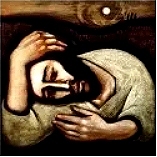
[ "But we believe – nay, Lord we only hope, that one day we shall thank thee perfectly for pain and hope and all that led or drove us back into the bosom of thy love." - George MacDonald ]
11.26.23 (Kislev 13, 5784) "We groan inwardly as we eagerly await our redemption..." (Rom. 8:23). We sigh deeply because we are suspended between two worlds, living in the ambiguity of an already-not-yet expectation, enduring ourselves as imperfect vessels longing for perfection, trapped between what is and what will be, seeing the unseen, yearning for healing, believing that we shall never die, even as we die (John 11:26). We are restless for our eternal home and long for God's presence as we walk through shadowy vales, facing various temptations, whispering our prayers in the dark. And though we must learn endurance and trust in God's sovereign purposes, our faith nevertheless compels us to cry out, "How long, O Lord?" and "Come, Lord Yeshua" (Rev. 22:20). Our challenge is to keep a positive attitude despite the struggles we face, and therefore we inwardly pray: "Renew within me ruach nachon (רוּחַ נָכוֹן) - "a spirit that says Yes" (Psalm 51:10).
Hebrew Lesson
Psalm 51:10 Hebrew reading:
Surrender means accepting God's will for our lives -- saying "yes" to his promise of love, even if we presently feel empty inside and wonder how long we can hang in there... Saying "yes" implies saying "no" to other things - no to fear, anger and doubt, for example. Tragically there are people who have given up hope for bitterness and despair. Asking the Lord to give us a spirit of "yes" is really a prayer for focus, direction, and the willingness to keep pressing on to our heavenly destiny, especially when the way seems dark and hope seems distant.
Though life is a struggle, we do not lose heart or faint, since even though the outer self is wasting away, our inner self is being renewed (i.e., ἀνακαινόω, "raised up") day by day. "For this light momentary affliction is preparing for us an eternal weight of glory beyond all comparison, as we look not to the things that are seen but to the things that are unseen. For the things that are seen are transient, but the things that are unseen are eternal. For we know that if the tent that is our earthly home is destroyed, we have a building from God, a house not made with hands, eternal in the heavens. For in this tent we groan, longing to put on our heavenly dwelling, that is, substance and reality..." (2 Cor. 4:16-5:3). Meanwhile we must endure ourselves, deal with our resistance to mortification, and ask God for the great blessing of keeping us from evil so that we are not consumed by grief....
Hebrew Lesson
1 Chronicles 4:10b Hebrew reading:
Every Prayer Answered...
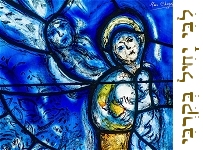
11.24.23 (Kislev 11, 5784) If you have earnestly prayed but are tempted to think that God is not responding, remind yourself that every prayer uttered to God from a heart that trusts in His redemptive love given in Messiah is indeed answered, and not a syllable goes unheeded or will be lost before heaven (Psalm 145:18; Matt. 7:7; Matt. 21:22). Just as we earnestly believe that justice will eventually be manifest and all wrongs fully redressed at the bar of Eternal Judgment -- so we understand that every utterance of the heart of faith finds compassionate response from the heart of heaven, even if in the present hour we must await God's answer to be realized by us. Indeed the essence of teshuvah (return, "repentance") is heartfelt prayer, and therefore when we bring honest words and turn back to accept the truth, God's mercy and compassion are decisively evoked (1 John 1:9). The most important thing is not to lose faith, however, but to believe that God hears you and will indeed answer the cry of your heart. Decide to believe and settle your expectation. Never give up hope. God is faithful; He will do it (1 Thess. 5:24).
King David asked for God's direct and miraculous intervention to heal his soul: "Cause me to me hear your lovingkindness in the morning, for in You do I trust. Cause me to know the way I should go, for I lift up my soul to you" (Psalm 143:8). David's request was that he would be empowered to hear God's loving voice calling to his heart at the start the day, to be assured of God's kindness and favor. Note that the Hebrew verbs used in this verse are both hiphal imperatives, implying that God is the agent or cause of the action. We lift up our heart in expectation, understanding that the LORD alone is the One who is able to draw us near to Him: "You [God] cause me to hear... You [God] cause me to know..."
Hebrew Lesson
Psalm 143:8 Hebrew Reading (click):
Witness of the Spirit...
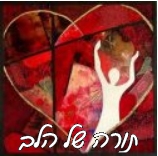
11.24.23 (Kislev 11, 5784) "Because you are his children, God has sent the Spirit of his Son into your hearts, crying, "Abba! Father!" (Gal. 4:6). Note here the Spirit does not cry out using "esoteric" or magical names for God, nor does the Spirit refer to one of God's many titles based on the divine attributes, but instead uses a term of intimacy and profound trust. After all, the word "abba" (אַבָּא) is not so much a name for God as it is a claim about who you are -- it is a confession that you belong to the Lord as his beloved child...
Throughout his ministry Yeshua referred to the LORD simply as his "Father," though he used the intensive address "Abba, Father" (Ἀββᾶ, ὁ πατήρ) just before his arrest and crucifixion, that is, during his intercession at Gethsamane (גַּת שְׁמָנִים), near the olive oil press on the Mount of Olives where the anointing oil for the Temple (שֶׁמֶן הַמִּשְׁחָה) was made, and therefore he called upon "Abba, Father" while in deep suffering and tribulation of heart (Mark 14:36). "Take this cup away from me. Yet not what I will, but what you will..." The mixed dialect of Hebrew and Greek here (i.e., Ἀββᾶ, ὁ πατήρ) may indicate identification with both the Jewish people and the Gentiles who would be united in his passion, as it says, shalom shalom la'rachok vela'karov: "Peace, peace, to him who is far off and to him who is near," says the LORD; "and I will heal him" (Isa. 57:19, Eph. 2:15).
Knowing God as your "father" is an intimate matter of the heart, an inner cry or groan coming from the miracle of spiritual rebirth. "The Spirit himself bears witness to our spirit that we are God's children" (Rom. 8:16). Amen, and Shabbat Shalom chaverim...
Note: His Name is also Yeshua (יֵשׁוּעַ) - the Name above all names (השם מעל הכל) - the Wonderful One (המופלא), Mediator of Peace (שַׂר־שָׁלוֹם), etc. etc. (Phil. 2:11).
Hebrew Lesson
Isaiah 12:2 Hebrew reading (click):
Gratitude and Seeing...
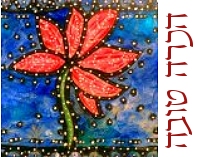
11.24.23 (Kislev 11, 5784) We are instructed to see small miracles, everyday "signs and wonders..." In our Torah portion for this week (i.e., Eikev) we read: "And you shall bless the LORD your God for the good land he has given you." (Deut. 8:10). Whenever we derive benefit or enjoyment from something we are to bless (i.e., thank) God for his goodness. Jewish tradition says that if one eats or drinks without saying a blessing, it is as if he has stolen from God. From the verse, "What does the LORD ask of you..." (Deut. 10:12), the sages infer that a person should say at least 100 blessings a day, since the word מה, "what," alludes to the word מאה, a "hundred." The Hebrew term for gratitude is hakarat tovah (הַכָּרַת טוֹבָה), a phrase that means "recognizing the good." The heart looks through the eye, and therefore how we see is ultimately a spiritual decision: "If your eye is "single" (i.e., ἁπλοῦς, sincere, focused)," Yeshua said, "your whole body will be filled with light" (Matt. 6:22). When we see rightly, we are awakened to God's Presence in the little things of life, those small miracles and glories that constantly surround us. The good eye of faith sees hundreds of reasons to bless God for the precious gift of life (1 Cor. 10:31). Open your eyes... The LORD is "enthroned among the blessings of His people" (Psalm 22:3).
Addictions, cravings, lusts, etc., arise from a refusal to be satisfied, by hungering for more than the blessing of the present moment. "My people have committed two evils: they have forsaken me, the fountain of living waters, and hewed out cisterns for themselves, broken cisterns that can hold no water" (Jer. 2:13). The living waters are present for us, but we will only find them if we open our hearts to the wonder of God in this moment. We can "break the spell" of continual dissatisfaction, of the power of greed, ambition, and so on, when we discover that our constant hunger is really a cry for God and His blessing. This is the blessed "hunger and thirst" given by the Spirit (Matt. 5:6). Our sense of inner emptiness is an invitation to come to the waters and drink life. So come to God's table and ask the Lord Yeshua to give you the water that will satisfy your heart's true thirst for life...
It is written: "Oh, taste and see that the LORD is good! Blessed is the man who takes refuge in him! Oh, fear the LORD, you his saints, for those who fear him have no lack" (Psalm 34:8-9). We can only "taste and see" when we are earnest however, when we seek God with passion... When you pray, lift up your heart and soul to God, asking for the miracle to surrender to Him in the truth. Where it says, "with all your heart" (בְּכָל־לְבָבְךָ), present before him all your passion and desires; your hopes and your needs, your fears and your anger; and where it says, "with all your soul" (וּבְכָל־נַפְשְׁךָ), offer before him your very soul, as if to be sacrificed in his service; and where it says, "with all your muchness" (וּבְכָל־מְאדֶךָ) offer to him all your strength, all your means, and all your dreams. Ask to be filled with the Ruach HaKodesh to be enabled to apprehend the glory of God in the face of the Messiah (בִּפְנֵי הַמָּשִׁיחַ), through whom we are being transformed for the glory of God.
Hebrew Lesson
Psalm 34:8 reading (click):
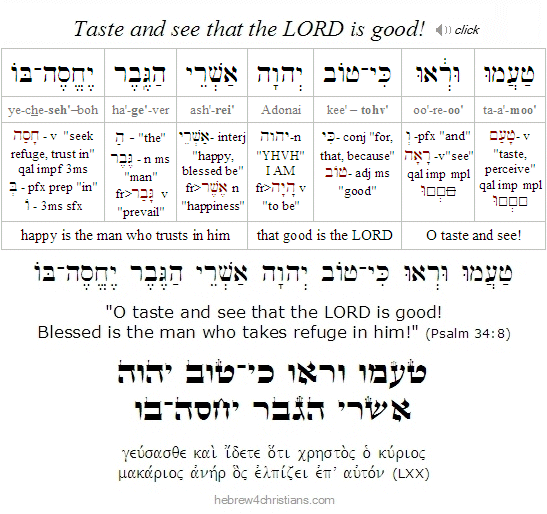 |
Hakarat Tovah - הַכָּרַת-טוֹבָה
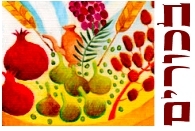
11.23.23 (Kislev 10, 5784) The Hebrew word hakarah (הַכָּרָה) means to recognize or to be conscious. Hakarat tovah means recognizing or being conscious of the good, i.e., gratitude. Hakarat tovah is one of the middot ha-lev (qualities of heart) that should mark the lives of those who are grace-based and focused. Gratitude is the product of joy (χαρα) obtained from the gift of being conscious of God's grace (χαρις).
When the firstfruits (i.e., ha'bikkurim: הביכורים) were offered at the Temple, a declaration of "hakarat tovah" was made that expressed thanks for the good the LORD has done for the Jewish people since the days of Ya'akov (Jacob) to the present hour (Deut. 26:3-11). The declaration was intended to raise consciousness by giving voice to the heart and sanctifying the act of giving. It's not enough to "go through the motions" of a ritual: We must become conscious of the good we have received by engaging the heart's response.
Some of the sages have said that hakarat tovah is the foundation of our service to the LORD, called avodat Adonai (עובדת יהוה). Gratitude is the basic response to being conscious of reality -- the reality of God's unending care and sustenance..... Being ungrateful, or kefuy tovah (כְּפוּי טוֹבָה) is a sign that you are not seeing reality correctly. It is an insincere way of seeing, a spiritual impairment, a sickness of heart, that leads you into darkness...
With all that said, please know that I sincerely appreciate that many of you have shown us kindness and mercy over the years of doing ministry. I am deeply touched by your love. We cannot be here without one another, and you are sustaining us. Thank you. - John
Hebrew Lesson
Psalm 100:4 reading (click):
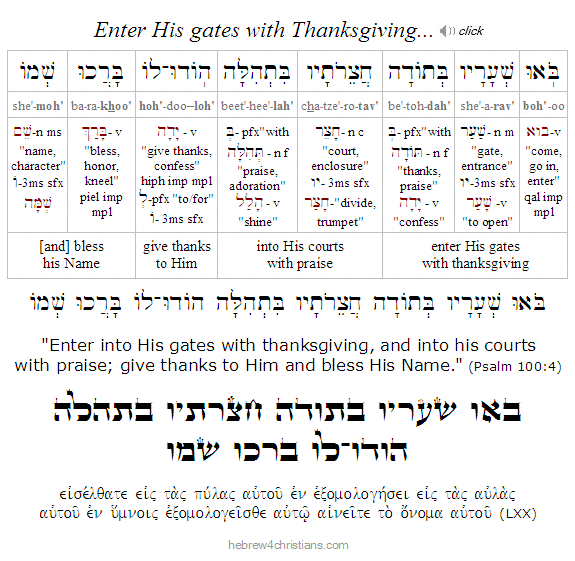 |
Finding Inner Peace...
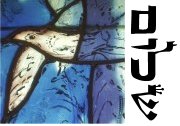
11.23.23 (Kislev 10, 5784) The Hebrew word for peace is shalom (שׁלוֹם), a word that means "wholeness," "completeness," "well-being," and "healing" -- not merely the absence of strife. People often fight with others because they are not made whole within themselves. Just as we cannot really love others until we first learn to love ourselves, so we cannot have peace with others until we first find our own inner healing and peace. Often this means learning to forgive both ourselves and others (including God) so that we can let go of whatever troubles our heart. As we accept ourselves and let go of our fear, we learn to accept others and give up the need to defend ourselves. As Yeshua said, "Blessed (happy) are those who love peace - for they shall be called the children of God" (Matt. 5:9).
אַשְׁרֵי עשֵׂי שָׁלוֹם
כִּי בְּנֵי־אֱלהִים יִקָּרְאוּ
ash·rei · oh·sei · shah·lohm
kee · be·nei · E·loh·heem · yeek·kah·re·oo

"Blessed are those who make peace,
for they shall be called the children of God."
(Matt. 5:9)
Hebrew Lesson
Matthew 5:9 reading (click):
In most English translations we read, "Blessed are the peacemakers, for they shall be called the children of God." Note, however, that the Greek word translated as "peacemakers" (εἰρηνοποιοί) can also mean "those who love peace," that is, those who long for peace and pursue it (see Psalm 34:14). In Jewish ethical teaching, seeking peace is called redifat shalom (רְדִיפַת שָׁלוֹם) and is considered a primary heart quality. Rabbi Hillel is attributed as saying, "Be of the disciples of Aaron, loving peace and pursuing peace" (Pirke Avot 1:2). Before we can hope to make peace among others, however, we must first know inner peace. If we threaten this peace, we rise up against God, and thereby undermine his will in our lives. Those who love peace will be called the children of God.
Peace is the foundation of God's great work of deliverance in our lives. Yeshua is called Sar Shalom (שַׂר־שָׁלוֹם), the "Prince of Peace" (Isa. 9:6), since salvation brings reconciliation (i.e., peace) between God and man (Rom. 5:1) and sets us free from the fear of condemnation. When we walk in the peace of God (שְׁלוֹם הָאֱלהִים) that "surpasses all our understanding," we are empowered to be a blessing to others in your life. "The fruit of righteousness is sown in peace by those who make peace" (James 3:18).
We understand the Torah commandment, "Thou shalt not steal" (לא תִּגְנב) to imply more than being forbidden to steal from others, but also to include the prohibition against stealing from ourselves by failing to practice inner honesty. When we lie to ourselves, we "steal" from the truth, we rationalize what is unjust, and we thereby rob from ourselves the great blessing of inner peace. Indeed, the traditional sages say that every sin essentially constitutes theft from God. For instance, in his discussion of teshuvah (repentance), Maimonides notes that confession of sin is connected with theft (Num. 5:7). Rabbi Yitzchak of Gur asks, "Inasmuch as there are 365 prohibitions in Torah, why does Torah choose to specify the need to confess sin in regard to theft?" He goes on to answer by explaining that if someone borrows something for a specific use, he is not permitted to use it for any other purpose other than that specified, lest he abuse the privilege and "steal the use" of the item. Likewise, God lends the soul the ability to speak, hear, see, and so on, for the sake of living a godly life. If we abuse these things, for example, by using our lips and tongue to speak evil about another, we are using our faculties for a purpose other than God intended, and that constitutes theft. Therefore every sin is a form of theft, an act of "breaking faith with the LORD," and that is why Torah mentions confession of sin in connection with it.
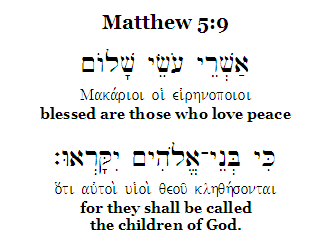 |
 |
Gratitude and Seeing...

[ Happy Thanksgiving, friends! I am grateful to the Lord that you are a part of this ministry... ]
11.23.23 (Kislev 10, 5784) Gratitude is essential to the life of faith... We read in the Torah: "And you shall bless the LORD your God for the good" (Deut. 8:10). Whenever we derive benefit or enjoyment from something we are to bless (i.e., thank) God for his goodness. Indeed the Hebrew term for gratitude is hakarat tovah (הַכָּרַת טוֹבָה), a phrase that means "recognizing the good." The heart looks through the eye, and therefore how we see is ultimately a spiritual decision: "If your eye is "single" (i.e., ἁπλοῦς, sincere, focused)," Yeshua said, "your whole body will be filled with light" (Matt. 6:22). When we see rightly, we are awakened to God's Presence in the little things of life, those small miracles and "signs and wonders" that constantly surround us. The good eye of faith sees hundreds of reasons to bless God for the precious gift of life (1 Cor. 10:31).
"Give thanks to the LORD for He is good; his love endures forever" (Psalm 136:1); "give thanks to the LORD always" (Col. 3:17; Eph. 5:20; 1 Thess. 5:18)... Gratitude is foundational to our lives as followers of Yeshua. Indeed there are really only two prayers we ever offer to God, namely "Help, LORD!" and "Thank you, LORD." Meister Eckhart once remarked that if the only prayer you said in your entire life was, "thank you," that would suffice... Genuine prayer ultimately resolves to an expression of thanks. We are to "praise the Bridge that carries us over" into the Presence and Love of God, and that Bridge is Yeshua our Lord.
The "thank offering" mentioned in the Torah (i.e., zevach ha-todah: זֶבַח הַתּוֹדָד) is also mentioned in the New Testament. In the Book of Hebrews were are instructed to "continually offer up a sacrifice of thanks (זֶבַח תּוֹדָה) to God, that is, the fruit of lips that acknowledge his Name" (Heb. 13:15). It is interesting to note that the Greek verb used to "offer up" (i.e., ἀναφέρω) is used to translate the Hebrew verb "to draw near" (karov) in Torah. In other words, the "offering up of thanks" for the sacrifice of Yeshua functions as "korban" and draws us near to God. Thanking God for his deliverance constitutes "right sacrifices" (זִבְחֵי־צֶדֶק) as we draw near to God in His love (Psalm 4:5; Heb. 7:19).
Hebrew Lesson
Psalm 103:1 Hebrew Reading:
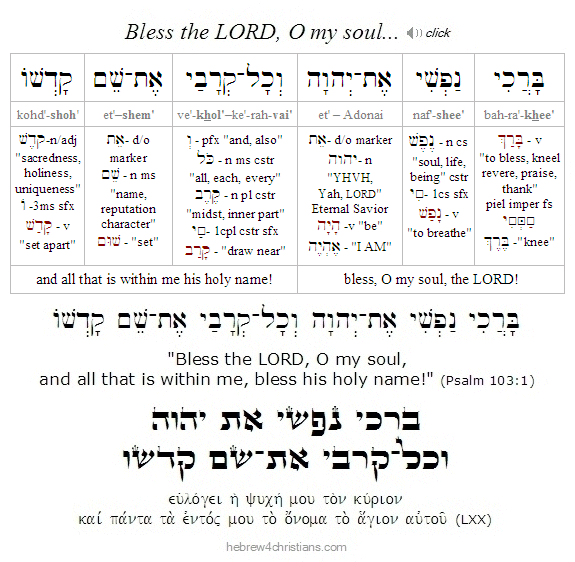 |
God's Pursuing Love...
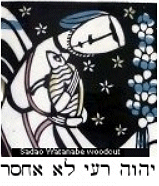
11.22.23 (Kislev 9, 5784) Where it says, "Surely goodness and kindness (טוֹב וָחֶסֶד) shall follow me all the days of my life" (Psalm 23:6), note the Hebrew verb translated "shall follow me" (i.e., יִרְדְּפוּנִי) comes from a root (i.e., radaf: רָדַף) that means "to pursue," as a hunter chases after his prey. In this connection the Baal Shem Tov once asked, "But why the need for pursuit? Does anyone flee from goodness and kindness so that these must pursue him?" And he answered: "Indeed they do. A person may flee from something he thinks is harmful, not knowing that it is heaven-sent and intended for his advantage."
This interesting interpretation suggests that we may try to protect ourselves even at the expense of receiving a blessing. Do we allow fear to rob us of the chance to grow? The sages comment that if we flee from what is good because we mistakenly regard it as evil, we should pray, as David did, that the hidden good should pursue us relentlessly. Amen. As David also prayed: "Who can understand his errors? Cleanse me from secret faults" (Psalm 19:12). The tragedy is that our secret faults often make us our own worst enemy.
At any rate, given the context of this beloved Psalm, it is clear that King David was sure that God's kindness would "hound" him as he made his way through this world - even in the dark places, even in "the valley of the shadow of death" (בְּגֵיא צַלְמָוֶת) - where God's rod and staff would comfort him and direct his way (Psalm 23:4). Amen, thank God for Yeshua our Good Shepherd (ישׁוע הָרוֹעֶה הַטּוֹב שֶׁלָנוּ) who lays down his life for his sheep (John 10:11). Praise God that He came to seek and to save the lost (Luke 19:10).
Hebrew Lesson
Psalm 23:6 Hebrew reading (click):
The Eternal Now...

[ When R' Bunam was lying on his deathbed, his wife wept bitterly. Thereupon he said, "Why are you weeping? All my life has been given me merely that I might learn to die." ]
11.22.23 (Kislev 9, 5784) I've said before that, on a personal level, the "end of the world" is the day you will die and face judgment for your life (Heb. 9:27; Luke 12:2-5; 2 Cor. 5:10; Eccl. 12:14). If you have trusted in Yeshua as your atoning sacrifice and mediator who delivers you from the verdict of the law that is against you, then you will be declared righteous and welcomed into heaven with exceedingly great joy. On the other hand, if you have impugned the grace of God and sought to establish righteousness on your own terms, then you will be judged according to the verdict of the law of God without divine representation given on your behalf in the Messiah...
As for the eschatological question of whether the "end of days" (אַחֲרִית הַיָמִים) is imminent to our generation, we find peace as we consider the Lordship of Yeshua extends over the entire space-time continuum, and that He is sovereign over all possible worlds. God's timing is perfect. After all, the "Great Day of the LORD" is the climactic event of human history - when God "wraps up" the dispensation of human (and demonic) rule over the world to establish the theocratic reign of Messiah in Zion. There is no need to worry about that day's advent, for it is the most prophesied event recorded in the Scriptures.
Meanwhile we are "contemporaneous" with the risen Messiah: His kingdom reign is within us now and we encounter his living presence in prayer. As Kierkegaard once said: "As long as there is a believer, this person, in order to have become that, must have been just as contemporary with Christ's presence as his contemporaries were. This contemporaneity is the condition of faith." We live in the "isness" of the future promise: the great Day approaches yet it is already here, just as we experience our redemption in our hearts today even as we await its ultimate fulfillment.
Consider, then dear friend, the "measure of your days..." Your life in this world will end sooner than you expect, and then what will become of you? Again, I am not here thinking of the end of "the" world, but rather the end of your world - when you will die and face the light of eternity. Today, this moment, you are "on the way," going someplace; your "latter days" are already come upon you... If you are not prepared today, how will you be better prepared tomorrow? How long will you halt between two opinions? Today is the day of salvation, the hour that matters most. Learn to die to the world now, to let go of what presently holds you captive, so that you are free to meet that which forever shall come. Don't put off genuine teshuvah: turn while there is still time. As Jim Elliot once said: "He is no fool who gives what he cannot keep, to gain what he cannot lose." And may God give us mercy to say from the heart: "For me to live is Messiah, and to die is gain" (Phil. 1:21).
Hebrew Lesson
Psalm 90:12 reading (click):
A heart of Gratitude...
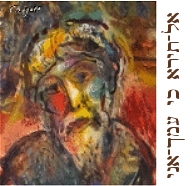
11.21.23 (Kislev 8, 5784) To be thankful for the good things in life is easy, but to be grateful for times of sorrow, hardship, and pain requires wisdom and the earnestness of faith. Such gratitude wells up from the conviction that everything that has brought you to the present moment -- including your wounds, heartaches, and troubles -- is for your good. "To every thing there is a season, and a time to every purpose under the heaven: A time to be born, and a time to die; a time to plant, and a time to harvest that which is planted... A time to weep, and a time to laugh; a time to mourn, and a time to dance" (Eccl. 3:1-4).
In the midst of these inexorable changes arises an inner ache of the soul that searches for meaning, truth, and hope. As it is written:"God has made everything beautiful in its time (אֶת־הַכֹּל עָשָׂה יָפֶה בְעִתּוֹ); He has also put eternity within their hearts, so that no one can find out the work that God does from the beginning to the end" (Eccl. 3:11). While no one can find out the "deep reasons" for why things happened the way they did, the heart of faith trusts that God's plan is good, even though his providence includes times of deep shadows as well as times of comforting light. God makes everything beautiful in its time.
Therefore we are admonished to "count it all joy" when we encounter trials of various kinds, for the testing of our faith produces perseverance. "Blessed is the one who endures temptation, for after he has proven to be genuine, he will receive the crown of life that the Lord promised to those who love him" (James 1:12).
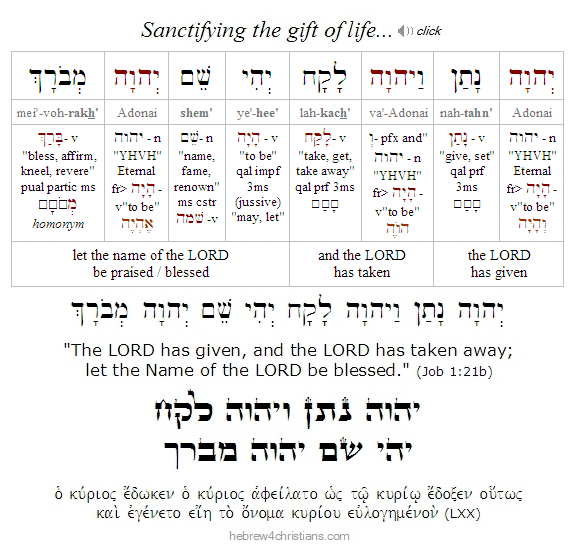 |
Jacob's Great Awakening...
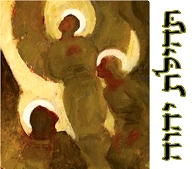
[ Wake up; "for the place whereon thou stand is holy ground" (Exod. 3:5)... ]
11.21.23 (Kislev 8, 5784) In our Torah portion this week (Vayetzei) we read: "Then Jacob awoke from his sleep and said, akhen yesh Adonai ba'makom ha'zeh, ve'anokhi loh yada'ti: 'Surely the LORD is in this place, but I did not know it'" (Gen. 28:16). Jacob had been asleep but was jarred awake. He found himself in awe, sensing the presence of the gateway to heaven. The sages note the grammar here is emphatic, suggesting that Jacob said: "Surely the LORD is in this place -- but am I (וְאָנכִי)? I do not know! (לא יָדָעְתִּי). Jacob had awakened from his dream to realize that he had been dreaming his life away, living in a fantasy world. God is present in this place – but am I? Have I awakened to be present before God?
All religious reality begins with what biblical religion calls the 'fear of God.' It comes when our existence between birth and death becomes incomprehensible and uncanny, when all security is shattered through the mystery. This is not the relative mystery of that which is inaccessible only to the present state of human knowledge and is hence in principle discoverable. It is the essential mystery, the inscrutableness of which belongs to its very nature... Through this dark gate (which is only a gate and not, as some theologians believe, a dwelling) the believing man steps forth into the everyday which is henceforth hallowed as the place in which he has to live with the mystery. He steps forth directed and assigned to the concrete, contextual situations of his existence. That he henceforth accepts the situation as given him by the Giver is what Biblical religion calls the 'fear of God.' - Martin Buber, Eclipse of God
An honest theology must find a place for mystery, for "seeing through a glass darkly," and for the apprehension of awe and wonder. Philosophy (not science) asks the question: "Why is there something rather than nothing at all?" This is a question regarding the "why" of existence itself, the profusion of life as it surrounds us. Is there a reason for existence, a purpose, a direction, a radical meaning? Faith "sees what is invisible" by experiencing reality as revelation: the mystery of life points beyond itself to God's creative and sustaining presence: "In Him we live and move and have our being" (Acts 17:28; Rom. 1:20). Cut open a seed and what do you see, but "the hidden power that makes the fruit grow toward the sky." Likewise what is most real about us is shrouded in profound mystery. We are finite, our lives are short and bounded by darkness, yet we sense God's Spirit, the hidden power that upholds our souls, and we trust that we will indeed live forever because of God's love. As theologian Paul Tillich wrote: "The question of being is not the question of any specific being, its existence and nature, but it is the question of what it means to be. It is the simplest, most profound, and absolutely inexhaustible question – the question of what it means to say something is. The word "is" hides the riddle of all riddles, the mystery that there is anything at all." Though we might try to explain God by way of logic and doctrine, in the end it is the mystery of "Messiah in you - the hope of glory."
When God said, "Let there be light, and there was light" (Gen. 1:3), He seemed to put on light as a robe of the Divine Majesty and Kingship: He wrapped Himself with radiance as a tallit gadol... Da lifnei mi attah omed (דַּע לִפְנֵי מִי אַתָּה עוֹמֵד) – "Know before whom you stand." The whole earth is lit up with God's glory, and every bush of the field is aflame before us -- if we have eyes to see (Isa. 6:3). May it please the LORD to open our spiritual eyes so that we can behold more of His glory and majesty in this hour... Amen.
Hebrew Lesson
Gen. 28:16b Hebrew Reading:
The Ladder of Truth...
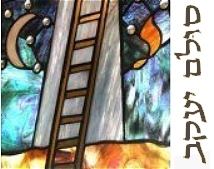
11.21.23 (Kislev 8, 5784) The Hebrew idea of "truth" (i.e., emet: אֱמֶת) is richer than accurate factual description, since it also contains moral implications: what is true is also right, good, reliable (honest), beautiful, and sacred. The Hebrew word itself comes from a verb (aman) that means to "confirm" or establish. The noun emunah (i.e, אֱמוּנָה, "faithfulness" or "trustworthiness") comes from this same root, as does the familiar word "amen," which expresses the will to live by what is ratified, since truth that is not lived is not truth. Indeed speaking the truth (dibbur emet) is considered foundational to moral life, as it says: "Speak the truth (דַּבְּרוּ אֱמֶת) to one another; render true and perfect justice in your gates" (Zech. 8:16). Yeshua repeatedly said, "Amen, Amen I say to you...." throughout his ministry to stress the reliability and certainty of God's truth (Matt. 5:18, 26, etc.). Indeed, He is called "the Amen, the faithful and true witness" (Rev. 3:14).
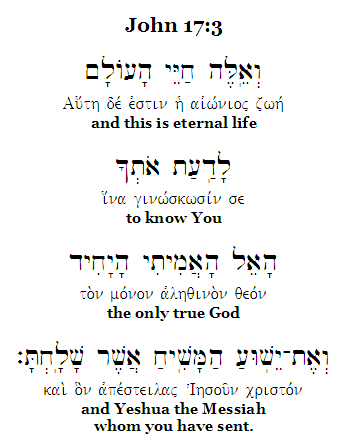 |
The ancient Greek word translated "truth" is aletheia (ἀλήθεια), a compound formed from an alpha prefix (α-) meaning "not," and lethei (λήθη), meaning "forgetfulness." Greek scholars say the word lethei itself derives from the verb lanthano (λανθάνω), which means "to be hidden," so the general idea is that a-letheia (i.e., truth) is non-concealment, non-hiddenness, or (put positively) revelation or disclosure. Thus the word of Yeshua - His message, logos (λόγος), revelation, and presence - is both "unforgettable" and "irrepressible." Yeshua is the Unforgettable One that is manifest as the express Word of God (דְּבַר הָאֱלהִים). He is the Light of the world (אוֹר הָעוֹלָם) who imparts the "light of life" (John 8:12). Though God's message can be supressed by evil and darkened thinking, the truth is regarded as self-evident and full of intuitive validation (see Rom. 1:18-21).
Note that the LXX (i.e., the ancient Greek translation of the Torah and OT otherwise known as the "Septuagint") dates from the time of the philosopher Plato, though of course the Hebrew text dates back to the time of Moses (13th century BC) and even earlier. About 300 BC, "Theophrastus," a student of Aristotle, wrote of the Jews that 'being philosophers by race, they converse with each other about the Divine." Abraham, who dates from about 2,000 BC, was the first avowed monotheist who openly repudiated the polytheism and idolatry of ancient Ugaritic culture (Abraham long predates the rise of Hinduism and the animistic hymns of the Vedas and their priestly commentary found in the Upanishads by a thousand years). Similarly, both King David and his son Solomon (10th century BC) wrote "existential" works of philosophy, predating the modern world by nearly 3,000 years...
Regarding Jacob's famous dream, the sages ask: "When is the man lower on the ladder higher than the man who is higher on the ladder? When the lower one is climbing up and other higher one is descending down..." Or as Kierkegaard put it, the way is "how." How you focus determines the direction you are taking. So where is your focus? Are you looking to God for help, for strength, and the ability to draw close to him, or are you looking to your own strength, direction, and will?
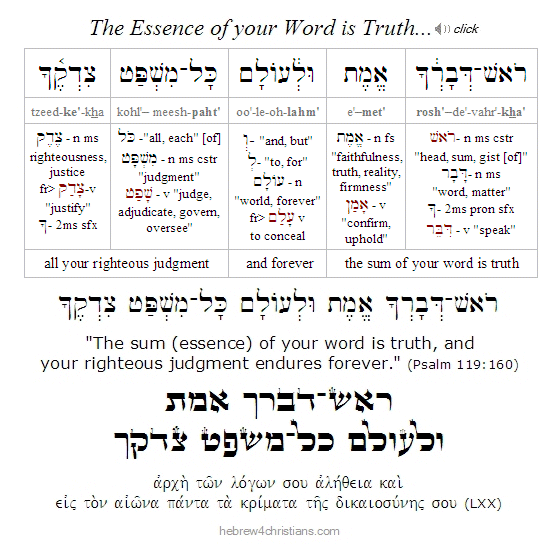 |
The Cost of Discipleship...
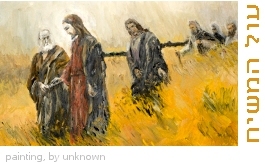
11.21.23 (Kislev 8, 5784) When we hear the phrase, "the cost of discipleship," we might take a deep breath and think of the possibility of experiencing persecution, troubles, or even martyrdom as the price for following the Lord. Or we may imagine denying ourselves of all worldly things, taking a vow of poverty, and practicing rigorous asceticism. However, there is another aspect to "counting the cost" that Yeshua gave that we would do well to heed.
"The kingdom of heaven is like treasure hidden in a field. When a man found it, he hid it again, and then in his joy went and sold all he had and bought that field. Again, the kingdom of heaven is like a merchant looking for fine pearls. When he found one of great value, he went away and sold everything he had and bought it" (Matt. 13:44-45).
Notice that in these two short parables, neither the man who found the hidden treasure nor the merchant who found the pearl of great value were troubled or concerned about the cost involved. Indeed, they were so thrilled over what they had found that they were glad to sell everything they had to take hold of what mattered most to them. If there were any sacrifice involved, it was a cheerful one given to attain an exceedingly great and wonderful gain. In that sense, discipleship is a form of teshuvah: it's focus is not on turning away from sin as much as it is on turning toward the LORD for blessing and life (and indeed, it is only after we truly turn toward the LORD for life that we are able to turn away from sin).
And that's the secret passion of a disciple of Yeshua, after all. The prospect of knowing his heart outweighs all other passions and concerns. Amen, His love is incomparably beautiful and precious; it is "more to be desired than gold, yea, than much fine gold;" it is "sweeter than honey and the honeycomb" (Psalm 19:10).
The cost of discipleship is nothing to be compared with the blessedness of relationship with the Savior. Yeshua is the "hidden treasure" and the "pearl of great value," the heart's deepest longing and the utmost blessing of life. Amen.
Despite the Darkness...

11.20.23 (Kislev 7, 5784) It is dangerous to assume that someone who is walking in spiritual darkness must necessarily be outside of God's will, or that such a person is being punished by God. That sort of thinking, after all, was behind the old "karma-based" theology delivered to Job by his "religious" friends...
On the contrary, as Charles Spurgeon reminds us, "Spiritual darkness of any sort is to be avoided and not desired; and yet, surprising as it may seem to be, it is a fact that some of the best of God's people frequently walk in darkness; some of them are wrapped in a sevenfold gloom at times, and to them neither sun, nor moon, nor star appears. As the pastor of a large church, I have to observe a great variety of experiences, and I note that some of whom I greatly love and esteem, who are, in my judgment, among the very choicest of God's people, nevertheless, travel most of the way to heaven by night."
Indeed, how can God "wipe away our tears" if we never allow ourselves to cry, to feel pain? Despite the troubles of life in this world, faith "hopes against hope" that the LORD God will bring everlasting healing to us all; it is a "good fight," but it is a fight nonetheless. Yeshua himself entered into darkness for our sake, and he sometimes has his followers go there, too. As it says, "Let him who walks in darkness and has no light trust in the Name of the LORD (יִבְטַח בְּשֵׁם יְהוָה) and rely on his God."
Hebrew Lesson
Isaiah 50:10 reading (click):
Stairway to Heaven....
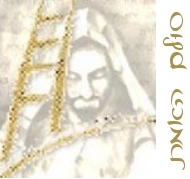
[ The following is related to this week's Torah reading, parashat Vayetzei... ]
11.20.23 (Kislev 7, 5784) The revelation at Sinai and Jacob's vision of the ladder share something in common. Just as Yeshua was the "Voice of the Living God (קוֹל אֱלהִים חַיִּים) speaking (davar) from the midst of the fire" at Sinai (Deut. 5:26), so He was the Ascended LORD standing above the ladder speaking the word of promise (Gen. 28:12-15). In this connection we note that the words for "ladder," (i.e., sullam: סֻלָּם), "voice" (i.e., kol: קל), and "Sinai" (סִינָי) have the same numerical value, which suggests a connection between the two great visions. Yeshua is the Ladder to God, the means by which the Living Torah both descends and ascends for the sake of our deliverance (John 1:51). The "ladder of Sinai" is not meant for us to ascend but rather is for the LORD our Savior to descend and ascend on our behalf. Yeshua is the way, the truth, and the life (הדֶּרֶךְ וְהָאֱמֶת וְהַחַיִּים): no one can draw near to the Heavenly Father apart from Him (John 14:6).
Hebrew Lesson
Proverbs 30:4 reading (click):
Forget not His Love...
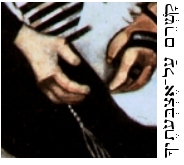
[ "We ought to give the more earnest heed to the things that we have heard, lest at any time we should drift away..." - Hebrews 2:1 ]
11.20.23 (Kislev 7, 5784) If something is worth truly saying, it is worth saying more than once... We learn by repetition. Consider how Yeshua retold his parables and messages throughout his ministry. God knows we are dull of heart and full of ourselves and therefore he says: וזכרת את־יהוה אלהיך- "Now remember the LORD your God!" and "Take heed to yourself, and keep your soul diligently, lest you forget the things that your eyes have seen, and lest they depart from your heart all the days of your life" (Deut. 4:9). Likewise the Shema teaches us to rehearse Torah "diligently" - again and again - so that our lives are imbued in its language and its significance (Deut. 6:4-9). When we sit in our house, when we walk by the way, when we lie down, and when we rise up -- in every place and at every time -- we are to remember the truth and thereby walk before the Living God.
"Take heed to yourself..." This warning underscores the danger we face of "forgetting" God, of losing sight of the truth of reality, and thereby lapsing into the realm of the profane... We must, therefore, foster within us a state of ongoing vigilance that regards the greatness of God in the midst of our daily lives. "Give us this day our daily bread." Your life, your being, and your very existence come from God, but forgetting this leads to "tohu va'vahu," a life of vanity and chaos. Therefore practice God's presence; believe to see the goodness of the LORD in the land of the living. The language God uses bespeaks his imperative passion for us: "Do not forget me! Keep your heart open to my Presence! Know me in all your ways..."
Hebrew Lesson
Deut. 4:9a reading (click):
Everlasting Love...
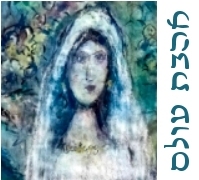
[ The following is related to this week's Torah reading, parashat Vayetzei... ]
11.20.23 (Kislev 7, 5784) Recall that when Isaac "was old and his eyes were dimmed from seeing," he thought to bless his son Esau as the family heir before he died (Gen. 27:1-4). When Rebekah learned of his intention, however, she decided to take matters into her own hands by tricking her husband into conferring the blessing upon his son Jacob instead of Esau. Rebekah must have felt justified in her actions; indeed, had not the LORD himself proclaimed that "the elder would serve the younger" before the twins were born (Gen. 25:23)?
Regarding his role in Rebekah's scheme, Jacob was left with a terrible dilemma: Either he had to defy his mother or to deceive his father. To complicate matters, Rebekah realized that Isaac would discover the charade after the fact, though she may have reasoned that her ruse exposed his gullibility regarding the choice of Esau to be the chosen heir. It was not a real deception, then, but an object lesson for Isaac to wake up before it was too late! Rebekah's plan was to "open the eyes" of her blind husband, revealing to him that he had been guilty of sacrificing the righteous son Jacob for the sake of deceptive Esau.
The duplicity proved to be tragic, however, for everyone involved. Jacob desperately wanted the blessing of his father, but he agreed to get it through false pretenses. "Come close and kiss me my son..." (Gen. 27:26). This was Jacob's deep desire, and yet after "grappling" the blessing from his father he ironically lost his father's embrace. Indeed, Jacob lost not only his father's embrace, but his mother's as well (after fleeing to Haran, Jacob never saw his mother again). Moreover, Jacob's pathetic attempt to "be Esau" severed any hope of a relationship with his twin brother, who afterwards became his sworn enemy...
So it all went down. Isaac conferred the blessing to Jacob, and Esau was understandably enraged over his brother's (and his mother's) rejection of him as the chosen heir of the godly family and steward of the divine promise given to Abraham. When she overheard Esau's plan to exact revenge for his betrayal, however, Rebekah sought to send Jacob to her brother Laban who lived in the city of Haran, some 500 miles northeast of Canaan. To his credit, Isaac finally listened to his wife and reaffirmed the blessing over Jacob (Gen. 28:1-5). And Rebekah's faith in the prophecy was finally vindicated. Nevertheless, as Jacob ran away from his family home in Beersheva, he was confused and uncertain, though God mercifully intervened by giving him the vision of the Ladder and then ratifying the covenant blessing of Abraham and Isaac with him at Bethel (Gen. 28:11-22).
Jacob then continued his journey to Haran. When he finally arrived there, he went to the gathering place of the city well to learn where his uncle Laban (i.e., the grandson of Abraham's brother Nahor) lived and to inquire of his welfare. When the shepherds there told him that Laban was well, they then pointed to a young woman and said "and here comes his daughter Rachel with the sheep" (Gen. 29:6). Jacob then rolled away the stone from the mouth of the well and began watering Rachel's flock. He then excitedly informed her that he was her close relative, her aunt Rebekah's son, who had come from the land of Canaan.
So prophetically and providentially, when Jacob first arrived in Haran he beheld beautiful Rachel who welcomed him in his distress and embodied his hope. It was love at first sight for him. Rachel represented the promise of his blessing to become the patriarch of a multitude of people, and that through his offspring all the families of the earth would be blessed (Gen. 28:14). Because of this, Jacob made haste and soon bartered with his uncle Laban to work seven years for the right to marry his daughter. "So Jacob served seven years for Rachel, but they seemed to him but a few days because of the love he had for her" (Gen. 29:20).
The sages marvel over the perseverance that enabled Jacob to wait seven full years before marrying Rachel, and they ascribe his fortitude to divine grace that made "space shrink and time fly" (Sanhedrin 95b). By this they meant that Jacob's great love overcame the distance of time and space, that is, the sense of the exterior world, something which Jewish philosopher Martin Buber called the world of "It." The world of "It" is objective, outside of you, existing in its own independent modality. The world of "Thou," on the other hand, is that of personal relationship and inwardness, a realm distinct from the world of "It" with its objective categories and relationships. In other words, Jacob's great love made time "stand still" and drew Rachel close to him, despite the passing of years and the distance that separated them. The "math" of this passion made seven years - over 2,500 sunrises and sunsets - seem "as a few days," since the relationship they shared did away with physical and temporal barriers that separated them. Likewise we can endure the "It" of this world and regard it as quickly passing, "as a few days," when we are in loving "I-Thou" relationship with the Lord and with one another. We lose sight of worry, stress, and isolation, and rise above our present circumstances in our communion and in our hope. "For a thousand years in your sight are but as yesterday when it is past, or as a watch in the night" (Psalm 90:4).
When we feel afraid or lonely, the world looms large, threatening, and cold. We feel trapped in its contours and alienated from our own hearts. On the other hand, when we befriend others and engage in honest conversation with them - when "two or three are gathered in my name" - the miracle occurs and the Lord is present in our midst - timelessly alive, full of welcoming grace, kindness, and love (Matt. 18:20). Moreover, since the Lord is always with us, whenever we sincerely turn to Him we are drawn into his love. As we open our hearts to him, as we engage him in trust, we lose sight of the outer world that confines and defines us, and we find our place in his love and in his blessing.
Hebrew Lesson
Jeremiah 31:3b reading (click):
Truth sets you free...
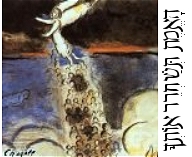
11.19.23 (Kislev 6, 5784) When Yeshua said that the truth would "set you free" (ἐλευθερώσει), he was referring to the acceptance of the Witness of Divine Reality (i.e., the Word, Breath, Spirit, Voice, Message, Meaning, and Love of God) that delivers you from the lies we habitually tell ourselves (or that we receive from others). If you "persevere in my word" (μείνητε ἐν τῷ λόγῳ τῷ ἐμῷ) he said, "then you are my disciples indeed, and you will know the truth, and the truth will set you free" (ἡ ἀλήθεια ἐλευθερώσει ὑμᾶς, John 8:31-32). In other words, as we identify with his vision and redemptive mission, we will "be free indeed" from the tohu va'vohu (Gen. 1:2) – the "chaos and unreality" – that inescapably besets the way of the lie... We will be delivered from vanity and delusions of this world and its diseased affections; we will be set free from the need to justify ourselves by religion (perfectionism); we will no longer crave other people's approval; we will not be moved by the crowd and its pressures; we will find courage to face our challenges without resorting to escapism; and we will learn how to experience peace even when we encounter frustrations.
Despite our daily struggles and tests, we will be released from bondage to anger and resentment as we yield our will in complete trust that God is indeed working all things together for our ultimate good (Rom. 8:28). Genuine freedom is not an "accidental property" of the heart, depending on "luck" or "fortune," but instead is a decision to believe in the Reality of the salvation of God given in Yeshua our LORD, even if we may soemtimes feel "weltschmerz," or the sorrow of despair.
Hebrew Lesson
Psalm 119:142 reading (click):
Parashat Vayetzei - וַיֵּצֵא

11.19.23 (Kislev 6, 5784) Our Torah for this week (i.e., parashat Vayetzei) includes Jacob's dream of a ladder (i.e., sullam: סֻלָּם) extending from earth to heaven, with the angels of God ascending and descending, and the LORD Himself standing above assuring Jacob of his safe return to the land he had fled. Jacob awoke and responded to the dream with awe: "Surely the LORD is in this place (בַּמָּקוֹם הַזֶּה), and I did not know it." And he was afraid and said, "How awesome is this place! This is none other than the house of God, and this is the gate of heaven." And he called the name of that place Bethel (בֵּית־אֵל) i.e., "the house of God."
The sages interpret ha-makom (הַמָּקוֹם), literally "the place" that Jacob saw, as Mount Moriah, the exact location where Jacob's father Isaac was bound as the "sacrificed seed" and which later became the site of the Holy Temple. Indeed the word makom comes from a verb (קוּם) meaning "to arise," suggesting resurrection and ascension. In later Rabbinical thought Ha-Makom became synonymous with the Name or Presence of God Himself ("God is the place of the world, but the world is not God's only place").
Yeshua referred to Jacob's dream when he said, "Truly, truly, I say to you, you will see heaven opened, and the angels of God ascending and descending on the Son of Man" (John 1:51). Just as Jacob saw the ladder ascending to heaven with the angels of God ascending and descending upon it, so Yeshua told Nathanael that He was the Ladder to God, the sha'ar ha-shamayim (שַׁעַר הַשָּׁמָיִם) - the way into heaven (John 14:6). Indeed, Yeshua is the true Place or "house of God" and its Chief Cornerstone (Rosh Pinnah, Matt. 21:42). The LORD is the resurrection and life, the One who prepares a place for you (John 11:25; 14:2).
Surrendering to God...
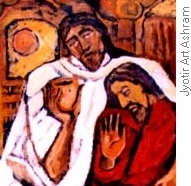
11.17.23 (Kislev 4, 5784) "Father, if you are willing, remove this cup from me; nevertheless, not my will, but thine be done" (Luke 22:42). This is the consummate expression of a heart fully surrendered to the care of God, because there is nothing more common than the impulse for self-preservation, and yet here we behold the sacrifice of Yeshua's very soul (מְסִירַת הַנֶפֶשׁ יֵשׁוּע) as he willingly offered himself up to suffer and die an agonizing death upon the cross - all in loving deference to his Father's will.
Surrendering your will to the care of God is the essence of "bittachon" (בִּטָחוֹן), that is, trusting that God is in control of your life and will personally care for you, no matter what. Some people have an evil will that does not tolerate any contradiction or opposition; others attempt to surrender to God but their impatience belies their willingness to do so. The truly good will is simple and forthright, seeking the "beauty of the LORD" (Psalm 27:4). When hindered, the baal bittachon (trusting soul) says from his innmost depths, "I am content with whatever you give to me: Thy will be done."
We sometimes think we know God's will us, yet we find ourselves stymied or blocked in our doing so. In every case, however, we must seek first God's will and submit him (Matt. 6:33). The Lord may thwart even our best intentions to reveal his surpassing wisdom regarding the matter, however. For instance, recall Peter's appeal to the Lord to turn away from the way of the cross (Matt. 16:21-23). Yeshua minced no words, saying to him: "Get behind me, Satan! You are a hindrance to me. For you are not setting your mind on the things of God, but on the things of man." And then he turned to the other disciples present and said to them: "If anyone wants to be my follower, let him disown himself and take up his cross and follow me. For whoever wills to save his life will lose it, but whoever loses his life for my sake will find it."
Because Peter did not realize the redemptive mission of Yeshua as the "Lamb of God" who would suffer, be killed, and ascend from the dead, he impulsively began to rebuke Yeshua by judging that it would be better for Yeshua to avoid such trouble from the leaders of Israel by taking a different approach, perhaps by attempting to "win them over" to the idea that he was Israel's promised Messiah. We are not sure what Peter was thinking, of course, but it is likely that he strongly believed - mistakenly enough - that what he esteemed as good was God's will... Peter needed to be humbled and to trust that God's unfathomable plan was best. He was faced with the decision whether he would crucify his own will or to lose himself through self-deception. Yeshua promised that those who were willing to surrender to him would find salvation and peace as they walked in trust of God's love and care for them. Amen.
Hebrew Lesson
Jeremiah 17:7 reading (click):
God's Sovereign Power....
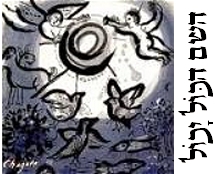
11.17.23 (Kislev 4, 5784) Refuse worldly disinformation and propaganda to define what reality is for you... Though you may feel disheartened and exasperated over the state of the evil political schemes of human beings, remember that the light of our God shines forth in resplendent glory; his power is unrivaled, and his love endures forever... Our God works all things together for good; "indeed, the LORD of all power (יהוה צבאות) has a plan, and who can possibly frustrate it? His hand is ready to strike, and who can possibly stop it?" (Isa. 14:27). Amen, as it is written: "There is no wisdom nor understanding nor counsel that can prevail against the LORD" (Prov. 21:30).
So take heart: be strong and of good courage. Do not be afraid even if an army encamps against you; be confident even though war rises in this hour (Psalm 27:3). Walk in the Light of God's Presence and be confident of his blessing. Do not be afraid and do not be dismayed, for the Lord your God is with you wherever you go!
Hebrew Lesson
Proverbs 21:30 reading with commentary (click):
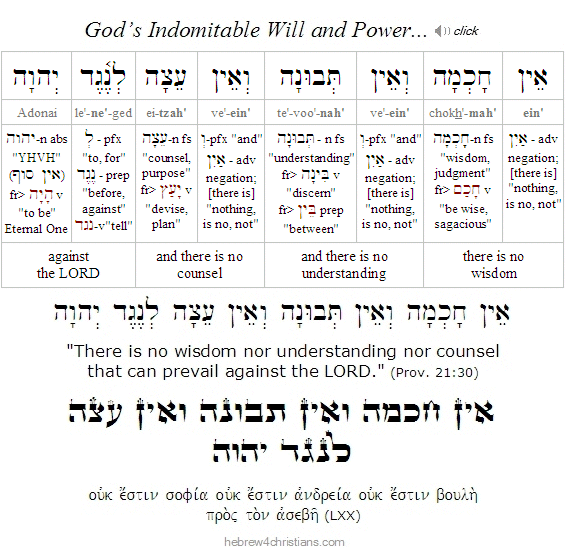 |
Thanksgiving and Sukkot...
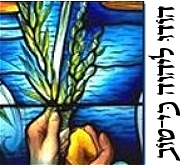
[ Thanksgiving Day holiday is on Thursday, November 23rd this year... ]
11.17.23 (Kislev 4, 5784) The American holiday of Thanksgiving (חַג הַהוֹדָיָה) likely has its roots in the Jewish tradition of giving thanks to God, and some historians believe that the early "Pilgrims" actually derived the idea for the holiday from the Biblical festival of Sukkot (i.e., "the feast of Tabernacles").
Before fleeing to the "New World," the Pilgrims lived for a decade among the Sephardic Jews in Holland, since Holland was considered a safe haven from religious persecution at the time. Since the Pilgrims were devout Calvinists and Puritans, their religious idealism led them to regard themselves as "new Israel," and it is likely that they learned that Sukkot commemorated the people of Israel's deliverance from their religious persecution in ancient Egypt at that time. After they emigrated to the "Promised Land" of America, it is not surprising that these Pilgrims may have chosen the festival of Sukkot as the paradigm for their own celebration. As the Torah commands: "Celebrate the feast so that your generations may know that I made the people of Israel dwell in booths when I brought them out of the land of Egypt: I am the LORD your God" (Lev. 23:39-43). The devout Pilgrims regarded their perilous journey to the new world as a type of "Exodus event" and therefore sought a Biblical holiday to commemorate their safe arrival in a land full of new promise...
It is interesting to note that the Hebrew word for "turkey" is tarnegol hodu (תַּרְנְגוֹל הוֹדו), literally, "Indian chicken," which is often shortened to hodu (הוֹדוּ). It is a happy coincidence that we customarily eat turkey on Thanksgiving, and this reminds us of the "thanks" connection: "Give thanks (hodu) to the Lord for he is good," for His love endures forever."
הודו ליהוה כי־טוב
כי לעולם חסדו
"Give thanks to the LORD for He is good;
for His love endures forever."
(Psalm 136:1)

Hebrew Lesson
Psalm 136:1 Hebrew Reading:
Note: For more on this subject, see "Thanksgiving and Sukkot."
Resisting Ungodly Fears...

11.16.23 (Kislev 3, 5784) The devil wants us to be afraid, and indeed, inciting fear is the primary weapon he uses against us... The devil understands that fear profoundly affects the way the human brain processes images and messages: Fear colors the way we see and hear things. And since the mind and body are intricately interconnected, fear is the root cause of many physiological problems such as heart disease, high blood pressure, clinical depression, and other ailments. Left unchecked, fear can be deadly...
Most of our negative emotions come from fearful thoughts, including anger, frustration, and rage. On a spiritual level, fear and worry can cause people to question God's love, to doubt His promises, and so on. The devil knows that frightening people causes them to be unsettled, off-balance, and therefore vulnerable to all sorts of sickness, manipulation, and deception. Living in fear is a form of slavery (Heb. 2:15).
Logicians call illegitimate appeals to fear argumentum ad baculum, or the "appeal to the stick." When someone plays on your fears, it is wise to discern whether there is any basis in reality for the supposed threat, or if the appeal is simply a rhetorical scare tactic intended to persuade (coerce) you to accept some sort of conclusion. Unscrupulous people such as advertisers, politicians, dictators, community organizers, social activists, and so on, regularly use fear to manipulate public opinion, of course, and they are only too glad to tell you exactly what you should fear. They are delighted to prey upon your anxieties and then offer you their supposed "remedy." You know whom they serve, friends...
The war for truth began in the Garden of Eden, when Satan lied to Eve by saying that she would not die if she disobeyed God (Gen. 3:4). Satan cunningly played on Eve's fear of being deceived to persuade her to disobey. Fear, then, is the emotional center of sin and the opposite of faith. The fearful are referred to as the "unbelieving" and those who "love and make a lie" (Rev. 21:8, 22:15).
God repeatedly tells us not to be afraid – not of man, nor of war, nor of tribulation, nor of various plagues, yea, nor even of death itself (Rom. 8:35-39). Indeed, one of the most frequently occurring commandments in Scripture is simply al-tirah, "Be not afraid." That's because, in light of what is ultimately real, fearing anything other than the LORD God Almighty, the Creator, Judge, and King over all is an expression of unbelief. The fearful are referred to as the "unbelieving" and those who "love and make a lie" (Rev. 21:8, 22:15). We are forbidden to fear anything other than God (and by extension, our own faithlessness and sin). If we have no fear of God, then that truly is a fearful condition of soul.
We overcome ungodly fear by wholeheartedly trusting that the LORD for salvation. "I honor those that honor me," says the LORD, yet "how can you believe, when you receive glory from one another and do not seek the glory that comes from the only God?" (John 5:44). So what do you fear? Worldly loss? Sickness? Death? Yeshua gives us his answer: "I tell you, my friends, do not fear those who kill the body, and after that have nothing more that they can do. But I will warn you whom you should fear: Fear the one who, after the killing, has authority to throw you into hell. Yes, I tell you, fear him!" (Luke 12:4-5). If you are fearing man and his evil schemes, mandates, etc. turn to the Lord and confess your faithlessness. God saves us from our fears (Psalm 34:4, 2 Tim. 1:7). When we trust that God personally cares for us, we find strength and the resolve to face life without ungodly fear.
Hebrew Lesson
Psalm 34:4 reading (click):
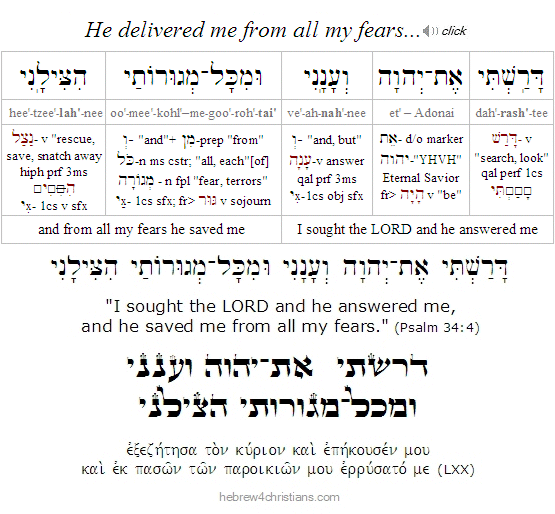 |
Two Blessings for Jacob...

[ The following is related to this week's Torah reading, parashat Toldot... ]
11.15.23 (Kislev 2, 5784) When we think of Jacob as a young man, we tend to recall the dramatic episode when he disguised himself as Esau to "steal" the blessing from his father Isaac. In our Torah reading for this week, however, we note that Jacob actually received two blessings from his father. The first blessing was given to a disguised Jacob and it focused on material blessings: the "dew of heaven," the "fatness of the earth," "plenty of grain and wine," political power and hegemony (Gen. 27:28-29), whereas the second blessing was given to an undisguised Jacob and it focused on his role as God's chosen patriarch of the people of Israel (Gen. 28:3-4). The difference between these blessings turned on Isaac's restored vision. His first blessing was addressed to the character of Esau as his "natural choice," whereas his second blessing looked beyond mere appearances to behold the vision that was originally given to his father Abraham:
וְאֵל שַׁדַּי יְבָרֵךְ אתְךָ
וְיַפְרְךָ וְיַרְבֶּךָ וְהָיִיתָ לִקְהַל עַמִּים
וְיִתֶּן־לְךָ אֶת־בִּרְכַּת אַבְרָהָם
לְךָ וּלְזַרְעֲךָ אִתָּךְ
ve·el · Shad·dai · ye·vah·rekh · oht·kha
ve·yaf'·re·kha · ve·yar·be'·kha · ve·ha·yee'·ta · leek·hal · a·meem
ve·yee·ten · le·kha · et · beer·kaht · av·rah·hahm
le·kha · ool·zar·a·kha · ee·takh

"Now may El Shaddai bless you,
make you fruitful and multiply you so you become an assembly of peoples.
And may He grant the blessing of Abraham
to you and your offspring"
(Gen. 28:3-4)

- Isaac's second blessing to Jacob
In a sense, the self-effacing, disciplined, and strong-willed Isaac abandoned his "natural vision" that spught to install Esau as the next patriarch -- despite the objection from his faithful wife Rebekah -- by finally surrendering to the vision of his father Abraham. Isaac's entire life was a sort of overreaction to his father - an "antithesis to Abraham's thesis." By choosing to bless Jacob a second time -- this time with his eyes wide open -- Isaac revealed that he had finally accepted the grace of God that was revealed to his father Abraham.
Recall also that after Esau had discovered that the blessing was given to Jacob, he lamented and pleaded with his father to bestow upon him a blessing as well. It is interesting to note that the "residual" blessing that Isaac gave to Esau was the exact inverse of that given to Jacob: the "fatness of the earth" was put before the "dew of heaven" (compare Gen. 27:39 with Gen. 27:28), inicating that receiving sustenance from heaven is of greater value than finding earthly prosperity. And indeed, Jacob was "blessed with earthly trouble" his whole life, which caused him to rely on the "dew from heaven," whereas Esau was "blessed" with prosperity (and trouble) that came from trafficking in this world. Regarding Esau it may aptly be said: "Be careful what you wish for -- you just might get it!" (Heb. 12:17).
Hebrew Lesson
Genesis 28:3 reading (click):
Note: Isaac was 60 years old when his two sons were born (Gen. 25:24-26), and according to Jewish tradition, Jacob and Esau were 63 years old at the time of the blessings (Yevamot 6a), making Isaac 123 years old at the time. He later died at the age of 180 (Gen. 35:28-29), making him the longest living of the three patriarchs. The Talmud further states that Jacob first fled to the School of Shem (i.e., Malki-Tzedek) before proceeding to Padan Aram, so that he actually arrived at Laban's home when he was 77 years old.
Broken and Remade...

[ The following entry is related to this week's Torah reading, parashat Toldot... ]
11.15.23 (Kislev 2, 5784) "See to it that no one fails to obtain the grace of God; that no root of bitterness (שׁרֶשׁ פּרֶה) springs up and causes trouble, and by it many become defiled; that no one is immoral or profane like Esau, who sold his birthright for a single meal. For you know that afterward, when he desired to inherit the blessing, he was rejected, for he found no chance to repent, though he sought it (the blessing) with tears" (Heb. 12:15-17; Gen. 27:38). The LORD says, "my people have committed two evils: they have forsaken Me, the fountain of living waters (מְקוֹר מַיִם חַיִּים), and hewed out cisterns for themselves, broken cisterns that can hold no water" (Jer. 2:13). Spiritually speaking, there are two basic sorts of breaking. One is to be broken by the inevitable sin and ruin of this world, and the other is to be made lev-nishbar (לֵב־נִשְׁבָּר), a broken heart, before the LORD. The former breaking comes from the vain attempt to find life in the broken vessels of this world, and "repentance" is expressed as remorse over perceived temporal loss. This sorrow eventually leads the soul to death (2 Cor. 7:10). To be inwardly broken, on the other hand, requires mourning over your life and returning to God for deliverance (Matt. 5:4). In hunger and thirst for God's righteousness the soul finds eternal satisfaction, since God alone provides the vessel of "living water" we need to live (John 4:14; 7:38). We all must drink from God's fountain of life (מְקוֹר חַיִּים), lest we suffer spiritual dehydration and death....
Are you haunted by an inner ache for love, joy, peace, and life? "Blessed are those who hunger and thirst for righteousness, for they shall be satisfied" (Matt. 5:6). Our inner poverty and need is a disguised grace; our desire for healing reveals the Spirit's invitation. Faith begins with the recognition of our need, since only then will we come to Yeshua for the "Bread of Life" (לֶחֶם הַחַיִּים) and the "Living Water" (מַיִם חַיִּים).
Everything we truly need is found in him, though we must reach out in faith: "For without faith (אֱמוּנָה) it is impossible to please him, for whoever would draw near to God must believe that he exists, and that he rewards those who seek him" (Heb. 11:6). God rewards those who seek him; he answers the heart's cry; he responds to all who trust in his love and salvation. Therefore "ask, and it will be given to you; seek, and you will find; knock, and it will be opened to you. For everyone who asks receives, and the one who seeks finds, and to the one who knocks it will be opened" (Matt. 7:7-8). We are not saved by faith in our own faith, but in the Reality and Power of the LORD God who alone can raise the dead to new life... He gives to the trusting heart a new song of praise for the blessing of His salvation.
Hebrew Lesson
Psalm 40:3 Hebrew reading (click):
Turn to God and be Saved...
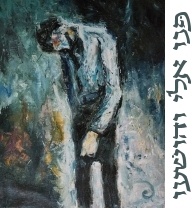
11.14.23 (Kislev 1, 5784) "Turn to me and be saved, all the ends of the earth!" (Isa. 45:22). Though the LORD graciously seeks and saves the lost, He calls us to return to Him and be saved. This is the challenge we face, and on a daily basis, to truly turn to the LORD... And yet when we do, when we center all our heart in him, we experience salvation. All that oppresses us, all our fears and troubles begin to fade from view and we find refuge: "And when they had lifted up their eyes, they saw no man, but Yeshua only" (Matt. 17:8).
Rouse yourself, therefore, and return to the LORD. Look to Him now and earnestly seek His face. We only have this hour. Today is the day... No matter what may beset your way, no matter the buffeting gale of your shame, no matter the wound you have made of your life -- return to the outstretched arms of Yeshua's mercy extended for your salvation. "As far as the east is from the west, so far has He removed our transgressions from us," which is to say that He welcomes you into the utmost depths of his heart, to know and love Him forever... He promises that the one who comes to Him will never be refused (John 6:27). Friend, heed the Spirit's invitation and know the salvation of the LORD.
Hebrew Lesson
Isaiah 45:22 reading (click):
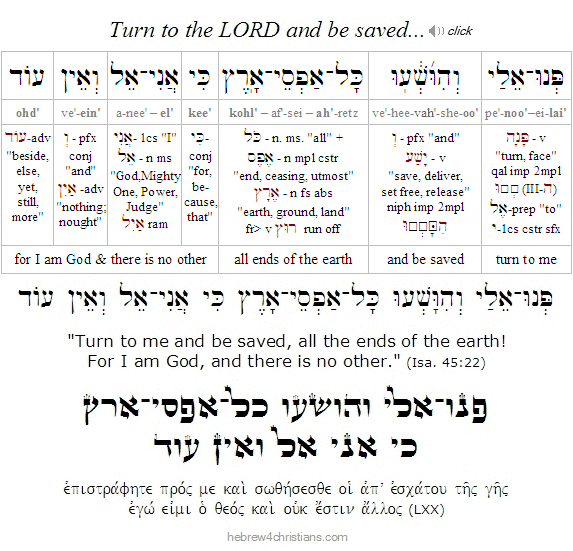 |
Beans for Blessings...
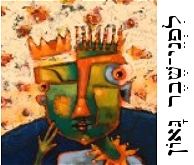
[ "How can you expect to dwell with God forever, if you so neglect and forsake him here?" - Jonathan Edwards ]
11.14.23 (Kislev 1, 5784) From our Torah this week (i.e., parashat Toldot) we read: "Then Jacob gave Esau bread and lentil stew (לֶחֶם וּנְזִיד), and he ate and drank and rose and went his way. Thus Esau despised (בָּזָה) his birthright (בְּכרָה)" (Gen. 25:34). Esau esteemed the honor of being the firstborn son (i.e, bechor: בְּכוֹר) – the high priest of the family – as worth a "bowl of beans" when compared with the drive of his lower nature, and so he tragically forfeited the blessing of God... Far from regarding service to God as a divine privilege and wonderful opportunity to benefit his family, Esau wanted to be free of such responsibilities and therefore discredited the meaning and promise of faith. Note that the Hebrew word for "lentil stew" (or pottage) is nazid (נָזִיד), which comes from a Hebrew word that means "to boil up" in pride (i.e., zid: זִיד). Sadly, Esau was consumed with his own interests and regarded them as more important than the things of God.
Note further that most English translations of the Hebrew text (i.e., Gen. 25:34) seem to suggest that because he bartered his birthright, Esau had therefore disparaged it, but the text implies continuity: in other words, after he ate, drank, and went his way, then Esau rationalized his bad decision by discounting its importance...
Hebrew Lesson
Jonah 2:8 reading (click):
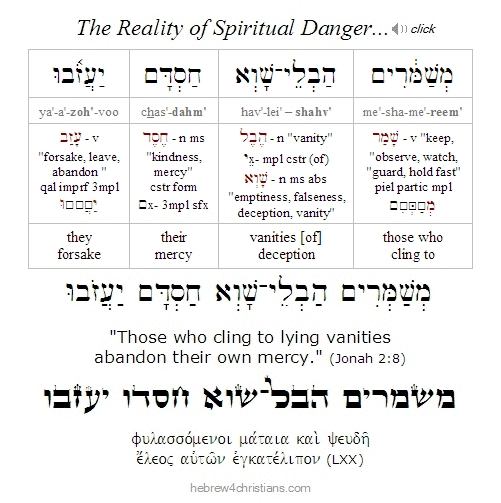 |
Rebekah's Surrender...

[ The following entry is related to this week's Torah reading, parashat Toldot... ]
11.14.23 (Kislev 1, 5784) When the twins fought within her womb, Rebekah asked, lamah zeh anochi ("Why do I exist?"), and then the LORD gave her the prophecy: ve'rav ya'avod tza'ir – "the older (or "stronger) shall serve the younger" (see Gen. 25:23). God had chosen one of her two children to become the heir of the covenantal promise, and she therefore may have thought it was her purpose or mission in life to help make that happen...
Rebekah's elaborate scheme to trick her husband by exchanging the twins for the blessing was doomed from the outset, since God needed to open the blind eyes of Isaac to truly bless Jacob as the family heir (Gen. 28:1-4). Rebekah's mistake was that she thought it was her job to intervene, or to "help God" by resorting to human intervention – somewhat like her mother-in-law Sarah earlier had sought to "help God" by giving Hagar as a surrogate wife to Abraham to produce the heir. It is a difficult thing to let go and to trust that the Lord will take care of everything. Lamah zeh anochi – Why do I exist, except to bear witness to God's providential plan and to trust in God's power to work all things together for good?
Such a plaintive question, lamah zeh anochi (לָמָּה זֶּה אָנֹכִי) – "Why do I exist?" When she was young, Rebekah seemed strong, secure, and courageous. For example, after meeting Eliezer she unhesitatingly declared her willingness to leave all that she knew to go to a strange land and to marry an unknown man -- all for the promise of an unseen good.
Nevertheless Rebekah was tested. First, she (like Sarah) was barren and for 20 years ached for a child with Isaac. Second, her pregnancy was difficult and the Lord foretold her that though she would have twins, there would be an ongoing conflict between them that would trouble their lives. Third, after bearing the children, Rebekah's turmoil continued: her husband discounted her faith; her sons pathetically competed for the approval of their father; and she was torn to choose to stand with Jacob even if that jeopardized her relationship with both Esau and Isaac. And later, after the scheme to exchange Jacob for Esau was exposed, her worst fear was realized: she indeed lost both of her sons (Esau because of her betrayal, and Jacob after he fled to Mesopotamia).
Struggle after struggle: lamah zeh anochi? Why is this happening to me? Why did I deserve such a fate? Why, but to partake of the truth – to suffer for the sake of the deliverance of God's ultimate blessing for the world. Like Rebekah, we have an important part to play, though assuredly we will be tested and experience challenges along the way. Lameh zeh anochi? To learn to trust God for all that happens in life...
Hebrew Lesson
Proverbs 3:5 reading (click):
Seeing with Wonder...

[ Related to this week's Torah portion (Toldot) is the topic of Esau's profanity that was expressed when he despised his birthright and therefore the promise of God... ]
11.14.23 (Kislev 1, 5784) The commandment not to take the Name of the LORD "in vain" (Exod. 20:7) implies that we must affirm the sanctity, meaning, significance, and worth of life itself. We must never live as though God does not exist, or, to state this positively, we must "set the LORD" always before us (Psalm 16:8). It is therefore forbidden to ignore the miracle of existence, to scoff at the value of life, or to debase ourselves by refusing to receive the truth. We are to take every thought "captive" to the reality of the Messiah (2 Cor. 10:5). Everything belongs to God, and every moment we have is beholden to Him...
Finding deliverance from profane thinking requires concentrated focus, or "kavanah" (כַּוָנָּה). As it is written: "We destroy arguments and every lofty opinion raised against the knowledge of God, and take every thought captive to obey Messiah" (2 Cor. 5:10). We are instructed to "bring down reasonings" (λογισμοὺς καθαιροῦντες) and every high thing that is lifted up against the knowledge of God (κατὰ τῆς γνώσεως τοῦ θεου) and to bring every thought "as a captive" to the obedience (ὑπακοὴν, from ὑπό: by, under, + ἀκούω: hear, obey) of Messiah. We can do this negatively by fighting against evil thoughts and censoring the inner evil of our hearts, or we can do this positively by being "captivated" by the words and love of Yeshua, and often we have to do both! This is the deeper meaning of "profanity" - to deny reality, to live in willful ignorance, and to miss the wonder of God's presence. If we sanctify God in our hearts, we will be far less likely to use God's name in vain, of course.
Dear friend, do you feel distant from God? Do you find yourself wanting to experience His presence and to be touched by Him? Then you are invited to "draw near" to Him now. If you delay or otherwise refuse to draw near, then how can God draw near to you? The LORD honors you as a person created in His likeness (בְּצֶלֶם אֱלהִים); He does not force you into relationship with Him... No, God respects your choice whether to draw near or not. That's why the Scripture reads, "You draw near to God and [then] He will draw near to you." If God doesn't draw near to you, it is because you have chosen not draw near to Him. God is love and He cannot be untrue to His loving nature....
Drawing near to God is God's way of drawing near to you... In other words, as you draw near to God, He will draw near and touch you. As Yeshua said, "Come to me, you who are weary and heavy laden, and I will give you rest" (Matt. 11:28). But you must take the first step to receive God's acceptance and love. Open the door of your heart and let Yeshua come in to meet with you now (Rev. 3:20).
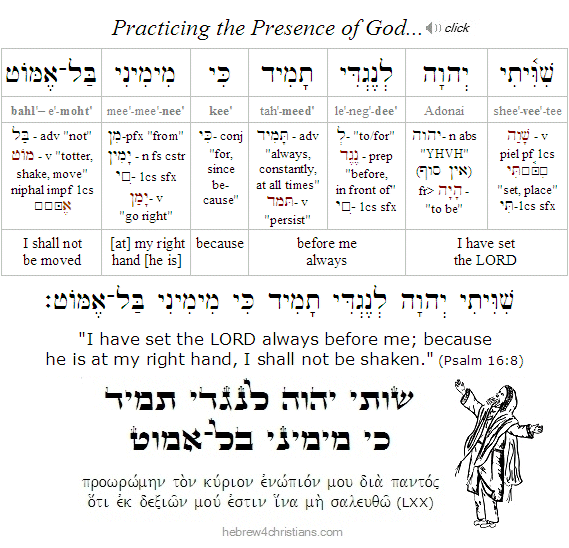 |
Barrenness and Prayer...
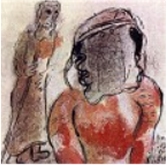
[ The following entry is related to this week's Torah reading, parashat Toldot... ]
11.14.23 (Kislev 1, 5784) The Jewish sages assumed that there are no "unnecessary words" in the written Torah. All 304,805 letters are carefully counted by the soferim (scribes). Moreover, Yeshua spoke about "kotzo shel Yod" (קוֹצוֹ שֶׁל יוֹד), that is, the smallest stroke atop the smallest Hebrew letter, in order to stress that every detail of God's revelation has its purpose (Matt. 5:18; Luke 16:17). Every "jot and tittle" has its place, and this implies that words spelled in unusual ways, the exact order of words in a phrase, and various textual oddities (such as redundant words, oversized or undersized letters, etc.) were intended to teach us something we might otherwise not have known.
 |
Our Torah portion this week (i.e., Toldot) begins with a description of the birth of Jacob and Esau. Isaac and Rebekah had been married for twenty years but were still without an heir to carry on the family line. The Torah then states that "Isaac entreated the LORD before his wife, because she was barren" (Gen. 25:21). The sages asked why the Torah mentioned the prayer before mentioning its purpose. Wouldn't it have made more sense to first mention that Rebekah was barren and then to say that Isaac prayed for her?
The Talmud states that Rebekah was barren because God desires the prayers of the righteous. God made them barren in order to cause them to seek His face. Since Isaac was sixty years old when the twins were born (Gen. 25:26), and he had married Rebekah at age forty (Gen. 25:20), we know that they had waited twenty years for the birth of their first descendants. Twenty years is a long time to wait, especially when the promise of the heir of Abraham and Isaac (and therefore the Messiah) is at stake. Rabbi Bachaya said that the prayer offered by Isaac was the goal all along, and the barrenness was the divinely appointed means to that end. The Torah alludes to this by saying that Isaac first prayed before explaining his reason for doing so.
Hebrew Lesson
Psalm 119:71 Hebrew Reading (click):
The LORD wants us to be in a personal relationship with Him, and therefore He sometimes sends temporal affliction to remind us of our eternal need.... After all, is there anything worse than to be "forgotten" by God? Can there be any worse punishment in this life than to be untouched by need, suffering and testing? Indeed, it is curse to be devoid of need before the LORD, and affliction is a blessing in disguise. As A.W Tozer once wrote, "It is doubtful whether God can bless a man greatly until He's hurt him deeply." This is why, as the Talmud comments, the manna fell once a day during the 40 years, and not once a year, as we might have desired: " It can be compared to a mortal king who had a son for whom he provided food once a year; as a result, he saw his son but once a year. Thereupon he provided for his maintenance daily, so that he called upon him every day" (Yoma 76a).
Just as God humbled Israel with manna in the desert, so He humbles us. "Give us this day our daily bread..." The purpose of affliction is ultimately good and healing: God humbles us with manna so "that he might make you know that man does not live by bread alone, but man lives by every word that comes from the mouth of the LORD" (Deut. 8:3). In other words, God uses the discipline of affliction to lead us to the truth. We often pray that our problems be taken away, but God sometimes ordains these very problems so that we will draw near to Him... Yeshua told us, "Your heavenly Father knows what you need before you ask Him." Many of us are slow to learn, but God is patient with those whom He disciplines. The goal is to never lose sight of what's most important, which is God Himself.
Take Heed how you Hear...

11.13.23 (Cheshvan 29, 5784) It is a dreadful possibility that we can fool ourselves into thinking that we are pleasing God while we are ignoring him. This is not so much a danger in matters of carnal indulgence or the obvious sins of the flesh, but in our spiritual life, where we may craftily substitute religiosity with a passionate surrender to God's will.
In the name of our faith we can focus on matters that concern the abstract crowd more than the individual. Church creeds; theological teachers; pet doctrines; religious rituals and mummeries; worldly politics "for the sake of God," and so on. None of these things, though perhaps not bad in and of themselves, may serve as a substitute for listening to God for yourself through personal prayer and by spending time alone with God's word.
Recall that when God spoke the Ten Commandments to Israel at Sinai, the people trembled and "stood afar off." Then they appealed to Moses, "You speak with us, and we will listen; but do not let God speak with us, lest we die" (Exod. 20:19). It is a fearful thing to fall into the hands of the Living God. Many people who say they believe in God really don't want God to speak to them because they are afraid that God will ask them to do something they really don't want to do. If that happens, they secretly dread, then they will be forced to choose whether to obey God or to deny him - and then all shall be known of their heart. It is much "safer" to listen to others, for example, to rely on the reasonings of "bible professors" or the opinions of clergy or theologians than to walk your own venture of faith before God.
Kierkegaard wrote: "The matter is quite simple. The Bible is very easy to understand. But we Christians are a bunch of scheming swindlers. We pretend to be unable to understand it because we know very well that the minute we understand we are obliged to act accordingly. Take any words in the New Testament and forget everything except pledging yourself to act accordingly. My God, you will say, if I do that my whole life will be ruined. Herein lies the real place of Christian scholarship. Christian scholarship is the Church's prodigious invention to defend itself against the Bible, to ensure that we can continue to be good Christians without the Bible coming too close. Dreadful it is to fall into the hands of the living God. Yes, it is even dreadful to be alone with the New Testament.
Being alone with God's Word is a dangerous matter. Of course, you can always find ways to defend yourself against it: Take the Bible, lock your door – but then get out ten dictionaries and twenty-five commentaries. Then you can read it just as calmly and coolly as you read newspaper advertising. With this arsenal you can really begin to wonder, "Are there not several valid interpretations? And what about the prospect of new interpretations? Perhaps there are five interpreters with one opinion and seven with another and two with a strange opinion and three who are wavering or who have no opinion at all. So you calmly conclude, "I myself am not absolutely sure about the meaning of this passage. I need more time to form an opinion." Good Lord! What a tragic misuse of scholarship that it makes it so easy for people to deceive themselves!"
Amen, often the problem is an 18" one: the distance between the heart and the head. Yeshua warned us that the passions of the heart direct the mind's reasoning: "For out of the heart proceed evil thoughts" (διαλογισμοὶ πονηροί), literally, evil dialogs or inner conversations that seek to justify the covetousness of the fallen soul. On the other hand, the passion to yield your heart to obey God will affect how you hear what God says. As Yeshua said: "Take care then how you hear, for to the one who has, more will be given, and from the one who has not, even what he thinks that he has will be taken away" (Luke 8:18).
In the end, Kierkegaard says, we must remember that "every person must render account to God. No third person dares venture to intrude upon this accounting. God in heaven does not talk to us as to an assembly; he speaks to each individually. This is why the most ruinous evasion of all is to be hidden away in a herd in an attempt to escape God's personal address. Adam attempted this when his guilty conscience led him to imagine that he could hide himself among the trees. Similarly, it may be easier and more convenient, and more cowardly too, to hide yourself among the crowd in hope that God will not recognize you from the others. But in eternity each shall individually render an account. Eternity will examine each person for all that he has chosen and done as an individual before God.
It will be horrible on judgment day, when all souls come to life again, to stand utterly alone, alone and unknown by all, and yet candidly, exhaustively known by him who knows all. No one may ever pride himself at being more than an individual. Nor can anyone despondently think that he is not an individual. No, each one can and shall render account to God. Each one has the task of becoming an individual."
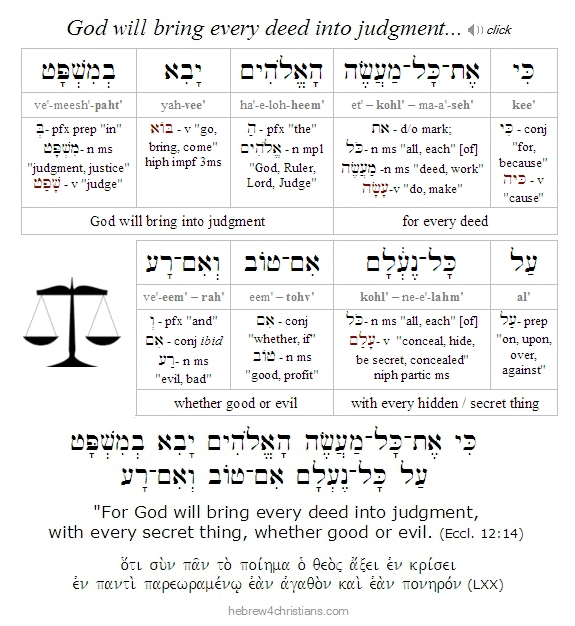 |
The spiritual life is decidedly one of attentive listening. "Shema Yisrael" is a summons of the heart to turn away from the profane to heed the sacred call of God. The invitation of the Shema is to passionately love God with all our heart, soul, and strength, and to heed the truth of love in all your ways (Deut. 6:4-5).
A verse from Torah reveals God's desire for each person to listen with all of their heart: "Now therefore, if you will indeed obey my voice and keep my covenant, you shall be my treasured possession" (Exod. 19:5). The Hebrew grammar here is intense. The phrase often translated as "if you will indeed obey" uses an emphatic construction, "if hearing you will hear" (אִם־שָׁמוֹעַ תִּשְׁמְעוּ), which suggests a sincere willingness to listen for the voice of the LORD. Just as we often have to pray before we can pray, so we must quiet our heart to listen before we can truly hear. That is why the LORD speaks kol demamah dakkah (בְּקוֹל דְּמָמָה דַקָּה), "in a quiet whisper," because a quiet and listening heart is required to hear what the Spirit is saying. As we take heed to how we hear, we will hear more. Actively listening to the whisper of God enables you to walk as his child, segulah (סְגֻלָּה), a treasured person.
 |
Pining for Heaven...

11.13.23 (Cheshvan 29, 5784) "Whom have I in heaven but You? And there is nothing I desire on earth beside You" (Psalm 73:25). Loneliness. Heartache. Feeling you're a long way from home... It is a divine and blessed emptiness to feel lost and alienated from the "havel havelim," the emptiness of this world.... We are strangers here; we yearn, we thirst, we hunger, and our hearts are broken as we await God's redemption to be manifest. How could it be otherwise? How could we feel at home here, in olam ha'sheker (עולם השׁקר), the world of lies, delusions, and violence?
There is nothing here anymore; there is no place to lay our heads... And indeed it is a state of blessedness when all earthy hope is surrendered as we desperately hunger for what we really need. And what we truly need is not to become comfortably numb, pacified, and to otherwise lose our souls; nor do we need a reason or apology for the sorrows and pains of our lives. No what we really need is God's presence in Messiah - the light of his eyes as He looks upon us in love. Whatever suffering we may encounter, whatever wounds we may bear, all is made well when our eyes find their way to his, and then we will understand, even if we can never explain any of it. We will understand that we don't need to understand why things happened the way they did, but only that He has been there for us all along.
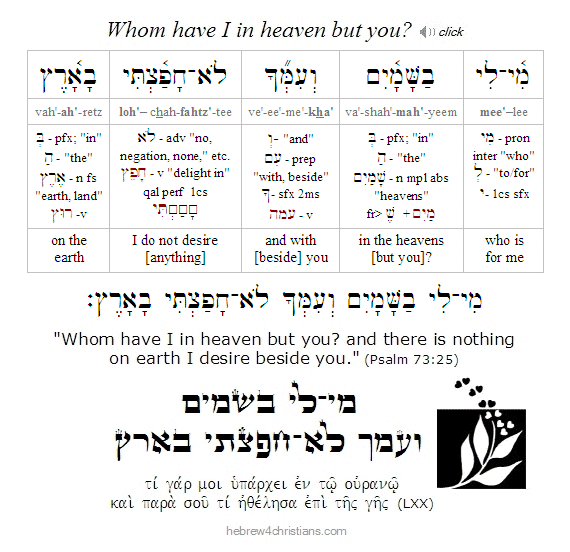 |
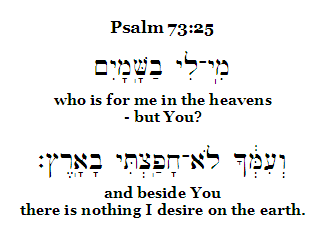 |
The Month of Dreams...

11.12.23 (Cheshvan 28, 5784) Shalom chaverim. Tomorrow (at sundown) marks "Rosh Chodesh Kislev" (ראש חודש כסלו), or the start of the month of Kislev. On the Biblical calendar the month of Kislev (כִּסְלֵו) is the ninth of the year (counting from the month of Nisan), and it is also one of the "darkest," with the days progressively getting shorter and the nights getting progressively longer. Kislev is perhaps best known for the eight day holiday of Chanukah (חג החנוכה) which begins on the 25th of the month (Thurs. Dec. 6th) and runs through the third day of the following month (of Tevet). Since there is always a new moon during the season of Chanukah, it is no wonder that this holiday represents an appropriate time to kindle the lights of faith, and especially to recall the advent of Yeshua the Messiah, the Light of the World (אוֹר הָעוֹלָם).
Chodesh Kislev is sometimes called the "month of dreams" because the weekly Torah portions for this month contain more dreams than any other in the Scriptures. No less than nine dreams (of the ten in the Torah) appear in the four portions of Vayetzei, Vayishlach, Vayeshev, and Miketz - all of which are usually read during the month of Kislev. In the Torah, the primary figure connected with dreams is Jacob's son Joseph, who was nicknamed by his brothers as "that dreamer" and who was later named "Decipherer of Secrets" (Tzofnat Paneach) by Pharaoh (Gen. 41:45). Joseph was able to authentically mediate the spiritual and the physical realms through the Spirit of God within him (Gen. 41:38). Prophetically Joseph represents Yeshua the "disguised Egyptian" who likewise was rejected and hated by his brothers but who later became their savior (for more see "Mashiach ben Yosef").
For more on this subject, see "Chodesh Kislev."
Hebrew Lesson
Psalm 105:19 reading (click):
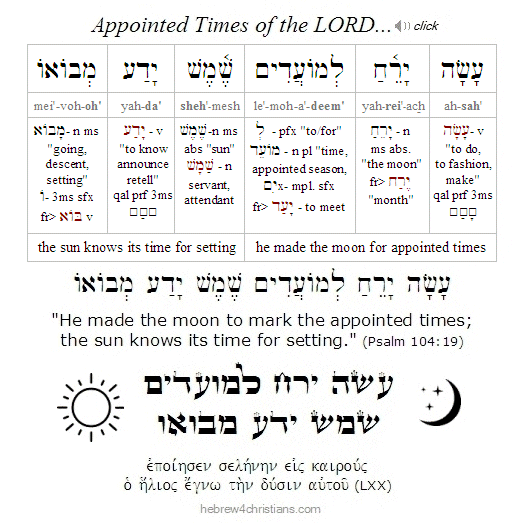 |
Parashat Toldot - תולדת
 |
11.12.23 (Cheshvan 28, 5784) Last week's Torah (i.e., Chayei Sarah) told how Abraham's servant Eliezer (אֱלִיעֶזֶר) sought a bride for Isaac from among Abraham's relatives living in Mesopotamia. In response to his prayer to the LORD, Eliezer was shown that Abraham's nephew's daughter Rebekah (i.e., Rivkah bat-Betu'el: רִבְקָה בַּת־בְּתוּאֵל) was chosen to be one of the four matriarchs of Israel (i.e., arba imahot l'Yisrael: אַרְבַּע אִמָּהוֹת לְיִשְׂרָאֵל).
This week's reading (i.e., parashat Toldot) continues the story by revealing that Isaac and Rebekah had been married for twenty years but were still without an heir to carry on the family line. Finally their prayers were answered and Rebekah conceived, though not without complications. When she inquired of the LORD about her travail, God told her that she was carrying twins that would be heads of two rival nations, but the younger child would in fact become the promised heir of the chosen people.
When the day arrived for Rebekah to give birth, the first child came out "red and covered with hair," so they called his name "Esau" (i.e., esav: עֵשָׂו, "hairy"); and then his twin brother came out with his hand grasping Esau's heel (i.e., akev: עָקֵב), so they named him "Jacob" (i.e., ya'akov: יַעֲקב), from the Hebrew verb (i.e., akav: עָקַב), meaning "to take by the heel; to displace; to supplant."
The Torah then says that Esau grew up to become a "crafty hunter" (i.e., ish yodea tzayid: אִישׁ יֹדֵעַ צַיִד), "a man of the field" (אִישׁ שָׂדֶה) while Jacob became "a wholesome man" (i.e., ish tam: אִישׁ תָּם) who "dwelt in tents" (יֹשֵׁב אֹהָלִים). Isaac favored Esau (וַיֶּאֱהַב יִצְחָק אֶת־עֵשָׂו); because he had a taste for game (כִּי־צַיִד בְּפִיו), but Rebekah favored Jacob (וְרִבְקָה אֹהֶבֶת אֶת־יַעֲקֹב) because she believed the prophecy given before the children were born that the younger would rule over the elder...
The portion then gives us a look at the spiritual life of the two boys. According to tradition, on the day of the funeral of their grandfather Abraham, Jacob was cooking lentil soup for Isaac, the traditional mourner's meal. Esau rushed in from a hunting expedition, exhausted and hungry. He then begged Jacob to give him some of "that red stuff" (i.e, ha'dom hazeh), but Jacob answered that he would give him some only if he would sell him his birthright (i.e., bechorah: בְּכוֹרָה, from bechor: בכור, "firstborn"). Esau hastily agreed to the terms and thereby regarded his birthright as being worth only a "bowl of beans" (on account of this incident, Esau was given the nickname of "Red" (i.e., אֱדוֹם "Edom"). In this manner the Torah describes how Esau "despised the birthright" (Gen. 25:34).
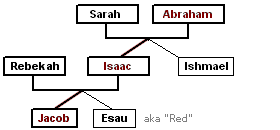 |
Years later, when Isaac was old and blind, Jacob (with Rebekah's help) tricked Isaac into conferring the blessing of the firstborn (בִּרְכַּת בְּכוֹר) upon him, thereby making Jacob the heir of the family, and not Esau. When the ruse was discovered, however, Esau sought to kill his brother, and Jacob was forced to flee his home, never to see his mother again...
Hebrew Lesson
Gen. 25:19 Hebrew Reading (click):
A Bride for the Promised Son...

[ The following entry is related to this week's Torah reading, parashat Chayei Sarah... ]
11.10.23 (Cheshvan 26, 5784) Though he is not explicitly named in the account, the "elder servant" commissioned to find a bride for Isaac was undoubtedly Eliezer of Damascus (see Gen. 15:2). Eliezer (אֱלִיעֶזֶר), whose name means "my God will help," is regarded as a consummate example of a godly servant, a picture of the Holy Spirit (רוּחַ הַקּדֶשׁ) sent on a mission to find a bride for the Sacrificed Seed of Abraham (i.e., the Messiah Yeshua). Eliezer dutifully departs on his mission and waits by the "well of water," interceding on behalf of righteousness... He asks for a witness from heaven: "Let the young woman to whom I shall say, 'Please let down your jar that I may drink,' and who shall say, 'Drink, and I will water your camels' -- let her be the one whom you have appointed" (Gen. 24:13-14). Rebekah's response of kindness and generosity (i.e., chesed: חֶסֶד) to a tired wayfarer demonstrated God's choice. Note that the test concerned the inward character of the woman, not her status or beauty or other worldly factors. And since a single camel needs about 25 gallons of water and requires 10 minutes to drink, watering ten camels would require 250 gallons and at least a couple hours of work running back and forth to the well - no small task for anyone! Rebekah possessed Abraham's qualities of gracious hospitality and diligence...
Eliezer's prayer to find a bride for Isaac (the very first recorded prayer of the Torah) did not appeal for a great miracle such as splitting the sea, but instead relied on the providential and "hidden hand" of God that governs the affairs of life (i.e., hashgachah pratit: הַשְׁגָּחָה פְּרָטִית). His prayer at the well relied on God to lead him to a chosen woman who, like his master Abraham, would extend compassion to a person in need (חֶסֶד). The Torah therefore reveals that far from being a coincidence or chance encounter, then, "before he had finished speaking, הִנֵּה רִבְקָה - behold Rebekah..." (Gen. 24:15). "Before they call I will answer; while they are still speaking I will hear" (Isa. 65:24).
Consider for a moment the great character of the woman God chose to be the bride for the Abraham's promised heir... Rebekah was willing to leave her family - all that she knew - based on an "otherworldly" promise. Her response to the invitation was simply: אֵלֵךְ - "I will go" (Gen. 24:58). Her courageous willingness was likewise a characteristic of Abraham who was willing to leave his homeland in search of the greater things of God. Like Abraham, Rebekah chose to be ger ve'toshav (גֵּר־וְתוֹשָׁב) - a "stranger and a sojourner" - who left everything behind in order to become part of God's chosen family...
Hebrew Lesson
Proverbs 31:10 reading (click):
Enduring to the End...

11.10.23 (Cheshvan 26, 5784) You may sometimes struggle with your faith -- not by questioning whether Yeshua is the Savior who died for your eternal healing, but in an hour of testing, when you feel exhausted by pain, when you pray for relief, seeking God in your cries and tears, but the pain continues, and then you are left rationalizing why you were denied your supplication, why your suffering has been prescribed -- for surely, you believe, God can heal you by simply saying the word - and then you wonder to what extent you need to be broken in order to be fully remade... As C.S. Lewis once said, "We are not necessarily doubting that God will do the best for us; we are wondering how painful the best will turn out to be" (Letters of C.S. Lewis, 1964). There is a trust issue in suffering, and an intimacy that comes through its fires. And as Soren Kierkegaard reminds us, "It is one thing to conquer in the hardship, to overcome the hardship as one overcomes an enemy, while continuing in the idea that the hardship is one's enemy; but it is more than conquering to believe that the hardship is one's friend, that it is not the opposition but the road, is not what obstructs but what develops, is not what disheartens but ennobles."
The difficulty of intense personal suffering is deeply existential: how do you keep hope in the midst of this tension? "Lord I believe; help my unbelief" (Mark 9:24). How do you affirm that your heavenly Father will heal you but at the present hour you must continue to endure suffering? Do you then devise a "soul-building theodicy" to explain your struggle – providing a narrative to answer the "why" of your suffering -- or do you attempt to sanctify suffering as a means of healing others by the grace of the Messiah (Col. 1:24)? When Yeshua victoriously proclaimed, "It is finished" just before he died on the cross, he foreknew that his followers would experience a "purging process," a "refining fire," and time on the "potter's wheel" to perfect their sanctification. At the cross of Yeshua death itself was overcome – and all that it implies – and yet it is nevertheless true that we will suffer and die ourselves and that death persists an enemy (see 1 Cor. 15:26). While we celebrate the reality of the final redemption, the "instrumentality of our sanctification" needs to be willingly accepted and endured. I say "endured" here because I don't think we will ever have a complete answer to the question of "why" we undergo the various tests we face in this life. Our disposition in the midst of this ambiguity, in the midst of seemingly unanswered prayers, is where our faith is disclosed: will we despair of all temporal hope or not? Will we console ourselves with the vision of a future without tears and loss - a heaven prepared for us -- or will we resist the present darkness and seek to find deliverance in this hour? Do we trust God with our pain and submit to his will, or will we "curse God and die" inside – losing hope and despairing of all remedy?
As King David once wrote, "At an acceptable time, O God, in the abundance of your steadfast love answer me in your saving faithfulness. Deliver me from sinking in the mire; let me be delivered from my enemies and from the deep waters. Let not the flood sweep over me, or the deep swallow me up, or the pit close its mouth over me. Answer me, O LORD, for precious is your compassion; in the abundance of your mercies, turn to me" (Psalm 69:16).
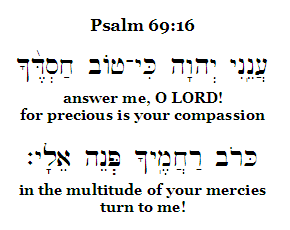 |
God sometimes allows difficulties in the lives of those whom He favors in order to ultimately reward them. Why were Sarah, Rebekah, and Rachel barren for so many years? So that God would hear their prayers and reward them for their steadfast faith. Why was Leah more fruitful than the other wives of Jacob? Because she was "hated" and subject to unending gossip that she tried to steal her sister's husband, yet she persevered in hope. In this connection, some of the Chassidic sages render Psalm 118:21 as, "I thank you that you have pained me (עֲנִיתָנִי) and have become my salvation." The pain that I regarded as punishment became the means by which I obtained the salvation of the LORD. Similarly, "It was good for me that I was afflicted (עֻנֵּיתִי), that I might learn your decrees" (Psalm 119:71).
Hebrew Lesson
Psalm 119:71 reading (click for audio):
It is written in our Scriptures: "But You, O LORD my Master, deal with me for your own Name's sake; because your steadfast love is good, deliver me" (Psalm 109:21). "Deal with me me" is the confession that God alone has the power to help. Asking God to bring glory to His own Name -- to honor and magnify His Name -- is the theme of all true intercession.
Suffering has a way of focusing the heart and mind, reminding us that "today is the tomorrow of yesterday." Life is short, and our need is great to turn to the LORD and take hold His promises. We take comfort that God is for us the God of salvation: "Blessed be the Lord, who daily bears us up; God is for us our salvation. Selah. Our God is a God of salvation (יְשׁוּעָה), and to GOD, the Lord, belong deliverances from death" (Psalm 68:19-20).
Eyes of the Heart...
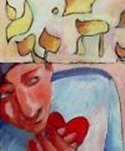
[ "Turn around and believe that the good news that we are loved is better than we ever dared hope, and that to believe in that good news, to live out of it and toward it, to be in love with that good news, is of all glad things in this world the gladdest thing of all." - Buechner ]
11.10.23 (Cheshvan 26, 5784) Yeshua told us: "Blessed are those who have not seen and yet have believed" (John 20:29). Despite the struggle of this life - our sorrows, pains, and even death itself - we believe in God's love and promise for us, even if we do not presently see the fulfillment of our hope, just as Abraham believed the promise that he would be the father of an innumerable multitude long before he saw any sign of its fulfillment. Abraham "believed the impossible" and "hoped against hope" (παρ᾽ ἐλπίδα ἐπ᾽ ἐλπίδι), meaning that hope moved within him even though there was nothing to see in the realm of the natural -- he believed in an unseen good; he trusted in the One who gives life to the dead and who "calls into existence the things that do not exist" (Rom. 4:17).
The Scripture comments: "He did not weaken in faith when he considered his own body, which was as good as dead (since he was about a hundred years old), or when he considered the deadness of Sarah's womb. He did not stumble over the promise of God through unbelief but was strong in faith, and gave glory to God, fully persuaded that God was able to do what he had promised, and that is why his faith was counted to him as righteousness" (Rom. 4:19-22).
Likewise we are called to believe in an unseen good, an unimaginably wonderful destiny for our lives, as it says, "Things no eye has seen, nor ear heard, nor mind imagined, are the things God has prepared for those who love him" (1 Cor. 2:9). Faith does not use natural reason or the evidence of the senses to see the unseen, but it "believes to see" through "eyes of the heart" to know the hope of God's calling and to attain the blessing (Eph. 1:18). Faith in God's love comes from a different source and has a different means of apprehension than human wisdom, so that no matter how things might appear in this fallen world, the LORD God may be known and trusted to work all things for our ultimate good. "Blessed are those who have not seen and yet have believed." Amen.
Hebrew Lesson
Psalm 27:14 reading (click):
Seeking the Good...

11.08.23 (Cheshvan 24, 5784) The Danish philosopher Soren Kierkegaard (1813-1855) told the story of two young portrait artists who both sought to capture the essence of beauty in their paintings. One artist looked high and low for the "perfect face of beauty" but never found it. Tragically, he later gave up painting and lived in despair. The other artist, however, simply painted every face he saw and found beauty in each one. Now here's your question: Which of the two was the sincere artist?
The heart looks through the eye.... A good eye (i.e., ayin tovah: עַיִן טוֹבָה) - sometimes called a "beautiful eye" (עין יפה) - refuses to think evil about others (it "does not impute the bad" - οὐ λογίζεται τὸ κακόν - in 1 Cor. 13:5), but it rejoices in the truth – even if such truth is found only in the hope of a future good (1 Cor. 13:7). The good eye is the instrument of a giving heart that looks upon the needs and pains of others with genuine compassion.
An "evil eye" (i.e., ayin hara: עַיִן רָעָה), on the other hand, is cynical, jaded, envious, and unsympathetic to other people and their struggles... The Torah admonishes: "Take care lest there be an unworthy thought in your heart ... and your eye look grudgingly on your poor brother, and you give him nothing, and he cry to the LORD against you, and you be guilty of sin (Deut. 15:9). The Hebrew verb translated "take heed" is an imperative urging us to be careful about how we think, since our thoughts affect our hearts, and our hearts affect our choices and actions. Suspicious or cynical thoughts are a symptom a hard heart, that is, a "difficult" heart that has trouble feeling sympathy for others.
Using a good eye takes from the treasure within the heart and gives it out freely to others: "The good person out of his good treasure brings forth good, and the evil person out of his evil treasure brings forth evil" (Matt. 12:35). There never is a risk that love may be given away without warrant from heaven.
A person with a "good eye" looks at things from the perspective of love. Ayin tovah looks at circumstances -- and especially at other people -- and finds something beautiful and worthy of respect.... "Whoever sows sparingly will also reap sparingly, and whoever sows bountifully will also reap bountifully" (2 Cor. 9:6). As we give, so we are given...
"The light of the body is the eye: if therefore your eye is focused, your whole body shall be full of light, but if your eye is evil, your whole body will be full of darkness. If therefore the light that is in you is darkness, how great is that darkness!" (Matt. 6:22-23). Yeshua says here that if your eye is "focused," that is, whole and free of distraction (the Greek word ἁπλοῦς means "without folds" or complication), you will be filled with light, a metaphor for inner illumination. Everything will be clear as you discover what is most valuable in life. As King David said: "One thing have I desired of the LORD, that I will seek: to gaze upon the beauty of the LORD (לַחֲזוֹת בְּנֹעַם־יְהוָה) and to serve in His presence'' (Psalm 27:4).
On the other hand, if your eye is "bad" or evil (πονηρὸς), you will be filled with darkness, a metaphor for blindness of heart. Envy, greed, and fear will blind your heart to what is most important and valuable. You will be filled with inner conflict (δίψυχος) and lose sight of the very reason for your being. "Is your eye evil because I am good?" asks the Lord. Are you filled with envy, malice, and desire for worldly prosperity? Again, the heart looks through the eye. What are you believing to see? Do you see ugliness before mercy? It is from within, out of a person's heart, that evil thoughts come (Mark 7:21-23).
We are always asking, seeking, and finding... Our inner thoughts, our drives and hidden desires, and our secret wishes are "prayers" we constantly are praying. Regard it a spiritual principle, then: "Ask, and it shall be given you; seek, and you shall find; knock, and it shall be opened to you: For every one that asks receives; and he that seeks finds; and to the one that knocks it shall be opened" (Matt. 7:7-8).
How we see is a spiritual decision and there are spiritual laws regarding its consequence: "Whoever seeks for the good will find blessing, but evil will come to the one who looks for it" (Prov. 11:27). The one who seeks good is called shocher tov (שׁחֵר טוֹב), "a seeker of good." The shocher tov uses a "good eye" to see worth and potential in others. The one who searches out evil, on the other hand, is called doresh ra'ah (דרשׁ רעה), "a searcher of evil." The doresh ra'ah has an evil eye that is stingy, critical and faultfinding. The proverb may therefore be stated this way: When you seek the good of others, you will find God's blessing (ratzon), but when you search for evil in others, it becomes your own. As the Baal Shem Tov once said, "When we see faults in others, we must understand that they only reflect the evil within ourselves." Likewise King David said, וּתְפִלָּתִי עַל־חֵיקִי תָשׁוּב, "my prayer shall turn back upon my breast" (Psalm 35:13). Some prayers are conscious words spoken to God, whereas others are expressions of heart attitudes. The proverb teaches that when we harbor indifference, ill will, or resentment toward others, we hurt ourselves; when we are kind to others and desire their blessing, on the other hand, we will find God's favor and blessing. טוֹב־עַיִן הוּא יְברָךְ - "The one with the good eye will be blessed" (Prov. 22:9; Matt. 6:22).
Hebrew Lesson
Proverbs 11:27 Hebrew lesson:
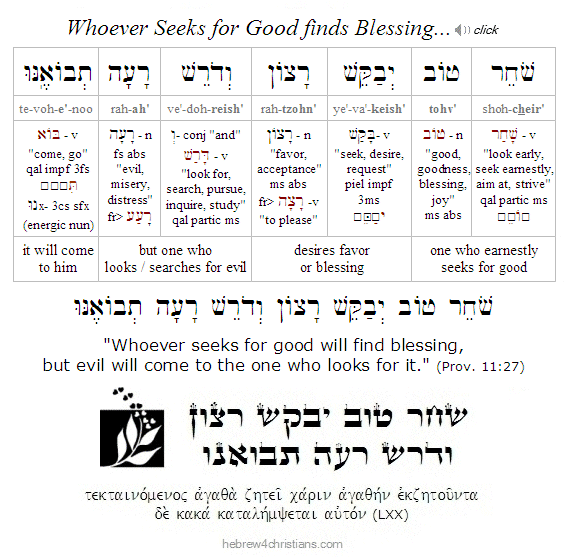 |
Awakening to Life...

11.08.23 (Cheshvan 24, 5784) We shouldn't be surprised that most people refuse to wake up and realize the profound spiritual danger of their lives – namely, the imminent reality of personal judgment and death – since the Scriptures declare that people willingly suppress the truth and "celebrate" untruth (see Rom. 1:20-32). Soren Kierkegaard commented: "The world wants to be deceived... intensely, more intensely, more passionately perhaps than any witness to the truth has fought for the truth, the world fights to be deceived; it most gratefully rewards with applause, money, and prestige anyone who complies with its wish to be deceived" (Judge for Yourself). Indeed, any distraction that seduces people to deny reality will suffice for the sake of untruth... The Scriptures state: "And this is the judgment: the light has come into the world, and people loved the darkness rather than the light because their works were evil. For everyone who does wicked things hates the light and does not come to the light, lest his works should be exposed. But whoever does what is true comes to the light, so that it may be clearly seen that his works have been carried out in the power of God" (John 3:19-21).
It is vital to remember that one of the main tactics of the enemy of our souls is to cast a spell over us induce a sense of forgetfulness and apathy... Satan wants you to forget that you are a child of the King. The entire venture of teshuvah (repentance) presupposes that you are created be'tzelem Elohim - in the image of God - and therefore you have infinite value and dignity. This is all the more evident in light of the awesome ransom that Yeshua paid to reconcile your soul with God. Understand: the judgment is so great because the love is so great... So what is one of the greatest of sins you can commit in your life? To forget what God has done for you... Remaining asleep, unmindful of your true identity is one of the most tragic things of life. Therefore the blast of the shofar is meant to jolt us awake... We are to remember who we really are -- to remember that God is our King. The person who says, "Tomorrow I will do teshuvah" really is saying, "Not now." And then tomorrow comes and he says, "Not now." And in this way his entire life passes by, saying, "Not now." Finally one day he wakes up only to find himself already dead.
Kierkegaard once said: "To become sober is: to come to oneself in self-knowledge and before God as nothing before him, yet infinitely, unconditionally engaged." This is the earnestness of wide-awake faith. May God help us wake up today to the Reality that is set before us. The "End of the World" is the day you will die and give account of how you lived before the Truth of Eternity -- and there will be no more rationalizations, no more evasions, no excuses, no pretense of being a victim, that will bear on the question before the bar of heaven....
Hebrew Lesson
Hosea 14:1 Hebrew lesson:
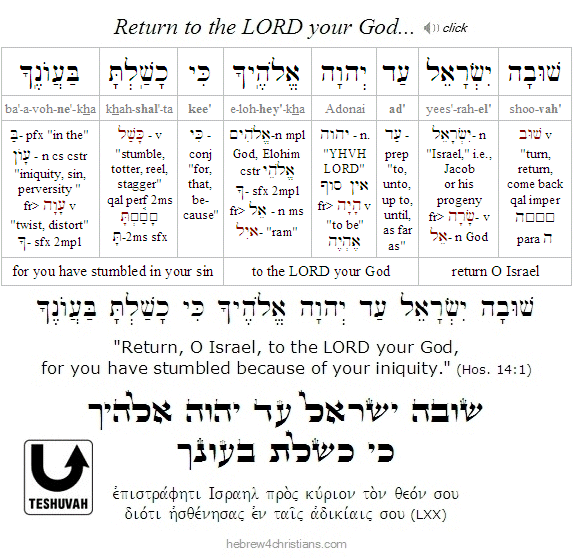 |
Perseverance of Faith...
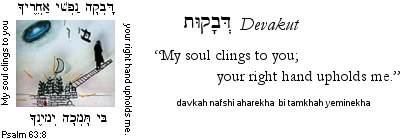
11.08.23 (Cheshvan 24, 5784) Faith perseveres in the way of life... "You who have clung to the LORD your God are all alive today" (Deut. 4:4). The Hebrew word devakut (דְּבָקוּת) means "cleaving" and refers to communion with God. This word comes from davak (דָּבַק), meaning to "cling" or "stick" (the Modern Hebrew word for "glue" is devek (דֶבֶק) which also comes from the same root, as does the Yiddish word "davka"). Devakut, then, implies being intimately connected with God in an earnest and passionate relationship: "My soul cleaves to you; your right hand upholds me" (Psalm 63:8).
The sages comment that we can cleave to God only one day at a time, since our future is conditioned upon this present day and its challenges. As Yeshua said: "Take therefore no thought for tomorrow: for tomorrow shall take thought for the things of itself. Sufficient for the day its own trouble" (Matt. 6:34). One day at a time...
The LORD gives us daily bread (לֶחֶם חֻקֵּנוּ) so that we may persevere for this day; he "feeds us with hunger" to teach us to rely on alone him for true life (Deut. 8:3). "For he is our God, and the sheep of his hand today -- if you hear his voice" (Psalm 95:7). Today, if you hear his voice, do not harden your heart (Heb. 3:15). "Take care, brothers, lest there be in any of you an evil, unbelieving heart, leading you to fall away from the living God, but encourage one another every day, as long as it is called "today," so that none of you may be hardened by the deceitfulness of sin" (Heb. 3:12-13).
Hebrew Lesson
Psalm 63:8 Hebrew Reading (click):
What are you dying for?

11.07.23 (Cheshvan 23, 5784) We may sometimes ask the question, "What am I living for?" though the question may be turned around to ask, "What am I dying for?" for indeed we are given precious and few days during our sojourn here, and every day we live is a day we are deciding that for which we will die. What we are willing to die for reveals what we believe is the reason for our lives.
If you stop and think about it, you realize that you "cannot not" exist; indeed you were "thrown" into this world apart from your conscious consent, and moreover that you cannot escape the inevitability of dissolution, suffering, death. Meanwhile, your life passes quickly as a fleeting vapor, as it says: "As for man, his days are like grass; as a flower of the field, so he flourishes: for the wind passes over it, and it is gone; and the place thereof remembers it no more" (Psalm 103:15-16).
Here today, gone tomorrow... but to what end? Where are you going during your short sojourn here on earth? Do you believe in the spiritual world? If you believe you are on your way to heaven, how are you living today that demonstrates your journey?
Will there be regret when you die? Will there be regret in heaven? Is it possible to lose a measure of blessedness in the world to come through disobedience, faithlessness, and sin? It is a dreadful thought, and many of us feel that much of our life has been regrettable, but how we come to "build" our lives make the difference for eternity: "For no one can lay a foundation other than that which is laid, which is Yeshua the Messiah. Now if any man builds upon this foundation with gold, silver, precious stones, or with wood, hay, stubble, each one's work will become clear; for the Day will declare it, because it will be revealed by fire; and the fire will test each one's work, of what sort it is. If anyone's work which he has built on it endures, he will receive a reward, but if anyone's work is burned, he will suffer loss; but he himself will be saved, yet so as through fire" (1 Cor. 3:15). "For we must all appear before the judgment seat of Messiah, that each one may receive the things done in the body, according to what he has done, whether good or bad" (2 Cor. 5:10).
Yeshua gave us parables admonishing us to make the most of our lives. The "Parable of the Soils" warns us to be receptive to God's presence and to bear fruit (Luke 8:4-8); the "Parable of the Talents" warns us not to squander our lives out of fear or complacency (Matt. 25:14-30). The tragic judgment of the indifferent steward was expressed by Yeshua this way: "From him who has not, even that which he has shall be taken away" (Matt. 25:29). The "Parable of the Rich Fool" warns us to be rich toward God (Luke 12:13-21), and so on.
But what about all the great promises of the Lord that he will remove our transgressions "as far as the east is from the west," and that he will cast our sins to the depths of the sea and remember them no more? The LORD says: "I, even I, am He who blots out your transgressions for My own sake, and I will not remember your sins" (Isa. 43:25). Indeed does not the New Covenant specifically promise us deliverance from our sins? Prophetically Jeremiah spoke on behalf of God: "For they all shall know Me, from the least of them to the greatest of them, says the LORD. For I will forgive their iniquity, and their sin I will remember no more" (Jer. 31:34). And does not the Cup of our Savior represent the blood of the New Testament which is shed for many for the remission of sins (Matt. 26:28)? Amen, yes indeed, the problem of our sins has been taken care of by Yeshua at the cross: "Most assuredly I say to you, the one who hears My word and believes in Him who sent Me has everlasting life, and shall not come into judgment, but has passed from death into life" (John 5:24). God has made us accepted in Yeshua: "In Him we have redemption through his blood, the forgiveness of sins, according to the riches of his grace" (Eph. 1:7).
So it seems there is a difference between being forgiven and being free of regret, for the latter is a feeling of mourning over lost opportunities, a sorrow that, in light of the truth of how wonderful and kind God is, more could have been done for him, that a life of deeper obedience, passion, and fellowship was possible for us but, for was left unlived... "But God, who is rich in mercy, for his great love with which he loves us, even when we were dead in sins, has made us alive together with Messiah - by grace you are saved - and has raised us up together, and made us sit together in heavenly places in Yeshua the Messiah, that in the ages to come He may demonstrate the exceeding riches of his grace in his kindness toward us through Yeshua our Lord" (Eph. 2:4-7). Amen, God's mercy and truth kiss....
When the unnamed woman from Magdala wept and washed his feet with her tears, Yeshua said to the those that were present, "I tell you, her sins, which are many, are forgiven -- for she loved much" (Luke 7:44-48). In other words, she was so lavish in her love because she deeply regretted that she had missed what was most important, what she desperately needed all along... She saw her sin as blindness to God's love... After all, why would she weep over her sins unless she loved him? And how could she love him unless he first revealed his love to her? (1 John 4:19).
Love and regret... It's a bit of a paradox, somewhat like God's commandment to Israel to blot out the name of Amalek so that they would never forget what Amalek did to them! And we will sing a new "Song of Lamb" in heaven that remembers how we were redeemed from our sins by Yeshua's shed blood upon the cross... "And they sung a new song, saying, 'You are worthy to take the book, and to open the seals thereof: for You were slain and have redeemed us to God by Your blood from every kindred, and tongue, and people, and nation" (Rev. 5:9). The scene of the "Lamb that was Slain" sitting upon the throne of God surrounded by innumerable souls who were clothed in white, waving palms, and crying out praise for God's salvation is dramatic and wonderful: "For the Lamb who is in the midst of the throne shall feed them, and shall lead them unto living fountains of waters: and God shall wipe away all tears from their eyes" (Rev. 7:17). And yet all of this glory came at the utmost expense of the dark cloud of the cross; the overwhelming passion; the excruciating agony, the blood poured out in intercession for the forgiveness of our sins...
All this indicates that though we will have remembrance of our sins, they will be remembered only in relation to the unfathomably great sacrifice of Yeshua as our Healer and the lover of our souls. We have peace with God. Ah, a bittersweet and beautiful brokenheartedness! We shall only know our sin in relation to the unending love and tender mercies of our Lord...
I should add that there is a place for godly sorrow, of course, and for genuine remorse over our sins. As we understand God's great desire and love for us, we begin to realize that the essence of sin is the refusal of His heart for us. The underlying issue with sin concerns the question of God's love. Simply abstaining from certain actions does not address the deepest need of the heart. It is not turning away from sin that matters as much as turning toward God. The forgiveness of sin is meant to lead us to the life of love.
So again let us ask ourselves: "What am I dying for?" In this world we have one life to live, a brief time wherein we can come to know God and learn to yield to his love. Every soul shares this same existential position: we are born; we suffer, we die, and then we will face judgment (Heb. 9:27). And though we will suffer and die, how we live today has profound implications for our eternal destiny. If we cling to our suffering and bitterness we will be locked into a prison of hell. Though we all will suffer and we will all die, the answer is not to unthinkingly rage at life for its apparent injustice, for that spreads hatred, bitterness, and despair. Nor are we to pretend that life and death are meaningless, or to seek escape from the vapor of our fears by drugs, sex, pop culture, etc., for these are not solutions to our eternal and spiritual tribulations. Every person needs to be healed from the real the sickness of soul, namely eternal death, and the remedy for this comes only and exclusively through Yeshua and his intercession for us, since there is salvation in no other name (Acts 4:12). His is the Name before whom every knee shall bow and every tongue confess (Phil. 2:9-11; Isa. 45:23). And He alone gives eternal life to those who trust in him (John 10:28). "For there is only one God and one Intercessor who can reconcile God and humanity -- the man Yeshua the Messiah -- who gave himself as a ransom for all" (2 Tim. 2:5-6). There is only one Savior, one Redeemer, and one Healer of the human heart, and that is Yeshua the LORD.
So how shall we then live? What can we do to heal a broken and dying world? Well first of all we must settle the matter and decide to live in the truth of Messiah: we "set the Lord always before us" (Psalm 16:8). Doing teshuvah is always the first step. Then, when opportunity arises, we can confide our heart's convictions with others; we can share our hope and healing with those who are hurting and lost. Our Lord commissioned us to be his representatives or ambassadors of life. We are given the inestimable privilege of sharing the way of salvation to others. There is no higher calling, friends. Physical doctors may heal the body, but only the Lord can heal the soul, and the Lord uses broken people who trust in him to speak words of life by means of the Holy Spirit. As we sojourn our days, the Lord asks us to humbly share our faith with those for whom he died upon the cross and to invite them to come to Him for life (Matt. 28:19-20). The apostle instructs us to "sanctify the Lord God in your hearts, and always be ready to give an answer to anyone who asks you the reason for the hope that is in you, with humility and respect" (1 Pet. 3:15). Helping another soul come to know God and to be reborn by the Spirit of God is the greatest joy we will share throughout eternity to the praise to our great God and Savior. Amen.
Hebrew Lesson
Jeremiah 7:14 Reading (click):
Everlasting Consolation...
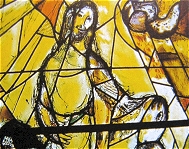
11.06.23 (Cheshvan 22, 5784) "Grass withers, a flower fades, but the word of our God will stand forever" (Isa. 40:8). This is a word of great hope. Despite experiencing exile and living in oppression, God speaks words of everlasting consolation: Nachamu, nachamu ammi: "Comfort, comfort my people..." (Isa. 40:1). There is a glorious future for you, even if your present circumstances seem overwhelming and your heart's cry seems unanswered. These were God's words of encouragement to the Jewish exiles that were carried away into Babylonian captivity. Despite the appearance of ruin, God promised to establish Zion as the praise of the earth.
God is the only enduring Reality in a constantly changing world, and He has designed it this way to cause our hearts to search for him. "All flesh is grass, and all its beauty is like the flower of the field" - such is the condition of this ephemeral world with its flux and fortunes. The flesh fades because the breath of the LORD blows upon it (Isa. 40:7). God Himself has ordained human life to be a vapor....
Nonetheless we are told not to fear, because there is good news for Zion: the LORD is coming with might to reward those who are waiting for him. He will tend his flock like a shepherd; he will gather his lambs and carry them close to his heart. As the apostle Peter said, this good news is the eternal life given through the imperishable "seed" - the Word of God that rises forever in Yeshua (1 Pet. 1:23-25).
The nations of this world are reckoned as less than nothing; their glory is "tohu" (תהוּ) - confusion and unreality - and their princes are regarded as utter vanity. "Scarcely are they planted and have taken root when He blows upon them and they wither to become dust carried off by the storming winds" (Isa. 40:24). The nations of the earth are dried grasses; the kings of the earth are withered flowers.
But God is incomparably great and will fulfill his promises to Israel: "The word of our God will stand forever." He created the heavens and calls each star by name. He is invincible in power and no one can overrule His will.
This world is not our home; we are "strangers" here. It is an affliction to wait for the LORD, a sort of "homesickness" of heart... The apostle Paul says our loneliness and alienation prepare for us an "eternal weight of glory" beyond all comparison, because we are not looking at what can be seen but at what cannot be seen. "For what can be seen is temporary, but what cannot be seen is eternal" (2 Cor. 4:17-18). Just as the "two-souled" man is unstable in all his ways, so the process of being "educated for eternity" means learning to focus our heart's passion and hope on the glory of heaven. "For where your treasure is, there will your heart be also."
Those who wait for the LORD inwardly groan to be clothed with immortality and eternal life, and their consolation is great indeed. Yeshua is "preparing a place for you," an everlasting place of refuge whose builder and maker is God (Heb. 11:10). Faith sees beyond the shadows of this world to behold your true home with your Heavenly Father.
Hebrew Lesson
Isaiah 40:8 reading (click):
The Life of Sarah... חיי שרה
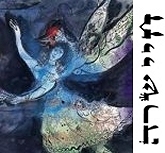
11.05.23 (Cheshvan 21, 5784) Our Torah reading last week (i.e., Vayera) told how God was faithful to Abraham and Sarah by miraculously giving them a son (Isaac) in their old age. Nonetheless, Abraham faced his greatest test of all by being asked to offer up his promised child as a sacrifice on Mount Moriah, the place of the future Temple. On account of his willingness to obey, God promised He would multiply Abraham's offspring as the stars of heaven and that in his seed (singular) all the nations of the earth would be blessed.
This week's Torah portion is called Chayei Sarah (חיי שרה), the "life of Sarah," though it begins (paradoxically) with the account of her death, and tells how the first great matriarch of the Jewish people was buried in the Cave of Machpelah in Hebron, a burial site which Abraham had purchased from Ephron the Hittite (Gen. 23:1-20). Since the account of Sarah's death is given just after the account of the near-sacrifice of Isaac (i.e., the Akedah), some of the sages link the events together, suggesting that the shock of the near loss of her beloved son at the hand of her husband was just too much for her to bear...
Hebrew Lesson
Genesis 23:1a Hebrew Reading (click):
After Sarah was buried in Hebron, Abraham sought a wife for his son by commissioning his faithful servant Eliezer (whom Abraham had once thought would be his heir), to go among his relatives living in Mesopotamia to seek a bride for Isaac. Eliezer (i.e., אֱלִיעֶזֶר, lit., "My God will help") then set out on the 550 mile journey to Haran (also called the City of Nahor and the place where Abraham's father died), taking ten camels laden with gifts in search of a suitable woman. In answer to his prayer, as soon as Eliezer reached the city of Nahor he encountered Abraham's grand niece Rebekah drawing water at a well, where she graciously provided water for him and for his ten camels, thereby confirming that she was God's choice for Isaac.
Torah of the Messiah...

11.05.23 (Cheshvan 21, 5784) C.S. Lewis once perceptively said, "Mental pain is less traumatic than physical pain, but it is more common, and also more hard to bear. The frequent attempt to conceal mental pain increases the burden: it is easier to say "My tooth is aching", than to say "My heart is broken." Mental pain is often regarded as "private language," and often we feel alone in our sufferings.
Many of us experience loneliness because we sometimes feel unseen, or unwanted, or we fear that revealing who we really are will make us look bad or be a burden to others... But you need to ask whether you regard the story of your life as worth telling? Have you learned to be a "good steward" of your pain?
Some people may feel apprehensive about revealing their woundedness to others because when they had ventured to open their hearts in the past they had been misunderstood, or people just tried to "fix" them. Instead of asking for answers, however, a hurting soul really needs just someone to be there to listen and to know who they are.
Brokenness should not be disdained, especially among the people of God. After all, Yeshua (and all of the Hebrew prophets) suffered, wept, and were broken. Of Yeshua it is said: "He is despised and rejected of men; a man of sorrows (אישׁ מַכְאֹבוֹת), and acquainted with grief: and we hid as it were our faces from him; he was despised, and we esteemed him not" (Isa. 53:3). Sadly, many may equate "brokenness" with mental illness or emotional disturbance (or worse), but that is not true. In fact, without brokenness, we cannot know our need for the Savior; and without loneliness, we cannot know Him as our only true healer in this life.
One of our greatest spiritual needs is a sense of acceptance. Every one of struggles with sin and anxiety. Do you ever feel ashamed or defective or unworthy? You are not alone. Do you sometimes feel lost or afraid? The Spirit of the LORD speaks to the broken of heart: al tirah ki imakha ani, "fear not, for I am with you" (Isa 40:10; Psalm 34:18).
May the LORD help us draw close to His heart for consolation in our troubles, as it is written: "Blessed be the God and Father of our Lord Yeshua the Messiah, the Father of mercies (אַב הָרַחֲמִים) and God of all comfort (אֱלֹהֵי כָּל־נֶחָמָה), who comforts us in all our afflictions, that we may be able to comfort those who are in afflicted, with the comfort with which we ourselves are comforted by God" (2 Cor. 1:3-4). May we learn to love Him "bekhol le'levavkah," with all our heart, that is, with all our "good heart" and all our troubled heart as well. In this way we will be able to bear the burdens of others and so "make complete" (ἀναπληρώσατε) the Torah of Messiah (Gal. 6:2). Amen.
Hebrew Lesson
Psalm 51:17 reading (click):
Walking by Faith...

[ Shabbat shalom and keep pressing on, friends! Hang on! Don't give up! The Day approaches! ]
11.03.23 (Cheshvan 19, 5784) Often the walk of faith is one of darkness. We wonder where we are. We wonder where God is. We pray. We struggle. We feel empty inside. We need to be careful here. Faith believes that God is the Center of our lives, regardless of how we may feel at the moment. God works in ways that we often cannot understand at the time. Like a sculpture that is unfinished, or a tapestry still being woven, we do not see the whole picture of our lives. It is vital, then, to trust that the Lord is leading the way, already present for us in the days ahead. He is on the other side of the next moment, calling us to look forward and to believe in the promise of his blessing and eternal life. "Who among you fears the LORD? Who obeys the voice of His Servant? Who walks in darkness and has no light? Let him trust in the name of the LORD and rely upon his God" (Isa. 50:10). Amen. "My flesh and my heart may fail, but God is the strength of my heart and my portion forever."
Hebrew Lesson
Psalm 73:26 reading (click):
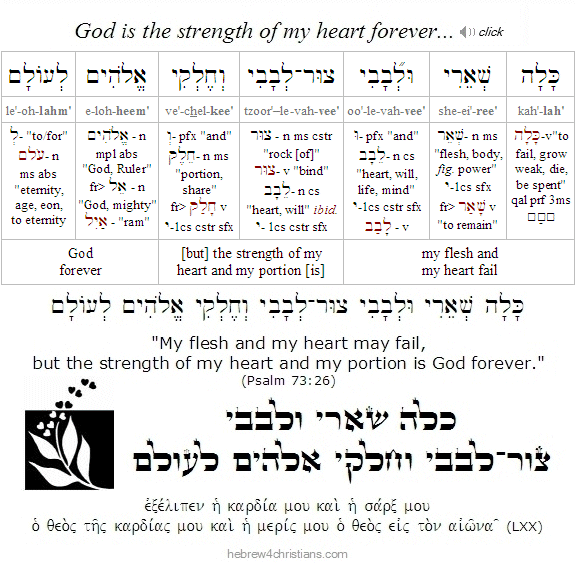 |
When Yeshua said, "Let not your heart be troubled... I go to prepare a place for you," he was assuring his friends that he had matters well under his control, and therefore they did not need to worry, since his passion rendered their salvation completely secure... The future is a "prepared place" for you, even if life in this world is often marked by testing and various refining fires. God has not promised to rescue us according to our own schedule, however, so if it appears that your prayers are not immediately answered, keep waiting in faith: "Rejoice, even if you have been grieved by various trials, because the tested genuineness of your faith -- more precious than gold that perishes though it is tested by fire -- may result in praise and glory and honor at the revelation of Yeshua the Messiah" (1 Pet. 1:6-7). God works "all things together for good," and since the exercise of faith is your good, he engineers all things to build your faith. "For my thoughts are not your thoughts, neither are your ways my ways, says the LORD" (Isa. 55:8).
Those who call upon the LORD can trust not only in concealed good behind ambiguous appearances ("all things work together for good") but also in a future, real, substantive good that will one day be clearly manifest for us all... We fight the "good fight" of faith, which is a worthy struggle that eventually is realized for blessing. Meanwhile, may the LORD our God keep us from such depth of sorrow that leads to sickness, darkness and despair. Faith sees the invisible light, the truth of love that overcomes all the powers of darkness, hate, and fear... Amen v'amen.
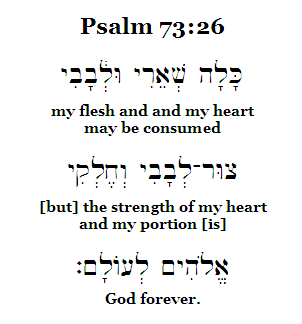 |
 |
The Sacrificed Seed...

[ Undoubtedly Abraham's most dramatic test revealed the heart of a father willing to give up his beloved son, and the heart of the beloved son willing to be sacrificed on behalf of his father's will... Together they walked on, united in resolve and one in their passion. ]
11.03.23 (Cheshvan 19, 5784) "And Abraham took the wood of the burnt offering and laid it on Isaac his son. And he took in his hand the fire and the knife. So they went both of them together" (Gen. 22:6). Isaac was about 37 years old at this time and needed to understand what was being asked of him: "And Isaac said to his father Abraham, "My father!" And he said, "Here am I, my son." And he said, "Behold, the fire and the wood, but where is the lamb for a burnt offering?" (Gen. 22:7). This is the first word of dialog recorded over the three day journey... It is hard to imagine Isaac's pathos during this exchange. Abraham replied, "God will provide for himself the lamb for a burnt offering, my son." So they went both of them together (Gen. 22:8). Notice that the Hebrew could be read: "God will provide for himself the lamb for the burnt offering -- my son!" (ירְאֶה־לּוֹ הַשֶּׂה לְעלָה בְּנִי) - making it plain that Isaac would be offered upon the altar. The Torah then repeats the phrase, "and they both walked on together," indicating that Isaac had accepted his sacrificial death in obedience to his father's will...
"And when they came to the place of which God had told him, Abraham built the altar there and laid the wood in order and bound Isaac his son (וַיַּעֲקד אֶת־יִצְחָק בְּנוֹ) and laid him on the altar, on top of the wood" (Gen. 22:9). According to the Talmud, Isaac asked his father to make the knots on his hands and feet tighter - not out of fear that he would change his mind and begin to resist - but in order to encourage his father to offer the sacrifice properly (Bereshit Rabbah 56:8). Like the Suffering Servant who would come after him, Isaac "set his face like a flint" to fulfill God's will (Isa. 50:7).
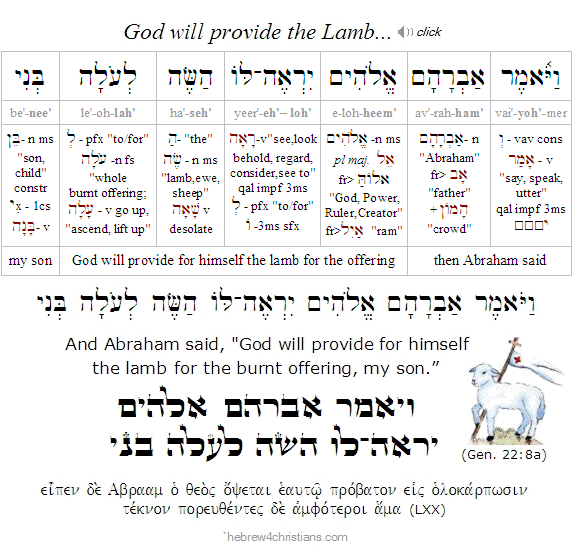 |
Isaac kept his eyes directed toward heaven as he lay tightly bound and motionless upon the altar. He awaited the final blow and wanted it to fall with trust and obedience within his heart. It was to be a shared sacrifice between the beloved son and his father. Finally "Abraham stretched out (שׁלח) his hand and took the knife to slaughter (i.e., לִשְׁחט, from shechitah) his son" (Gen. 22:10). The Talmud says that when Abraham "stretched out" his hand, he briefly looked at the knife to determine if it was ritually fit, and this delay was the precise moment when the Angel of the LORD (מַלְאַךְ יהוה) called out to him from heaven and said, "Abraham, Abraham!" (Gen. 22:11). (Note the repetition of the name "Abraham" during this second call.) According to various midrashim, when Abraham put his knife to his son's neck, Isaac's soul departed from him, but it returned when the Angel of the LORD said, "Do not lay your hand on the boy or do anything to him, for now I know that you fear God, seeing you have not withheld your son, your only son, from me" (Gen. 22:12). Abraham then immediately released Isaac and recited the blessing, "Blessed are You, LORD, who revives the dead" (בָּרוּךְ אַתָּה יהוה מְחַיֶּה הַמֵּתִים).
"I believe in You, O Holy One, though at times there no longer seems any reason for believing..." Here is Abraham, who counted the stars in hope, who trusted God for an heir, a promised son - and from this son another, and from that another, and another, until he envisioned his descendants "as the dust of earth" (Gen. 13:16; 15:5-6), and yet here is Abraham lifting up his knife to sacrifice his son, his beloved child, his promise, his future, his dream. Remember that Abraham did not know the end of the story before it began, and therefore his faith attested: "Though he slay me, I will trust in him."
Some people tend to "explain away" the passion of Abraham and Isaac by quoting the New Testament verse: "He [Abraham] considered that God was able even to raise him [Isaac] from the dead, from which, figuratively speaking, he did receive him back" (Heb. 11:19) -- as if this would make the sacrificial act any easier! Again we must bear in mind that neither Abraham nor Isaac knew "the end of the story" before they chose to obey God. As I've mentioned before, simply "knowing about" God is not the same thing as personally trusting Him with your life... This is the distinction between emunah (אֱמוּנָה) and bittachon (בִּטָּחוֹן). Simply knowing about God can lead to a sense of "distance," to theological abstractions, to dogmas and creedal formulas. Rabbi Bechaya put the distinction this way: "Everyone who trusts has faith, but not everyone with faith trusts." Bittachon is an intuitive awareness of the personal love of God for your life, coupled with complete trust that He cares for you (Rom. 8:28). It is an expectation that the love of God is for you, too, despite the test.
Note: For more on this crucial subject, see, "The Sacrificed Seed: Further thoughts about the Akedah," by clicking here.
Biblical Hebrew Wordplay...
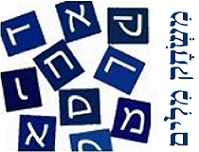
11.03.23 (Cheshvan 19, 5784) The Hebrew Scriptures are filled with various kinds of wordplay. In addition to some humorous play on words (i.e., puns), you will discover alliteration, acrostics, parables, similes, metaphors, theophorisms, hyperboles, gematria, and other literary devices present in the Hebrew text. Some scholars even suggest that the first two words of the Torah (i.e., בְּרֵאשִׁית בָּרָא / bereshit bara) were intentionally spelled using the same initial three letters (בּ.ר.א) for the sake of "alliteration" (i.e., repetition of sound). At any rate, examples of wordplay often appear on the surface-level of the texts. For example, "Adam" (אָדָם) is a play on the word adamah (אֲדָמָה, "ground"); Chavah (חַוָּה, "Eve") is a play on the word chai (חַי, "life"); Kayin (קַיִן, "Cain") is a play on the verb kanah (קָנָה, "to get"), and so on (see Gen. 2:7, 3:20, 4:1). Even the name "Jesus" (i.e., Yeshua: יֵשׁוּעַ) plays on the Hebrew word for deliverance or salvation (i.e., yeshuah: יְשׁוּעָה). Many other examples could be cited.
Of particular relevance to this week's Torah portion (Vayera) is the name Yitzchak (יִצְחָק, "Isaac"), which plays on the verb tzachak (צָחַק, "to laugh"). Some have said that tzachak is "onomatopoeic," that is, it imitates the sound of laughter itself. Appropriately enough, the root appears a number of times in the story of Isaac, though often with different connotations. The simple stem (kal) of tzachak conveys the idea of laughter, whether in joy or incredulity, though the stronger stem (piel) suggests more intense expressions, for example rejoicing, playing, and making love -- or (negatively) mocking, scorning, and deriding. In other words, the motive for laughter is only contextually understood. After all, there's a big difference between laughing at someone and laughing with them.
At any rate, God Himself named Isaac in response to Abram's laughter over the prospect of having a child in his old age. Here's some of the "back story." God originally called Abram to leave Ur of Mesopotamia for the land of Canaan (Gen. 12:1). When he arrived there, God appeared to him and promised that his descendants would inherit the land (Gen. 12:7). Abram was 75 years old at this time. Abram wandered through the land waiting for God's promise to be fulfilled. Some time later (but before the birth of Ishmael), God came to him in a vision and reaffirmed his promise that he would have a son "from his own loins" (Gen. 15:1-5). Abram "believed in the LORD, and He credited it to him as righteousness" (Gen. 15:6). The LORD then made the "covenant of the pieces" to seal the agreement to give the land of Canaan to Abram's descendants (Gen. 15:7-20). Ten more years passed, however, and Abram and Sarai were still childless. In a lapse of faith, Sarai urged Abram to sleep with her Egyptian maidservant, Hagar, in order to produce the family heir. Ishmael was born when Abram was 86 years old (Gen. 16:16).
Another thirteen years passed before God appeared to Abram to renew his earlier promise that he would become a "father of a multitude" (Gen. 15; 17:7). Abram was now 99 years old. To symbolize Abram's changed status, God changed his name from Avram ("exalted father" [from אָב, "father," + רָם, "exalted"]) to Avraham ("father of a multitude" [from אָב, "father" + המוֹן, "crowd"]). (Note that some scholars regard Avraham's name to mean "father of mercy" (from אָב, "father" + רחם, "womb"). Likewise God changed Sarah's name from Sarai (שָׂרַי, "princess") to Sarah (שָׂרָה) -- the exchanged Hey (ה) for the Yod (י) was given to indicate that the Divine Presence was to replace of the "hand" of Sarah's design. (Indeed, the root of Sarah's name (i.e., שׂר, "prince") later reappears when her grandson Jacob was renamed "Israel." The wordplay occurs in the phrase "for you have striven (sarita) as a prince (sar) with God and with men and have prevailed" (Gen 32:28)). God reaffirmed his promise to make Abram into a great nation and then gave him the commandment of brit millah (בְּרִית מִילָה, ritual circumcision) as a token or "sign" of the agreement. (There's another play on words here: Abraham's male descendants who refuse to "cut off" their foreskins would be "cut off" from the terms of the covenant).
Getting back to the wordplay on Isaac's name, when the LORD repeated his promise that Abraham would sire a son in his old age, he "threw himself on his face and laughed (וַיִּצְחָק) as he said to himself, "Can a child be born to a man a hundred years old, or can Sarah bear a child at ninety?" (Gen. 17:17). When Abraham attempted to recommend Ishmael as his heir, God said "No, but Sarah your wife shall bear you a son, and you shall call his name Yitzchak (יִצְחָק, "he laughs").... (Gen. 17:19). After this vision of the LORD, Abraham promptly circumcised himself along with his son Ishmael (Gen. 17:23-26).
Rashi says it was the third day after Abraham's circumcision when he was visited by the Angel of the LORD (מַלְאַךְ יהוה) accompanied with the two other angels. When Sarah overheard the Angel of the LORD say, "I will certainly return to you next year, and your wife Sarah shall have a son" (Gen. 18:10), she laughed (וַתִּצְחַק) within herself (lit, "at her insides") and thought, "Now that I am withered, am I to have enjoyment, my husband being so old?" (Gen. 18:12). The LORD (יהוה) then asked, "Why did Sarah laugh (צָחֲקָה)? Sarah denied it (לא צָחַקְתִּי, "I didn't laugh"), but the Angel of the LORD said, "No, but you did laugh" (לא כִּי צָחָקְתְּ).
Jewish tradition maintains that Abraham laughed in joy at the prospect of becoming a father, whereas Sarah (initially) shook her head in disbelief. Sarah underwent teshuvah, however, even before her conception (see Heb. 11:11), and after the miraculous birth of her son exclaimed in heartfelt joy: "God has made laughter (צְחק) for me; everyone who hears will laugh for me (יִצְחַק־לִי)" (Gen. 21:6).
After Isaac was weaned, however, Abraham held a celebration, but Sarah saw Ishmael mocking (מְצַחֵק, i.e., the piel participle of צָחַק, "to laugh") her son and demanded that he be sent away. This grieved Abraham greatly, but God reassured him that Ishmael would nevertheless become a great nation with numerous descendants (Gen. 21:11-13). The promise of being Abraham's heir belonged to Isaac alone, who was the miraculously given son that would bring laughter to the hearts of all those who believe...
A further example of wordplay on the name "Isaac" occurs when the Torah records how he fled to the Philistine city of Gerar to escape a famine in the land. Like his father Abraham, Isaac lied by telling people that his wife Rebekah was his "sister." The Torah records that his deception was detected when Abimelech saw him "playing" with Rebekah: יִצְחָק מְצַחֵק אֵת רִבְקָה אִשְׁתּוֹ / "Isaac was 'sporting' with his wife Rebekah" (Gen. 26:8). The verb translated "sporting" is the intensive (piel) form of tzachak (צָחַק, "to laugh"), and clearly suggests the idea of caressing and fondling -- i.e., making love.
Hebrew wordplay was also applied to Isaac's sons. When the twins were born, the first came out hairy and was named Esau (עֵשָׂו), perhaps from the word esev (עֵשֶׂב), "grass" or "weed" of the field), whereas the second came out with his hand on his brother's heel, and was named Ya'akov (יַעֲקב, "grappler," from the word עָקֵב, "heel"). Later, when Esau learned that Jacob had taken away his blessing, he exclaimed, "Is he not rightly named "heel holder" (i.e., יַעֲקב)? For he has taken me by the heel (יַּעְקְבֵנִי) these two times. He took away my birthright, and behold, now he has taken away my blessing" (Gen. 27:36).
Hebrew Lesson
Isaiah 7:9b reading (click):
Truth of the Inward Being...
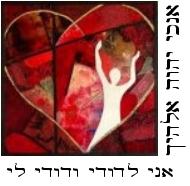
11.02.23 (Cheshvan 18, 5784) It is written in our Scriptures: "As a man thinks in his heart, so is he" (כִּי כְּמוֹ־שָׁעַר בְּנַפְשׁוֹ כֶּן־הוּא). We often see what we want to see more than what is really there. That's called wishful thinking. We overlook much, and we often ignore what might challenge our own preferred interpretations. For example, we may think that we are trusting God for our lives, but we worry, we attempt to control others, we get angry, and so on. We have a blind spot regarding the question whether we really trust God, perhaps because seriously investigating what we really believe seems too threatening (John 16:31-32). After all, what if we don't really know what to believe? What if we struggle to believe? What if we are confused? What does that say about who we are? So we ignore the real problem (namely, our lack of truth and our little faith in God) and continue to think we are something we are not. We fool ourselves and trade a sense of "satisfaction" at the expense of truth. This is a common failing of human nature. During the Nazi years, many ordinary Germans refused to investigate reports of atrocities at the death camps because it was too costly to discover the truth (the same might be said about various "community activists" who rationalize their actions of regardless of the moral issues involved). By willfully hiding from the facts, people pretend they are not responsible, and therefore they readily justify passivity in the face of injustice and evil.
Yeshua warned that the time would come when those who kill others will delude themselves into thinking they are doing God a favor (John 16:2). Think of how massively self-deceived such a thing is as that -- to murder someone as a so-called service to God! Many of the biggest enemies of the truth are often those who think they are doing God such favors.
Hebrew Lesson
Psalm 51:6 reading (click):
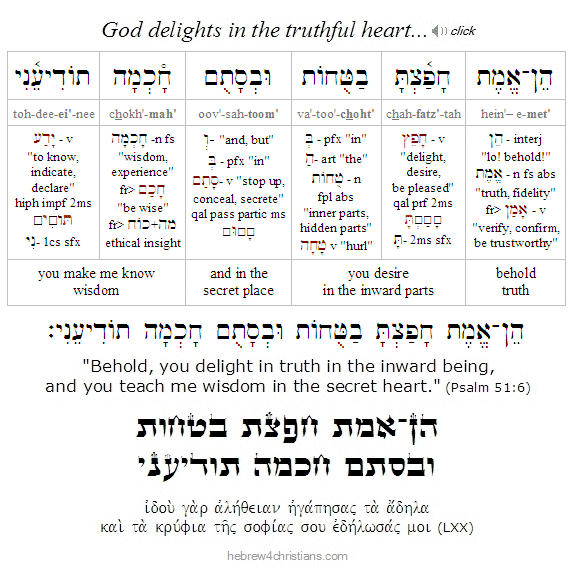 |
Often, however, the truth "of the inward being" must come at the expense of heartache, for surely the heart must ache, tremble, and despair before it comes to accept the truth about its condition. This sort of truth is "existential," meaning that it is known only through the process of living life itself. As Kierkegaard said, "There are many people who reach their conclusions about life like schoolboys: they cheat their master by copying the answer out of a book without having worked the sum out for themselves." Yes, and they cheat themselves, too, since they somehow believe that "knowing the answer" given by another is the same thing as "knowing the answer" of their own inward being... Kierkegaard continues this thought: "The truth is lived before it is understood. It must be fought for, tested, and appropriated. Truth is the way... you must be tried, do battle, and suffer if you are to acquire truth for yourself. It is a sheer illusion to think that in relation to truth there is an abridgment, a short cut that dispenses with the necessity of struggling for it."
A man who was afflicted with a terrible disease complained to Rabbi Israel that his suffering interfered with his learning and praying. The rabbi put his hand on his shoulder and said, "How do you know, friend, what is more pleasing to God - your studying or your suffering?" (Buber: Hasidim).
Note that the "inward being" (טֻחוֹת) refers to the "kidneys" which were thought to be "the reins" or the concealed (i.e., te'ach: טִיחַ) source of the will within the person. Interestingly, the word te'ach comes from the verb tachah (טָחָה) that means to "shoot with a bow," alluding to the idea of inner Torah as a directive power. God wants purity of the heart – passion, singleheartedness, and earnestness – as we live and practice the truth. God wants "the inner parts," the concealed parts of the soul, to be filled with his Torah, and therefore David asks God to make him to know wisdom there - in the "secret heart" - so that he might apprehend God's truth and do teshuvah that purifies the heart.
Blessings of Hebrew...
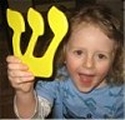
11.02.23 (Cheshvan 18, 5784) Frederick Buechner once challenged his readers to take any English word and to repeat it twenty times, over and over. By the time they were finished, he said, it would be likely that the word will have lost its meaning and simply become a absurd noise. He then went on to say that many words of the Christian faith, even the most meaningful words of great significance, have been so repeated over the last two thousand years that they, too seem to have lost their meaning.
Words like "faith," "sin," "redemption," and so on all have been assimilated by the world and their meaning has been vitiated, much like the symbol of the cross that has grossly "transmogrified" into a piece of costume jewelry. Words that once so moved men and women that the world was turned upside because of their radical significance now are regarded as banalities and platitudes, if they are heeded at all.
This is why, I believe, studying biblical Hebrew (and Greek) can be helpful, since doing so forces us to retool our lexicon in order to translate the meaning of Scripture in relevant ways. A pop song may gush about "faith" or "love," but understanding the Hebrew meaning of emunah (אֱמוּנָה) and ahavah (אהבה) can enable us to escape the mass-produced language of our age. Or consider various Hebrew words for "sin" (e.g. chatat, pesha, avon, asham, etc.) or the words for "law" (e.g., Torah, mishpatim, chukim, eidut, etc.), each of which has subtleties of meaning lost in modern translations. So study some Hebrew, even if you are just beginning. Doing so will force you to slow down and think about the original meaning of many Biblical words we often unthinkingly use when we think about God.
Hebrew Lesson
Jeremiah 33:3 reading (click):
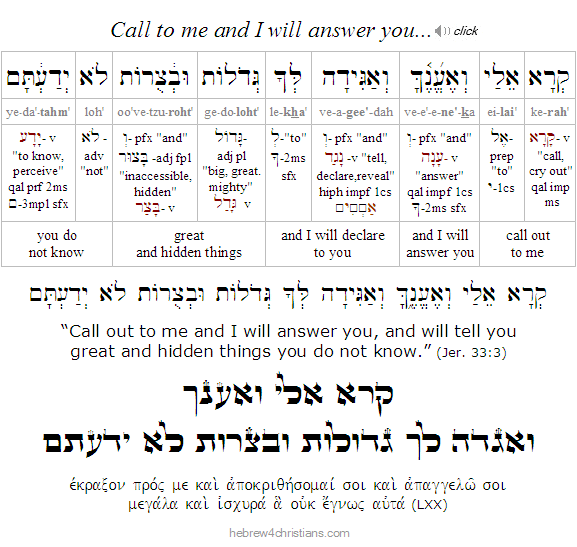 |
God's Sovereign Love...
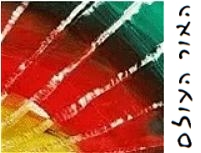
11.02.23 (Cheshvan 18, 5784) The Scriptures teach that in Messiah "we have obtained an inheritance, having been predestined (προορισθέντες) according to the purpose of the One who works all things according to the counsel of his will" (Eph. 1:11), which is to say that salvation is a gift from God (יְשׁוּעָתָה לַיהוָה) and not the result of our own efforts (Eph. 2:8-9; 2 Tim. 1:9; Titus 3:5). The LORD said to Moses, "I will be gracious to whom I will be gracious, and I will show mercy to whom I will show mercy" (Exod. 33:19), a phrase the Apostle Paul quoted from Torah when he said: "So then it (i.e., salvation) depends not on human will or exertion, but on God, who has mercy" (Rom. 9:16, John 1:13). In light of these things, examine your heart. Does this offend you? Does it bother you to think that you are essentially helpless to draw near to God by your own best efforts? "It is the Spirit that gives life; the flesh profits nothing" (John 6:63). Our Lord said that no one can come to Him - and therefore to the truth of reality – apart from divine intervention: "No one is able to come to me unless he is "dragged away" (ἑλκύσῃ) by the Father" (John 6:44; Matt. 16:17).
How could it be any other way? Could we make a "stairway to heaven" to find God? No, God's love reaches out to us, seizes us, takes us captive, and then leads us to the Savior. The LORD chooses each one who are his; they are called the "elect" (ἐκλεκτός), and their faith is always a response (i.e., "teshuvah") to God's intervention. Now this may seem offensive because it seems to suggest that God chooses some people but not others, but that misses the point. You are given the real choice to believe in Yeshua to find life, and you are promised that whoever believes in Messiah will never be put to shame (Rom. 9:33; John 6:37; John 5:24, etc.). "Whoever will believe" means just that, and all who are invited may indeed come (2 Pet. 3:9; 1 Tim. 2:4; Ezek. 18:23). Therefore the Spirit of God cries out: "Seek the LORD while he may be found; call upon him while he is near; let the wicked forsake his way, and the unrighteous man his thoughts; let him return to the LORD, that he may have compassion on him, and to our God, for he will abundantly pardon" (Isa. 55:6-7).
Our great Savior calls out to all who are willing to hear, "Come to me, all who labor and are heavy laden, and I will give you rest. Take my yoke upon you, and learn from me, for I am gentle and lowly in heart, and you will find rest for your souls. For my yoke is easy, and my burden is light" (Matt. 10:28-30). Though it is a mystery, we are warned to "work out" (κατεργάζεσθε) our own salvation with fear and trembling, for it is God who "works in you" (ὁ ἐνεργῶν ἐν ὑμῖν) both "to will and to work" (τὸ θέλειν καὶ τὸ ἐνεργεῖν) his good pleasure" (Phil. 2:12-13).
Hebrew Lesson
Exodus 33:19b Hebrew reading:
The gospel is "the power of God for salvation" (δύναμις γὰρ θεοῦ ἐστιν εἰς σωτηρίαν) to everyone who believes, to the Jew first and also to the Greek" (Rom. 1:16). It is a miracle of being in a right relationship with God. We are pursued by his love, and he haunts us until we surrender to his will... During the High Holidays we read from the Book of Jonah, which is appropriate because like Jonah, we first must be "swallowed up" in the consciousness of our own helplessness before we realize we are undone, and that we are without remedy apart from God's gracious intervention and deliverance. We start there - in the "belly of the fish" - and later we are resurrected to go forth by God's mercy and grace. As we look to Yeshua, as we lean on him, God reveals more of himself to us. He gives us the grace and strength we need; he is always enough...
Secret Place of the Most High...

11.02.23 (Cheshvan 18, 5784) Shalom chaverim. One of the great Hebrew names of God is El Elyon (אֵל עֶלְיוֹן), often translated as God "Most High." The name first appears in the Torah regarding the mysterious figure of Malki-Tzedek (מַלְכִּי־צֶדֶק), the timeless king and priest of Zion who served "bread and wine" to our father Abraham – alluding to the sacraments later used to commemorate our redemption (Gen. 14:18). As the timeless king and priest of God, Malki-Tzedek is a "theophany," or a revelation of the LORD our God before He emptied Himself and made his descent to this world (Phil. 2:7; Heb. 7:3). Yeshua is our great King of Kings and High Priest of the New Covenant, a better covenant that restores the kingship and priesthood back to God Himself (Jer. 31:31-33; Heb. 7:12; Heb. 8:6).
Now the name "Elyon" itself (עֶלְיוֹן) comes from a root word (עָלָה) that means "to ascend." The "olah offering" (עלָה), for example, is a whole burnt offering that ascends upward to heaven, and "aliyah" (עֲלִיָּה) means "going up" to the land of Israel. The word "Elyon," then, expresses the truth that the LORD God is the Resurrected and Ascended One who overcame all the powers of hell and utterly vanquished death's power. In other words, Elyon is a name for the LORD our God Yeshua himself.
The sages say that Moses wrote Psalm 91 as he dwelt in the secret place (סֵתֶר) of the Most High God, in the "midst of the dark cloud" (Exod. 24:18), a place of sacred and holy concealment. The thick clouds are a "hiding place" for him (Job 22:14). Notice that the one who "abides" in the secret of the Most High will dwell in an ascended place of rest – being lifted up above the surrounding darkness of this fallen world of flux and shadows. The Hebrew word means to lodge or to "sleep" (לִין), connecting it with death and resurrection. By "dwelling in the resurrection life" of Yeshua, God will shield you with His Presence and make evil powerless before you.
Since God hides Himself in this world (Isa. 45:15), we must humbly seek His face to enter into the place of His holy concealment in all things. God is Elyon – High above - but He dwells "with the lowly and the broken of heart" (Isa. 57:15). Therefore the LORD our God is called Shaddai (שַׁדַּי) – our Sustainer, Provider, Refuge, and Home. Just as we can be surrounded by the "shadow of death" (tzal mavet), so we can be surrounded by the "shadow of Shaddai" (tzal Shaddai). Like a powerful eagle brooding over her chicks, so Shaddai covers you with wings of protection (Psalm 91:4). Being "under the shadow of Shaddai" (בְּצֵל שַׁדַּי) therefore means being under the protection of God's Presence.
When you "abide" in the secret of Elyon - the Ascended One - you are concealed by the dark clouds of His Glory, and the Presence of Shaddai overshadows you... The LORD will save you from the ensnaring trap and from the devastating pestilence (Psalm 91:3). By abiding in the truth that God's Presence pervades all things at all times - you become a "stranger" (גֵּר) with the LORD in this world, a "sojourner" (תּוֹשָׁב) who awaits the recompense of the wicked and the healing of the world at the end of the age. "You will tread on the lion and the adder; the young lion and the serpent you will trample underfoot" (Psalm 91:13).
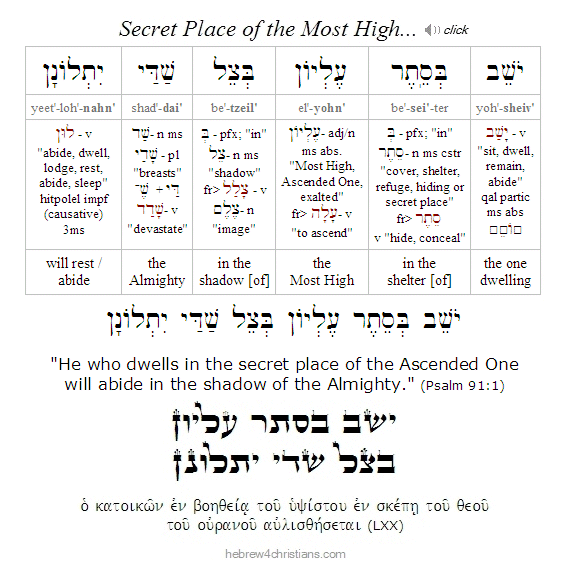 |
There is a "secret door" that you can enter at any time... This door leads to the realm of the Divine Presence, as David said: shiviti (שִׁוִּיתִי) - "I have set the LORD always before me - because He is at my right hand, I shall not be shaken" (Psalm 16:8). Amen. But how was King David able to "set the LORD" before Him if He did not "enter the door" by opening his eyes to behold God's hidden Glory? This is a matter of the heart's focus; it is faith...
At any given moment of our day, regardless of our circumstances, we can attune ourselves to the reality of the Divine Presence and therefore come "boldly before the Throne of Grace." The world knows nothing of this realm and is enslaved by appearances and the delusions of this realm, olam hazeh. As Yeshua said, "To you it has been given to know the secrets of the kingdom of heaven, but to them it has not been given" (Matt. 13:11). The Spirit always says, "Come, my people, enter your chambers, and shut your doors behind you" (Isa. 26:20). In the secret places of our heart - our "prayer closet" - we appeal to the Hidden Presence to be manifest in the midst of every circumstance of our lives. Our Heavenly Father sees in secret; he knows the groaning of our hearts (Matt. 6:6; 2 Cor. 5:4; Rom. 8:22-23). .
We are made secure only on account of the LORD our God Yeshua, who gloriously ascended over the powers of this age, the hidden principalities of darkness, and who made safe passage for us to come by means of his sacrificial death on the cross. Yeshua is the Bridge and the Way to the truth that sets you free, though He indeed is the narrow bridge. Because of Him alone, we have access to the Divine Presence, the Holy of Holies made without human hands. Yeshua is the Ascended LORD of Glory, the Master of all possible worlds, and the King over all things. Nothing can stop Him or thwart His victory secured for those who trust in Him.
"Now unto Him that is able to keep you from falling, and to present you faultless before His Presence with exceeding joy - to the only True God and our Savior - be glory and majesty, dominion and power, both now and forever. Amen" (Jude 1:24-25).
Blessed is the Name of the LORD.
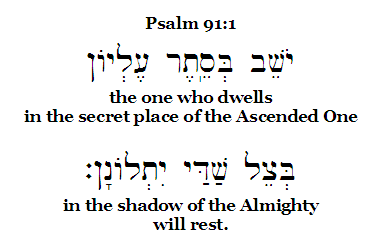 |
 |
Joy in the Valley...
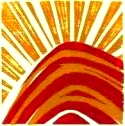
11.01.23 (Cheshvan 17, 5784) We all need encouragement to face these difficult days... We all need "simchah" (שִׂמְחָה), that is an inner happiness or joy that comes from knowing the truth about God. Being joyful is a matter of faith for us: we must choose to believe in it and exercise emunah (אֱמוּנָה). So essential is this sense of joy that the sages have said that without it we cannot truly do teshuvah, since the goal or end of our repentance is healing and blessing and love from heaven. Yes, there is godly sorrow, but nevertheless we rejoice (שָׂמֵחַ) because the LORD God is faithful to his promises (John 14:1-3; Deut. 7:9). If you believe that, really believe that, you will experience joy, regardless of your present circumstances....
Note that the letters of the word "with joy" (בְּשִׂמְחָה) can also spell the word "thought" (מַחֲשָׁבָה), indicating a connection between the inner life of our thoughts and our joy and well-being. Happiness or joy comes from being conscious of reality – understanding the truth – and trusting in God's love regardless of our circumstances. Gratitude is the product of joy (χαρα) obtained from the gift of being conscious of God's grace (χαρις). "Faith, hope, love: these three..." As it is written in the prophets: "For you shall go out [from your misery, your bondage, etc.] with joy (בּשִׂמְחָה), and you shall be led forth with peace" (Isa. 55:12).
Our struggles are used by God to lead us to higher ground: yeridah le'tzorich aliyah (ירידה לצורך עלייה): "Descent is for the purpose of ascent." Therefore do we die daily (καθ᾽ ἡμέραν ἀποθνῄσκω). As Yeshua taught us: "Truly, truly, I say to you, unless a grain of wheat falls into the earth and dies, it remains alone; but if it dies, it bears much fruit" (John 12:24), which means a higher realm of existence breaks forth from the extinction of the lower form that preceded it. It's by means of his being the Seed that died that we are then taken up into the bloom and life and being of His resurrection power. The life of Messiah triumphs over death, and we share in that life as we walk in the truth of his love for us. It is a mitzvah to always think the best, to trust that God works all things together for good as we make our pilgrimage through this life (Rom. 8:28). Dear friends, for the sake of your joy and strength, "think on these things" (Phil. 4:8). Amen.
Hebrew Lesson
Psalm 59:17 reading (click for audio):
Love's Promised Healing...
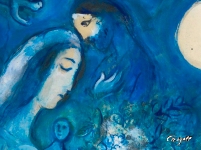
[ "God creates out of nothing. Therefore, until a man is nothing, God can make nothing out of him." - Martin Luther ]
11.01.23 (Cheshvan 17, 5784) In his famous "Sermon on the Mount," Yeshua revealed the inner condition of the heart, despite the various pretenses that people may contrive to evade the truth.... "You have heard that it was said, "Do no murder," but I say to you, harbor no anger; you have heard "do no adultery," but I say to you harbor no lust..." You have heard it said, "Do not break an oath," but I say to you swear no oath at all, but let your word be enough. Yeshua brings the Torah inside, to the heart, to reveal our great need. A person who makes an oath assumes he can keep the law, that he can control the impulses and sickness of his own deceptive heart. That is the source of the problem (Jer. 17:9; Eccl. 9:3; Mark 7:21). The Lord reveals what we are inside so that we may realize our need for deliverance from ourselves. What we really need is a miracle on the order of splitting the sea or raising the dead, namely, a new heart (לֵב חָדָשׁ) and a new spirit (רוּחַ חֲדָשָׁה) put within us. For those who might struggle with pride, fear, anger, lust, and hardness of heart, please take hold of hope. God can turn "stone to flesh" and make you fully alive by His power.
Hebrew Lesson
Jeremiah 24:7a reading (click for audio):
The heart (lev) is the inner person, the seat of the emotions, thought, and will. A new heart (lev chadash) represents the transformation of the whole of your inner nature - with the impartation of new appetites, new passions, new desires, etc. (Psalm 51:10). A new spirit (ruach chadashah) implies the renewal of your inner life – the rebirth of your will. This is the "law of the Spirit" (תוֹרַת רוּחַ הַחַיִּים) and the new principle of eternal life (Rom. 8:2).
The "stony heart" (lev ha'even) represents unfeeling, self-serving numbness of being. This heart is the locus of yetzer hara, the inner selfish impulse that is the common heritage of the "natural man." The Targum renders this as, "I will break the heart of the wicked, which is hard as a stone.'' A hard heart has a form of "sclerosis" that makes it closed off and impermeable to love from others, and especially from God. Scripture uses various images to picture this condition, including a "heart of stone" (Ezek. 36:26, Zech. 7:12), an "uncircumcised heart" (Jer. 9:26), a "stiff neck" (Deut. 31:27), and so on. Stubbornness is really a form of idolatry, an exaltation of self-will that refuses to surrender to God.
The heart of flesh (lev basar) represents an inner life of genuine feeling and joy that makes a fit habitation for the radiance of the Divine Presence. After all, the word for "grace" (χάρις) is directly linked to the word for "joy" (χαρά). This heart is soft and tender - a spiritual and sanctified heart - that is submissive to the will of God. It is upon the inner "tablets" of this heart that the Torah of God truly written (Jer. 31:33).
There aren't two gospel messages: one for the sinner and the other for the saint... The message of the gospel is always "good news" for those who are sin-sick and riddled with guilt and shame, and it is always "bad news" for those who deny their inner condition before God and believe that they can justify themselves. In other words, there's no "gospel" message apart from the message of the cross of Yeshua, and the cross represents the end of the ego and its devices. We don't get saved in order to follow the path of self-righteousness; we get saved to be witnesses of God's righteousness (Rom. 1:16-17). We love God because He first loved us (1 John 4:19).
May it please God to give us all soft hearts and renewed spirits that are empowered to love in the truth and to walk before His Presence... May He perform a divine "heart transplant" so that we may feel the heartbeat of the Spirit within us. Amen.
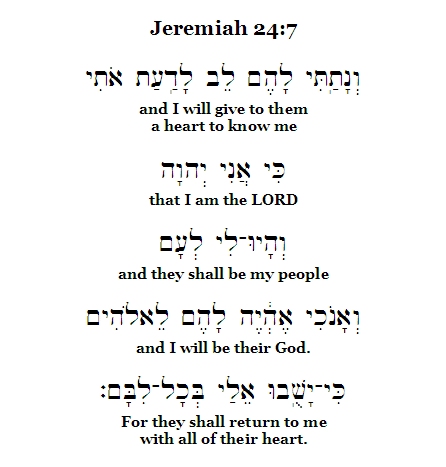 |
 |
|

























